NCURA MAGAZINE









Research Administration in a New World: Onboarding in a Hybrid or Remote Environment By Kayla Burgess, Savannah Rivera, and Robyn Remotigue 4
Building a Framework of Community of Practice: How Research Administrators Engage a Collective, Ongoing, Anonymous Learning Process to Sustain the Research Enterprise By Anna Frost 9
Leading by Example in Research Administration By Vivian Thomas McClain 12 An Integrative Coaching Approach for Modern Managers By Lisa Kim
Empowering Research: NCURA’s Collaborative Path to Advancement By Cerrone Bell and Rashonda Harris 19
A Collective Path to Compliance Excellence By Kairi D. Williams 23
Bridging Expertise: Collaboration in Research Contract Negotiations By Stephanie Alfieri, Charles Bartunek, and Jill A. Frankenfield 27


Find NCURA on your favorite social media sites!
Inclusion Initiatives: All of Us—Finding Solutions Together By Laneika K. Musalini and Carpantato ‘Tanta’
Administration in Europe: Navigating the Complex Waters of Private Foundation Funding— A Case Study from KU Leuven Research & Development
Self Care for the Research Administrator: Building a Research Administration Career—Professional Development is Good for “All of Us” By Manouchka Jean-Gilles 36
RAAAP Interviews—How I Became a Research Manager and Administrator By Melinda Fischer, Simon Kerridge, Madhuri Dutta, and Cristina Oliveira 39
Research Administration in Africa: Research Administration—A Terra Nullius
Baylor College of Medicine All of Us Evenings with Genetics Research Program & The Other Transactions (OTs)
Innovation: How Deloitte and Washington State University Partnered to Create a Strategic Grant Forecasting Solution Powered by Workday Adaptive Planning

IN THIS ISSUE: Success in managing research depends on research communities working together with their partners. They change and improve research organizations. Their involvement, participation, and contributions keep research programs lively. Together, they help research institutions thrive worldwide.
“My knowing is your knowing is our knowing.” As so eloquently written in Anna Frost’s article “Building a Framework of Community of Practice: How Research Administrators Engage a Collective, Ongoing, Anonymous Learning Process to Sustain the Research Enterprise.” It is well known that contributions strengthen educational offerings and nurture a culture of continuous improvement. “This commitment of excellence and adaptability is central to NCURA’s role as a leading resource in research administration.’’ as noted by Cerrone Bell and Rashonda Harris in their article “Empowering Research: NCURA’s Collaborative Path to Advancement.”
Stephanie Alfieri, Charles Bartunek, and Jill A. Frankenfield collaborated on the article, “Bridging Expertise: Collaboration in Research Contract Negotiations.” They understand that “Research administrators must work within their professional network of legal counsel, financial experts, compliance officers, and principal investigators to ensure that the terms of the relevant agreement are consistent with institutional parameters.”
Olive Giovannetti, author of “A World of Opportunities: How NCURA Expanded My Professional and Personal Horizon,” is sharing her career journey, and Helen Brazier-Mitouart, Abby Guillory, and Emily Devereux wrote a Training Tips article on the “Four Key Benefits of Education and Training of All.” Their engagement and active participation strengthen our research communities and global partners, supporting ‘all of us.’ N

Tolise Dailey, CRA, is a Co-Editor for NCURA Magazine and serves as Training and Education Development, Georgetown University School of Medicine. She has 30 years of research administration experience. Tolise also currently serves as a Traveling Workshop Faculty for Level II: Sponsored Projects Administration. She has been recognized as an NCURA Distinguished Educator for her outstanding contributions. Tolise can be reached at tcm9@georgetown.edu.
SENIOR EDITOR
Tanta Myles
Georgia Tech
CO-EDITORS
Tolise Dailey
Georgetown University School of Medicine
Kathleen Halley-Octa
Attain Partners
Martin Williams
Vaughn College of Aeronautics and Technology
CONTRIBUTING EDITORS
Career Development
Lamar Ogelsby
Rutgers University
Robyn Remotigue
University of North Texas HSC at Fort Worth
Clinical/Medical
Christina Stanger
MedStar Health Research Institute
Collaborators
Anthony Beckman
University of Rochester
Lisa Mosley
Yale University
Compliance
Jeff Seo
Northeastern University
Stacy Pritt
Texas A&M University System
Contracting
Theresa Caban
University of Southern California
Beth Kingsley
Yale University
Departmental Research Administration
Kelly Andringa
University of Iowa College of Medicine
Jennifer Cory
Stanford University
Diversity, Equity, & Inclusion
Sheleza Mohamed
American Heart Association
Laneika Musalini
Metropolitan State University of Denver
Financial Research Administration
Erin Bailey
University at Buffalo Clinical and Translational Science Institute
Brian Miller
Emory University
Global - Africa
Josephine Amuron
African Center for Global Health and Social Transformation
Global - Asia Pacific
Lisa Kennedy
University of Queensland
Global - Europe
Interested in contributing an article?
Visit www.ncura.edu/PublicationsStore/ NCURAMagazine/Submissions.aspx
Joey Gaynor
Trinity College Dublin
Kirsi Reyes-Anastacio
University of Helsinki
EXECUTIVE EDITOR
Marc Schiffman
NCURA
COPY EDITORS
Beth Jager
Claremont McKenna College
Jeanne Kisacky
Cornell University
Paulo Loonin
Duke University School of Medicine
Robin Ruetenik
University of Iowa
Global - Middle East
Reem Younis
United Arab Emirates Ministry of Education
Global - U.S.
MC Gaisbauer
University of California-San Francisco
Christopher Medalis
School for International Training
Pre-Award
Wendy Powers
University of Maine
Trisha Southergill
Colorado State University
Predominantly Undergraduate Institutions
Magui Cardona
University of Baltimore
Michelle Gooding
Barry University
Research Development
Camille Coley
University of San Francisco
Self-Care
Rashonda Harris
Johns Hopkins University
Kim Moreland
University of Wisconsin - Madison
Senior Administrator
Lisa Nichols
University of Notre Dame
Lindsey Spangler
Duke University School of Medicine
Spotlight on Research
Derek Brown
Stanford University
Systems/Data/Intelligence
Thomas Spencer
University of Texas Rio Grande Valley
Dan Harmon
University of Illinois Urbana-Champaign
Training Tips
Helene Brazier-Mitouart
Weill Cornell Medicine
Work Smart
Hagan Walker
Prisma Health
Young Professionals
Carol Bitzinger
Ohio State University
Katie Gomez Freeman
Southern Utah University

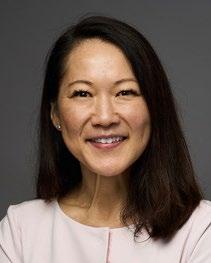
By Denise Moody, NCURA President
Happy new year! I am deeply honored to serve as this year’s NCURA President and build upon the excellent achievements of NCURA’s Immediate Past President, Dr. Kris Monahan. NCURA’s Magazine editors selected the perfect theme All of Us to begin the year. Throughout my research administration career, I have continued to say “It takes a village” to describe how critical our collaborations help us manage and sustain in the research administration profession. NCURA’s village includes over 9,000 individual members from over 1,100 colleges, universities, teaching hospitals, and research institutes in 40 countries. NCURA would not exist without All of Us, including our exceptional professional staff and thousands of volunteers at the regional and national levels.
In the March/April 2022 NCURA Magazine, I co-authored an article with Dr. Sherilyn Sawyer about the National Institutes of Health’s ambitious All of Us Research Program (https://allofus.nih.gov/). We recognized that “Ultimately, to achieve successful collaboration, team members must want to collaborate…Establishing time at work for open conversation, personal connections within the team, and humor makes collaboration an enjoyable experience and ultimately increases team satisfaction and reduces burn-out.”
NCURA’s Board of Directors remains committed to NCURA’s mission and purpose and core values and will begin the year reviewing our strategic plan and envisioned future of the organization. Areas of continued focus will include ensuring our members have a diverse and accessible range of professional development opportunities, developing multiple pathways into the profession, remaining flexible and proactive during changes in the regulations and research climate, and building institutional and global connections.
The 2025 year will also be focused on member engagement. During the 2024 year, many of NCURA’s key stakeholders, including regional and national leadership and the Young Professionals Council, provided feedback on the most valuable benefits of NCURA regions, current challenges regions face, and how members find community within NCURA. NCURA will collaborate closely with regional leaders to ensure regional leaders
have the support they need and plans to host a regional leader forum as follow-up to the 2023 forum which was very well-received by all attendees.
“NCURA would not exist without All of Us, including our exceptional professional staff and thousands of volunteers…”
Registration is available for our upcoming Financial Research Administration (FRA) and Pre-Award Research Administration (PRA) conferences to be held in sunny San Diego, CA (FRA: March 17th – 18th and PRA: March 20th – 21st, with a joint workshop day on March 19th). The co-chairs for both conferences have been working diligently with their program committees to guarantee excellent professional development opportunities and networking with colleagues and friends. I hope to see All of Us there! N
Most Sincerely,



By Kayla Burgess, Savannah Rivera, and Robyn Remotigue
earning a new job is hard in the best of circumstances. Onboarding remotely or in a hybrid environment, although becoming more common in recent years, is still a very tall order. It is important to have robust training and a network in place to help new employees feel supported and become dedicated to the goals of the organization, which in turn leads to exemplary support for investigators.
In our experience, learning how to juggle and prioritize tasks in research administration, especially in a hybrid environment can be extremely
difficult; this is especially true in a position that manages grants from cradle to grave such as submitting pre-award applications while simultaneously reviewing post-award travel expense reports. During training sessions, it is helpful to explain how to manage the ever-growing to-do lists so that the proper tasks can be prioritized. It’s imperative as a trainer to outline all duties and emphasize how to differentiate what to handle first. Typically, pre-award applications take precedent, with set deadlines, and effort reporting/expense reports, while equally important, are less urgent. There are several common challenges new employees face when working remotely. They must learn how to prioritize their new tasks based
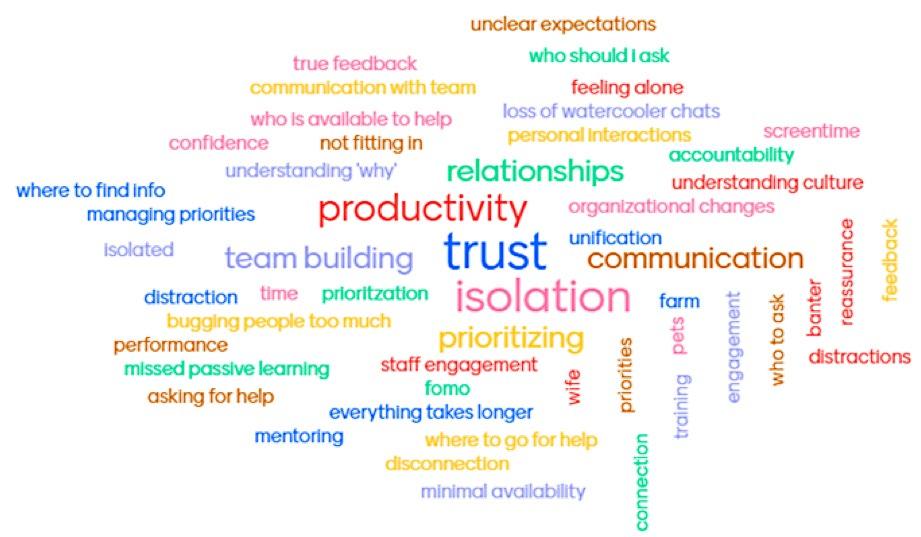
on urgency. What must be done now, and what can wait? In a new role, this can feel overwhelming. Remote employees must also learn a different style of communication to help them express what they need in order for them to be successful. An overwhelming majority of communication is non-verbal. Losing the ability to observe body language and sometimes even someone’s tone of voice can be a huge barrier to both the employee and their trainer during this critical onboarding period.
At the 66th NCURA Annual Meeting, when presenting a concurrent session on the challenges of remote/hybrid work in research administration, we surveyed the audience and asked them the following question: “What words describe your challenges working in remote/hybrid?”
Responses were wide-ranging yet had similar themes. They included: communication, prioritizing tasks, and team relationships. Notably, none of the challenges included any type of specific job task. When people struggle or decide to leave a position, it is very rarely due to a lack of ability or interest in the job, but rather it is attributed to the working environment.
To increase the effectiveness of remote/hybrid onboarding or training, it is important to be mindful of flexibility. We offer the following guidance to creating a flexible and adaptable environment in the remote/hybrid setting. It is important to be proactive in setting clear and consistent communications channels. Decide how communication within the team will be exchanged. Some options include Instant Messenger, email, and Slack. Additionally, Microsoft Teams provides real-time communication which is a great tool for providing quick updates and asking questions for an immediate reply and it offers real-time collaboration, mimicking an in-person work environment. It is easy to hop on a Teams call and screenshare to problem solve to help find quick solutions.
If formal communication with detailed information is required, the recommended communication channel is email. The email should include a subject line for the topic of discussion. This is helpful for future referencing and searching for specific emails. Email can also serve as an official record to the files that suffice for audit purposes.
Team leaders should establish a regular routine for check-ins to facilitate and foster a collaborative team environment. This can take place through daily stand-ups or Teams meetings where members provide brief updates on daily tasks and progress. Weekly team meetings allow for in-depth discussion on team progress or challenges. One-on-one meetings offer personalized discussion on individual progress, issues, and professional development. Additionally, an onboarding strategy for new team members could be to pair them up with another team member who is experienced. Whatever you choose for regular check-ins, plan out the dates and times and get them scheduled on the team calendar by sending out calendar invites which provides consistency. A team calendar also provides transparency because all team members can see the schedule, ensuring that everyone is aware of meetings and deadlines, which helps reduce any misunderstandings and promotes accountability across the team.
Clear communication channels provide numerous benefits. First, they improve team cohesion and collaboration which fosters an inclusive environment where all employees can feel valued. This also encourages team members to comfortably share new ideas and express any concerns they may have. Second, clarity on tasks and responsibilities is enhanced, because it allows the opportunity to share the details of a project with clear deadlines. This helps to ensure everyone is on the same page. Finally, regular check-ins promote the timely identification and resolution of challenges, allowing teams to address issues quickly to help keep projects on track.
Post-COVID, email has become one of the top forms of communication for Research Administrators. Due to this influx of emails, organization is key to success. Everyone has their own organizational systems to juggle both emails and daily tasks, whether that be Outlook reminders, email folders, an email to-do list, or paper notes. One way to help employees determine the best organizational tool for them is to have them meet with each member of the team to ask how they best organize themselves to help determine and develop a system that works best. There is no “right way” to organize. The “right way” is the system that keeps them on task. When learning about a new job, mistakes are inevitable, especially in the research administration profession. There are many grey areas that may inadvertently lead to misinterpretation of guidance. This is where trainees must show themselves grace, as it is in these times when lessons are learned. Trainers need to allow the same grace and understanding because oftentimes trainees learn best by competing tasks themselves.
To set up trainees for success, we have found it to be helpful for trainers to ask how their trainee learns best (by watching, by doing, by taking notes, etc.). Training can be a time-consuming job, so it is imperative to ensure that the training strategy is tailored to how the trainee learns best. For some, the approach might be observing and then repeating the task. If a person can write out step by step instructions on how to complete a task, they most likely retain the process fully. Sometimes it is helpful to store ongoing training documents within a shared folder (Microsoft Teams, Google Docs) that new hires can utilize to create their own training manuals or make edits to existing manuals to demonstrate their understanding of the material. This provides not only a place for the trainees to demonstrate their knowledge but also a place where the whole team can access resources for everyday tasks or future onboarding. The quicker trainees master the processes, the quicker they can alleviate some of the administrative burden of the team. Although training can be difficult and monopolizes time and energy it is an investment worth the reward. Providing a trainee with links to resource manuals and FAQs is also a great way to alleviate some of the time-consuming burden on the trainer. This puts some of the responsibility for learning back onto the trainee and reduces one-one-one training.
For smaller departments or smaller teams, consider reaching out to other colleges within your university as resources. Another great resource for an outside learning environment is the NCURA Collaborate Community. You are never alone!
In addition to the best practices for training remote and hybrid employees, it is important to note that training a new employee is not limited to a supervisor. Pairing employees based on opposite strengths or specialties is an excellent way to foster team connection and simultaneously relieve some of the time commitment of a supervisor training a new employee. Having the opportunity to work with those who are not your supervisor in a small group or 1:1 environment helps the team stay connected and builds comradery among the group, while also building a stronger, more skilled team.
When the world began working remotely post-2020, the University of Connecticut’s College of Liberal Arts and Sciences Grants Management Services team developed a regular weekly meeting called “Power Hour”. The meeting was meant to mimic working in the office amongst each other. Our team has grown to love it because it is a low-pressure meeting that allows us to unmute anytime we need to throughout the hour if we have random questions or just want to have water cooler talk and have
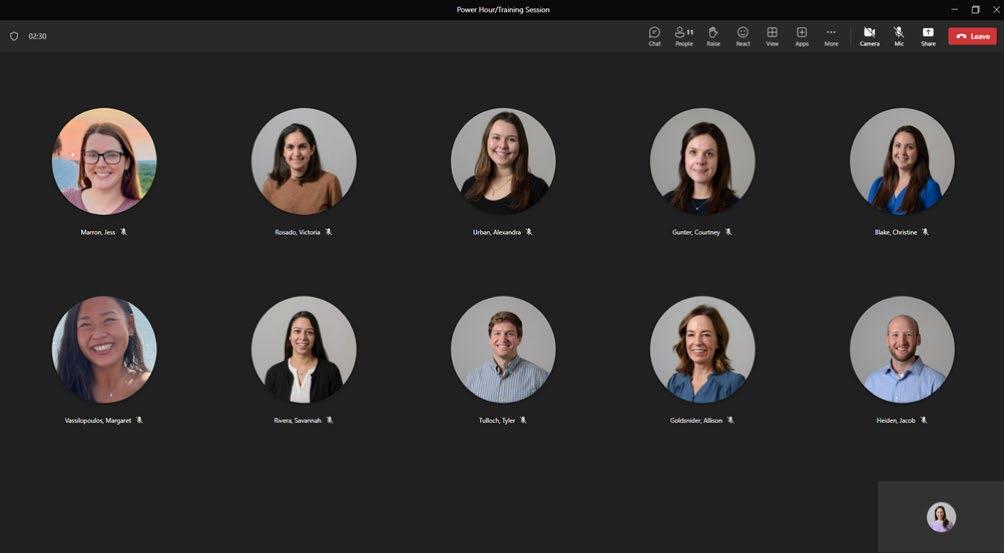
relief from the long day’s work. It is also one of the few meetings where being off camera is encouraged, further contributing to its low-pressure nature. Power Hour has built team comradery and has created a sense of closeness that is difficult in a hybrid/remote working environment. Holding it in the late afternoon twice a week has worked well for us, as it becomes a wind down to the day, which allows us to be more open to social conversations, rather than at a 9 AM meeting when our to-do list for the day is just getting started. Another key component of Power Hour is that the tone is really led from the top. Our directors are actively engaged in the fun conversations as much as they are there to help with work questions, which keeps the meeting fresh and active even after several years. Departments throughout our university have taken note of our department’s close-knit team and have even commented that they could never recruit from us because we are so close.
Informal communication like Power Hour or group chats solves one of the most common challenges we face in remote or hybrid work. Having an informal line of communication with your team provides employees with a sense of belonging, which is a key component of building a strong and dedicated team. Team members are encouraged to meet with one another, not just during a new employee onboarding process, but on an ongoing basis. This helps the team invest in one another on both a personal and professional level, which leads to a higher level of dedication to the team goal, less turnover, and greater efficiency.
There is a quote that goes, “The most dangerous phrase in the English language is, “We have always done it this way”. The initial shock of the research administrative transition from working in an office to a remote/hybrid environment has been tremendous. But change is good! It is important to adapt with whatever life throws at us and through this
transition, we have discovered new tools and strategies to continue to thrive and serve our researchers so that they can continue to make groundbreaking discoveries. We hope you have learned helpful techniques that you will implement to foster a close-knit team working in a remote or hybrid workplace. N
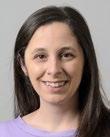

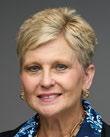
Kayla Burgess is a Pre-Award Grants and Contracts Manager in the College of Liberal Arts and Sciences Grants Management Services at the University of Connecticut. She has been in research administration for 4 years and learned research administration in the post-COVID world of remote and hybrid work. For the last 2.5 years, she has also trained all new department employees in pre-award administration remotely. Kayla has presented at NCURA regional and national meetings. She can be reached at kayla.burgess@uconn.edu.
Savannah Rivera is a Pre-Award Grants and Contracts Specialist in the College of Liberal Arts and Sciences Grants Management Services at the University of Connecticut. Savannah was onboarded just after COVID and has worked as a research administrator for the last 3.5 years in both a hybrid and remote environment. She has trained new department employees in pre- and post-award duties. Savannah has presented at the NCURA regional and national meetings. She can be reached at savannah.rivera@uconn.edu.
Robyn Remotigue is Executive Director, Office of Research and Scholarship Services, in the College of Nursing at the University of North Texas Health Science Center at Fort Worth. She has been in research administration for more than 25 years. She is a graduate of the 2012 NCURA Executive Leadership Program and 2010 NCURA Leadership Development Institute. She serves as the Chair of the NCURA Nominating and Leadership Development Committee. Robyn is also a faculty member of NCURA’s workshop SPA II: Critical Issues in Research Administration and a NCURA peer reviewer. Regionally she serves as Chair of Region V’s Mustang Mentoring Program. She can be reached at Robyn.Remotigue@unthsc.edu.
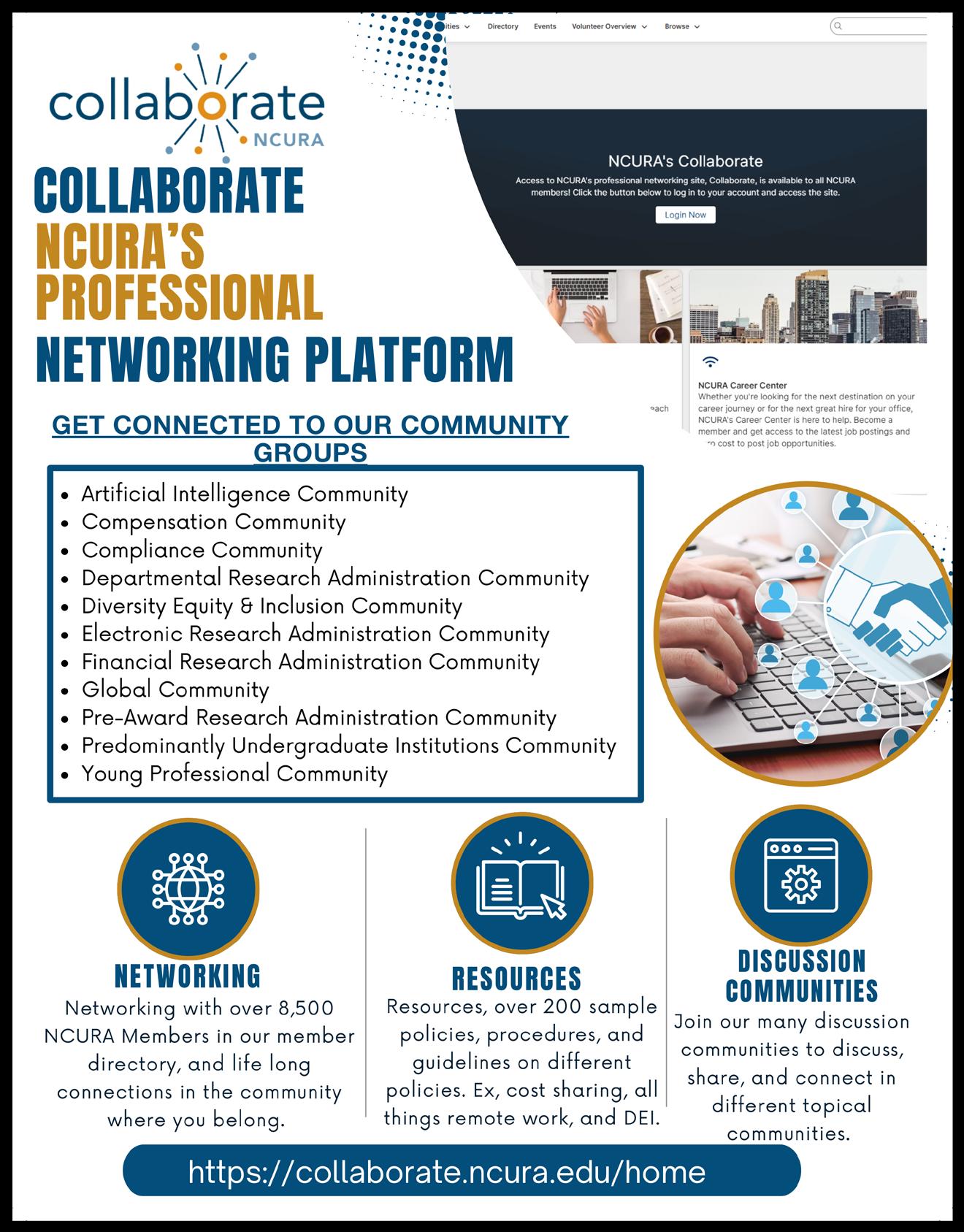
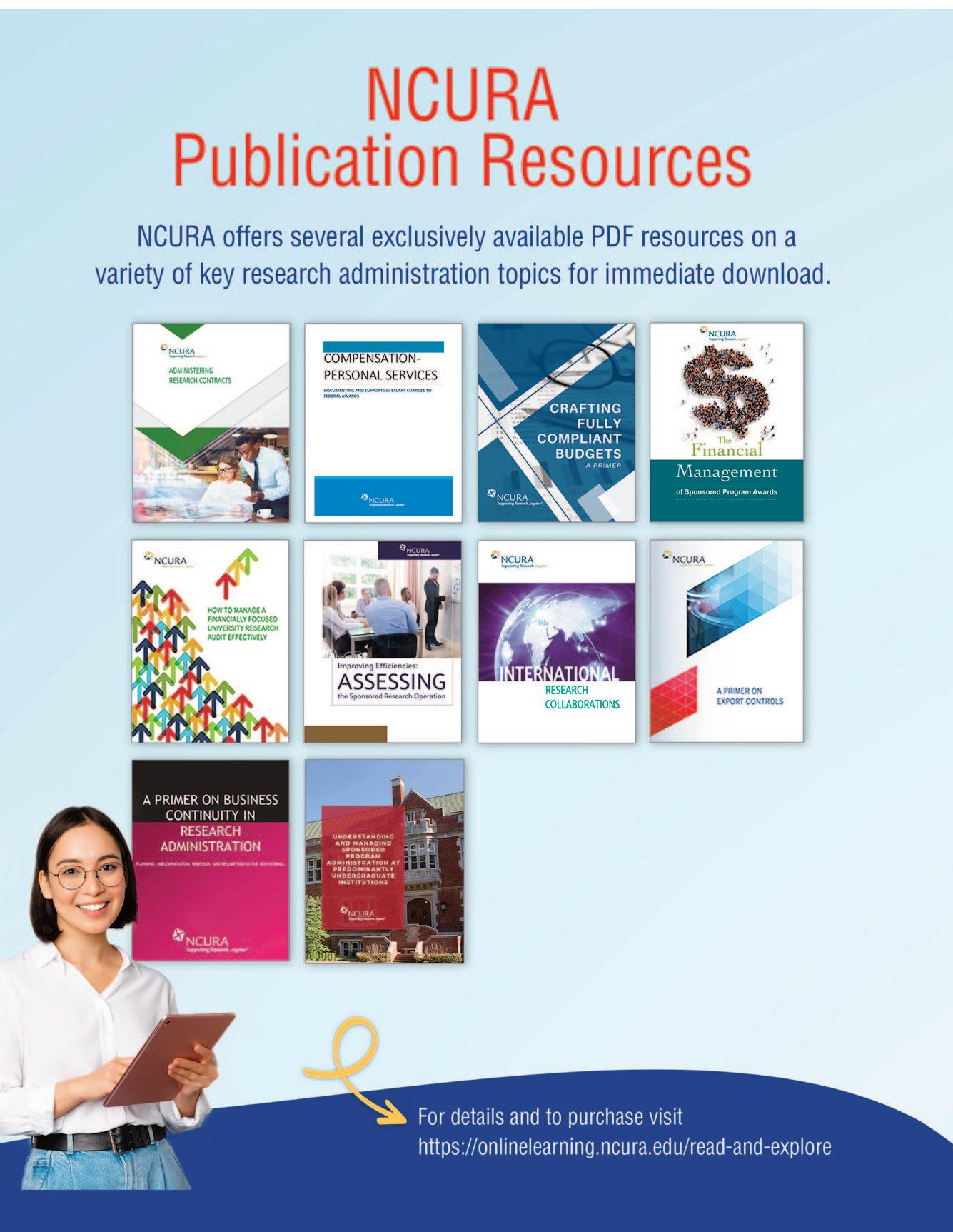
• Administering Research Contracts
• Compensation-Personal Services: Documenting and Supporting Salary Charges to Federal Award
• Crafting Fully Compliant Budgets
• Financial Management of Sponsored Program Awards
• How to Effectively Manage an Audit
• Improving Efficiencies: Assessing the Sponsored Research Operation
• International Research Collaborations
• A Primer on Business Continuity
• A Primer on Export Controls
• Understanding & Managing Sponsored Program Administration at Predominantly Undergraduate Institutions
By Anna Frost
The profession of research administration (RA) is undergoing an immense amount of exciting change thanks to initiatives to grow the nation’s research enterprise, such as the National Science Foundation’s GRANTED program and the National Institutes of Health’s STRONG program. Additionally, formal associations like NCURA, NORDP, and CLASP facilitate knowledge transfer and skills development. These programs and associations have inspired a magnetic and optimistic profession that can be accomplished only through a collective, conscious effort undertaken by research administrators, university leaders, and faculty (RA’s holy trinity, if you will).

organize ourselves has a direct impact on how we organize others; the practices of learning we do inside our office mirror the practices of learning we facilitate outside.
Every year, each OGRD staff member evaluates how their work activity aligns with the three characteristics of a community of practice in three spheres of influence: personal, organizational, and global. The three characteristics of a community of practice and their key actions are:
1. Domain (shared interest).
Key action: Participation (acting and connecting).
According to Wenger-Trayner and Wenger-Trayner (2015), a community of practice is a group of people with a shared common interest they do together over a sustained amount of time with the intention of doing it better. A community of practice cultivates learning through a variety of ways, such as problem solving, identifying gaps in competence, making requests for information, seeking experience, and documenting developments. Because it is not limited to formal organizational structures, a community of practice can create connections with people and resources across organizational and geographic boundaries.
RA is a community of practice with the common interest of administering sponsored programs through formal and informal networks to learn, innovate, and grow. To best support Project Directors/Principal Investigators (PD/PIs), the RA profession engages in an ongoing, social, and interactional learning process to allow its practices to evolve (Wenger, 1998). With increasing compliance, the evolution of technology and artificial intelligence, growing attention on policy development, and the general intent to broaden participation, RA is seeing a rise in research administrators demanding to participate in “shared histories of learning” (p. 86).
In the Office of Grant and Research Development (OGRD) at Eastern Washington University (EWU), we have developed our own community of practice. OGRD’s vision, crafted in late 2023 on the heels of a boost of support by the Provost’s Office, is to create a culture where grant-seekers and project directors feel confident and supported in a community of peers. Our mission is to inspire, support, and supply EWU faculty and staff with the tools to pursue grants and research as a community of practice. Our vision applies not only to the impact we create among PD/PIs at EWU, but also the practice we have inside our office. How we
2. Community (joint activities, discussion, information-sharing, participants care about their standing with each other).
Key action: Learning.
3. Practice (develop shared repertoire of resources).
Key action: Knowing.
We then identified our areas of influence:
How do you make meaning of your work? Or, how do you build your identity in each of these areas?
What actions do you take to learn?
What actions do you take to contribute to the larger body of knowledge (to knowing)?
What do you need to strengthen your participation, learning, and knowing?
One’s definition of their influence areas might be different among team members or from one institution to the next. For instance, a research administrator might consider their global influence to be the RA profession. In any event, the following chart demonstrates questions that are intended to draw attention to the way one makes meaning of, and commitments to, practices that accomplish participation, learning, and knowing in the RA profession.
In addition to OGRD’s vision and mission statements, we also developed a tagline, which is a short-and-simple phrase to remember our brand: Crafting Your Dreams. Together. As I describe below, three main concepts in this tagline capture the spirit of a community of practice.
Craft. According to Richard Sennett (2008), two characteristics of craftsmanship are human engagement and skill development. A job ‘well done’ requires the proficiency of problem solving; the more a person develops a skill, the more problem-attuned they become. Attainment of these higher reaches requires practice, which not only means learning how to craft an excellent product, but also knowing when to stop—to determine when the product is ‘good enough.’
Notably, there is a difference between art and craft (Sennett, 2008). Art produces work that is unique or distinctive and can be created in little time at all. Art holds a special place in social environments because consumers form bonds with the concept of originality. In this way, the appearance of the work of art matters; consciousness of the art becomes reality. The downside to personal bonds with art, however, is that art lacks a collective shield of protection in the social world.
In contrast, craft is the product of “a more anonymous, collective, and continued practice” (Sennett, 2008, p. 66). Craftspeople produce things in a relatively slow amount of time in the social sphere, and they often engage in work rituals, mentoring, and face-to-face knowledge transfer (aka practices of learning) to make their product. However, the disadvantage with craft is that others do not necessarily form an intimate connection to the craftsperson’s product; consumers may not feel stirred enough toward action or even be conscious of the product.
The entire cradle-to-grave practice, from pre-award to post-award and closeout, is a practice of craft, not art because it is an endeavor that requires high collaboration (collective) across a long amount of time (continued learning practice), yet also tends to be effectively nameless in the public eye (anonymous), especially when proposals go unfunded. As “wing-people” to PIs/PDs, research administrators receive little credit despite their powerful influence, subject matter expertise, and work to sustain research activity.
Dreams. The work of RA sustains other people’s dreams. Whether that be to fund research, buy equipment, or deliver a community program,
these endeavors hold meaning for at least one person if not more, with the impact being on the order of dozens, hundreds, thousands, or even millions. However, as is known all too well in sponsored programs, for every idea that gets funded, nine ideas do not; and as the saying goes, ‘when you have seen a grant, you have seen a grant.’ Hence, the profession of RA is defined by—and even thrives on—uncertainty. Because no “idealized human-dependent reality” (Mowles, 2015, p. 155) exists, the work of research administrators is to learn to do it better, and to apply what they learn to support PIs/PDs to do it better. Upon acceptance that organizational life is uncertain, complex, and paradoxical, research administrators can create new pathways and solutions to do their work better in service to the dreams of PIs and PDs.
Together. Undergirding all the work research administrators do in service to the dreams of PIs and PDs is the concept of entanglement (Barad, 2007). The entire profession of RA is braided via connection with others, and the trope of the individual researcher is outdated and inapt. Rather, what “comes to matter” evolves through a practice of thinking and knowing by way of connection and operations of power with others (Convening of Care Collective, 2024). A community of practice in RA is therefore one that chooses to learn together for the shared intention of the improvement of the profession: my knowing is your knowing is our knowing. N
References
Barad, K. (2007). Meeting the universe halfway: Quantum Physics and the entanglement of matter and meaning. Duke University Press.
Convening of Care Collective. (2024.) Care in the Academic Research Enterprise: Refections and a Call to Action from the Inaugural Convening of Care.
Mowles, C. (2015). Managing uncertainty: Complexity and the paradoxes of everyday organizational life. Routledge.
Sennett, R. (2008). The craftsman. Yale University Press.
Wenger, E. (1998). Communities of practice: Learning, meaning, and identity. Cambridge University Press.
Wenger-Trayner, E., & Wenger-Trayner, B. (2015). Introduction to communities of practice: A Brief Overview of the Concepts and its Uses. https://www.wenger-trayner.com/ introduction-to-communities-of-practice/

Anna Frost leads the research development arm of the Offce of Grant and Research Development at Eastern Washington University (EWU). Her primary roles include writing institutional grants, editing and reviewing grant proposals, and training in grants and research. She is also the PI of a National Science Foundation GRANTED planning award. Originally trained as a journalist, Anna earned her PhD in Leadership Studies and is a long-time writer, editor, and writing teacher. She can be reached at afrost8@ewu.edu.


Are you surprised that the answer is “it depends?”! During NCURA’s 26th Financial Research Administration Conference (FRA), we will dive into this year’s inspiring theme: "Navigating the Waves of Innovation." During an aspiring two-day conference, March 17-18, 2025, we will explore the innovative possibilities and emerging challenges shaping the future of our profession. Set against the backdrop of San Diego’s stunning coastline and vibrant atmosphere, this event offers a unique opportunity to connect with industry leaders, exchange ideas, and stay at the forefront of change.
This year’s program is designed to inspire, inform, and connect. We are honored to feature an exceptional keynote speaker, Dr. Mona Hanna: pediatrician, scientist, activist, and author. Dr. Mona was named one of Time magazine’s 100 Most Influential People in the World and recognized as one of USA Today’s Women of the Century for her role in uncovering the Flint water crisis and leading recovery efforts. Her groundbreaking work exemplifies the power of innovation in action, setting the stage for meaningful discussions as we dive deeper into the conference through thoughtful sessions in a variety of tracks and dynamic workshops like “Other Duties as Assigned: A Day in the Life of a Departmental Research Administrator” and “Workload Measurements - A More Realistic Approach to Staffing Our Offices.” From emerging technologies to forward-thinking strategies, these opportunities will equip you with tools and ideas to navigate the shifting currents of our profession.
We owe tremendous gratitude to our Program Committee, whose hard work and vision have brought this conference to life. Their dedication has ensured a rich and impactful program that offers something for everyone. We also extend heartfelt thanks to the NCURA professional staff, whose expertise and unwavering support have been indispensable.
We invite you to navigate the conference with us and make the most of every moment. Attend sessions, connect with colleagues, visit sponsor booths, and immerse yourself in the collaborative spirit that defines our community. Whether you’re seeking practical insights or transformative inspiration, this event is designed to energize and empower you.
And, of course, take time to enjoy San Diego! With its sparkling beaches, cultural landmarks, and diverse culinary scene, this city offers countless opportunities to unwind and recharge.
Together, let’s embrace the waves of innovation and chart a bold course for the future of financial research administration.

With gratitude and excitement, Anne Albinak

Jessica McDonough
To be a leader there must be followers, correct? Before we define what is a leader, we should state what a leader is not. A leader does not abuse the authority they are privileged to hold, a leader does not demonstrate a lack of humility, and a leader is not self-reliant, maintaining a non-communal atmosphere in the workplace. May I suggest that if you are a leader in research administration, you must do it by example? The adage of “do as I say not as I do” simply does not work in the age of Diversity, Equity, and Inclusion (DEI). It never really worked. Employees just accepted it without outward expression, out of fear of losing their employment. This is no longer the case; people want to see integrity in the workplace along with empathy and understanding of their individual situations. How do we accomplish being a successful leader in the office and still get the work done in an effective, efficient manner, while balancing our own work life and family life? The two do not have to be separate goals, but the skills obtained and displayed in your work life can be transferred to your personal life. Let us explore three leadership traits together: integrity, temperament, and vision.
First, integrity. Are you an honest person? What values are important to you, and do you bring those values to the office? As a leader, those who follow you will hold you to a higher standard than they will keep for themselves. The expectation is that you must be consistent, authentic, without fault, and always be a person of high moral principles. The truth is no one is perfect, but perfection is what you will be held to. So, what to do? You must always present your best. You must demonstrate sound judgment and be consistent in your decision-making process. Why is this important? It is important that those that follow you can trust you. Trust goes hand in hand with integrity. In research administration reporting
By Vivian Thomas McClain
accurate information to those that are footing the cost speaks volumes in the industry. We all have read numerous articles where inconsistent reporting has cost millions in loss research dollars and more in tainted reputations. As a leader, a lack of integrity carries a cost that can be detrimental to your university. Second, temperament. How you deal with problems and people demonstrates your leadership maturity. Unexpected situations will inevitably arise—challenges with upper management, colleagues, family, and budgets; sometimes all in the same day. How do you respond? Do you decrease the flames, or do you throw gas in the fire? Your response is the way your team will respond. Temperament is your emotional cue. Your relationships will grow stronger or become dismantled, depending on your approach to solving problems. Solving problems is not an easy task. At times we will have to collaborate with colleagues, inside or outside of your organization, or sometimes a decision will have to be made in isolation. Either way, the decision should be made for the good of the
organization and the team, and sometimes the best decision for the organization is not the best for the team—the two can be in polar opposition to each other. What to do? You go back to the first trait and make the decision based on your integrity. If your team trusts you, then they will know you did the absolute best you could do in your position. Your communication skills are of utmost importance during times of crisis and conflict. Open, straightforward communication is the best way to put out fires and de-escalate conflicts. I am sure you have no conflicts in your teams, but for those that do, confront the problem as quickly as you can in a calm demeanor with truth and a listening, empathic ear. If trust has been established, your team members will be more willing to listen and come to a resolution of the conflict. A leader trying to establish their place in a new work environment should meet with the team corporately and individually, have a listening, empathic ear, and be open to collaborating with others before making dramatic changes with the expectation of inherited team members to blindly follow. Many conflicts can be avoided among team members if there is space to openly discuss and listen to each other. Your willingness to show patience will enhance your communication to your team and to others.
Finally, vision. Leadership requires the leader to have a vision for the team. This vision includes planning for the future, building a healthy community, and creating a viable culture to thrive. Making an unbiased assessment of your team can be challenging. You will have to be honest with yourself—remove any favoritism, disregard the personal situations of team members—and solely look at the work, the required tasks to be completed, and the personnel that you currently have. You may be surprised at what you find; many times you will see the deficits in the team, but you might have to search for the assets. Then you must decide how to improve the deficits and how to encourage the assets to continue to grow. Can you provide support to team members within the budget you have been given? Support can come in numerous ways, of course, there is the monetary incentive, but many times support can come in diverse ways without breaking the bank. Encouraging words of affirmation, small tokens of appreciation, providing space for creative ideas from the team, having open forums, and creating avenues for advancement are just a few ways to show support. The leader of my team had many creative ideas that encouraged collaboration within the department, including the creation of a committee solely for FUN. This committee was tasked with exploring the interests of the diverse community and creating events where those interested could partake. Committee events include a visit to a religious temple, a wine tasting, and volunteering on a Habitat for Humanity project. Vision is more than money—get creative, your team needs you.
The perfect leader does not exist, but leading by example requires the leader to get appropriate rest, be a lifelong learner, and have the ability to pivot when necessary. When a leader combines integrity, temperament, and vision in their daily life, the team that one leads will trust the leader, be open to communicating when conflict arises, and be willing to follow the leader with the same values, character, and forward mindset that has been demonstrated. N
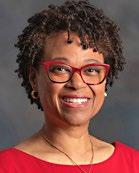
Dr. Vivian Thomas-McClain has more than 25 years of experience in research administration and is currently serving as the Assistant Director, Award Setup & Accounts Receivable at Rutgers University. She can be reached at viviant@finance.rutgers.edu.
By Shanae Raj
In an increasingly interconnected world, the theme “All of Us” resonates profoundly within the realm of research administration. It summarizes the realities of our ecosystem where we are interdependent on one another to facilitate funding acquisition, provide project management support and so much more. As administrators, we must take proactive steps to foster community. By engaging in meaningful conversations, implementing innovative strategies, and collaborating across departments, we can truly advance the industry.
Collaboration can have a significant impact on innovation and our respective research enterprises. At my institution, I’ve witnessed the impact that fostering relationships between departments and central offices can have on innovation, particularly process improvement and productivity. By connecting with colleagues across the institution, we’ve created unique training opportunities and utilize technology to improve critical business processes. The relationships established through these efforts helped to foster community and solidarity, empowering employees to feel connected to the mission of the institution.
To effectively collaborate across your institution, I would encourage you to reflect on the stakeholders impacted by your problem or idea. Identify these individuals to initiate meaningful and open conversations, creating channels for sharing ideas or concerns about both problems and solutions. Additionally, it builds camaraderie, as your colleagues better understand their role in resolving said problem or generating the next great idea. Maintain these working relationships by establishing regular meetings to check in, discuss progress or roadblocks, celebrate successes, or reinforce a sense of unity.
In a world characterized by complex regulations, limited resources, and administrative burdens, devising strategies to surmount challenges can be daunting but are necessary to advance research administration. You will be amazed at what you can accomplish by cultivating a culture of collaboration and innovation. Together we are shaping the future of research administration where “All of Us” truly means all. N

Shanea Raj is the Effort Reporting Manager for Grants & Contracts Accounting at Virginia Commonwealth University (VCU). Shanea has a background in private sector accounting and financial post-award management. In her current role, she oversees effort certification and post-award compliance to facilitate and enable research at VCU. She can be reached at mclaurinsm@vcu.edu.
President
Denise Moody
Lundquist Institute for Biomedical Innovation
Vice President
Shannon Sutton
Georgia State University
Treasurer
Kay Gilstrap
Georgia State University
Secretary
Diane Hillebrand
University of North Dakota
Immediate Past President
Kris Monahan
Providence College
Executive Director
Kathleen Larmett
NCURA
Eva Björndal
King’s College London
Natalie Buys
University of Colorado Anshutz Medical Campus
Jennifer Cory
Stanford University
Jill Frankenfield
University of Maryland, Baltimore
Katy Gathron
MD Anderson Cancer Center
Melanie Hebl
University of Wisconsin-Madison
Katherine Kissmann
Texas A&M University
Rosemary Madnick
Lundquist Institute for Biomedical Innovation
Danielle McElwain
University of South Carolina
Nicole Nichols
Washington University in St. Louis
Scott Niles
Georgia Tech
Lamar Oglesby
Rutgers University
Geraldine Pierre
Boston Children’s Hospital
Lori Ann Schultz
University of Texas at San Antonio
Thomas Spencer
University of Texas Rio Grande Valley
Treasurer
Kay Gilstrap
Georgia State University
Past Treasurer
Timothy Shailey
Thomas Jefferson University
Trakia Bennett
Georgia Tech Research Institute
Sheri Farber
Dignity Health/Barrow Neurological Institute
Darren Howard
Moraine Valley Community College
Lana Metayer
University of Vermont
Terrice Watson
University of Memphis

Chair
Robyn Remotigue
University of North Texas HSC at Fort Worth
Vice Chair
Csilla Csaplar
University of California, Santa Cruz
Erin Bailey
University at Buffalo
Sylvia Bradshaw
Southern Utah University
Kristin Harmon
University of Wisconsin-Madison
Mary Louise Healy
Johns Hopkins University
Fadia Homeidan
American University of Beirut
Kris Monahan
Providence College
Jill Mortali
Dartmouth College
Lisa Mosley
Yale University
Katie Plum
Angelo State University
David Smelser
University of Tennessee
Kevin Stewart
University of California, Santa Barbara
Tony Ventimiglia
Auburn University

Chair
Dorothy Johnson
Gladstone Institutes
Vice Chair
Randi Wasik
University of Louisville
Daniela Amadio
University College London
Megan Bergeron
Texas A&M University
Danielle Boone
Howard University
Jeff Derr
Attain Partners
Katie Gomez Freeman
Southern Utah University
Liz Grinstead
University of Chicago
Jennifer Harman
University of Rochester
Amy Jones
University of Cincinnati
Cynthia Kane
Lehigh University
Jennifer Lech
Woods Hole Oceanographic Institute
Jennifer Marinella
Woods Hole Oceanographic Institute
Darren May
Auburn University
Sam Mombou
University of Nebraska-Lincoln
Betty Morgan
North Carolina State University
Debra Murray
University of Maryland
Tanta Myles
Georgia Tech
Juliette Pickering
Boston Children’s Hospital
Calleen Roper
University of Wisconsin-Madison
Aimee Kendall Roundtree
Texas State University
Kathryn Simpson
St. Jude Children’s Research Hospital
Shannon Sutton
Georgia State University
Kathryn Wrench
Lawrence Technological University
Chair
Amanda Tan
University of California-Los Angeles
Vice Chair
Joseph Gibbs
University of California-Los Angeles
Melissa Freudenberger
University of Tennessee Institute of Agriculture
Hansa Magee
University of Missouri
Luigi Pellegrino
Bocconi University
Stacy Stuart University of Arkansas
Jeannine Voll
Children’s Hospital of Philadelphia
Annie Wu
University of Houston Libraries
Chair
Sybile Bayiha
University of Maryland
Vice Chair
Brigidann Cooper
University of Washington
Savannah Allshouse
Colorado School of Mines
John Jay Alves
Harvard Pilgrim Health Care Institute
Paul Below
St. Jude Children’s Research Hospital
Robyn Cooper
American Heart Association
Habtamu Getinet Desta
Addis Ababa University
Heather Lewis
New York Genome Center
Luke Lynch
University of Minnesota-Twin Cities
Jason Park
University of California-Irvine
David Scarbeary-Simmons
Kaiser Foundation Research Institute
Chair
Annika Glauner
ETH Zurich
Vice Chair
Megan Moore
Harvard University
Olive Giovannetti
University of California, San Francisco
Makram Halawani
American University of Beirut
Anna Jackson
University of Chicago
Nicole Joyce
University of California, San Diego
Mariam Keburia
Business and Technology University
Beth Kingsley
Yale University
Henna Moore
University of Helsinki
Stephen Tersoo Orafa
University Nigeria Teaching Hospital
Ara Tahmassian
Harvard University
Alexa Van Dalsem
University of Colorado Boulder
Chair
Mario Medina
University of Kansas Medical Center
Past Chair
Tricia Callahan
Emory University
Tommy Coggins
University of South Carolina
Tracey Fraser
University of California-Los Angeles
Roger Wareham
University of Wisconsin-Green Bay
By Lisa Kim
As we look toward the horizon of an increasingly remote work environment, research administrators are finding themselves in uncharted territory, where the need for effective leadership has never been more critical. The shift to remote work presents unique challenges for managers, requiring new strategies to maintain team cohesion, productivity, and morale. In this section, we explore how an integrative coaching approach, rooted in the principles of coaching relationships, goal setting, emotional intelligence, and narrative coaching, can equip managers to meet these challenges head-on. According to the International Coaching Federation (n.d.), 65% of staff are highly engaged in companies where coaching is valued. By adopting these strategies, managers can not only navigate the complexities of remote work but also foster a culture of resilience and growth within their teams, paving the way for a more empowered and adaptable future.
Coaching Relationships
The quality of the coaching relationship is fundamental to effective coaching. DeHaan and Gannon (2016) emphasize that rapport, trust, commitment, and collaboration are crucial in coaching relationships across various fields. For remote work managers, establishing a strong coaching relationship is vital due to the physical distance and potential for miscommunication inherent in remote work environments. Building rapport and trust in a virtual setting can be challenging but essential for effective coaching. Remote work managers must utilize technology to create a sense of presence and connection, ensuring communication is clear, transparent, and frequent.

Methods such as regular video calls, virtual team-building exercises, and consistent feedback can help maintain a strong relationship. Additionally, the perceived quality of employee coaching relationship (PQECR) can be a valuable tool for enhancing one’s understanding and practice of employee coaching relationships. It provides a structured way to evaluate and improve the quality of coaching provided by supervisors, thereby contributing to better developmental outcomes for employees and overall organizational effectiveness (Gregory & Levy, 2010).
However, the PQECR relies on employees’ perceptions of their coaching relationships, which can be highly subjective. Personal biases and individual differences in perception might influence the responses, leading to variability that may not accurately reflect the true quality of the coaching relationship.
Clutterbuck and Spence (2016) critique the traditional SMART goal-setting model, advocating for more flexible and non-linear approaches to goal setting in coaching. This perspective is particularly relevant for remote work managers, whose goals may need to adapt to rapidly changing circumstances and environments.
Remote work managers could benefit from a goal-setting approach focusing on personal strivings and broader intentions rather than rigid, specific targets. This allows for greater adaptability and responsiveness to the dynamic nature of remote work. Remote managers can facilitate the exploration of mid-level constructs,
helping their staff to identify and pursue meaningful and aspirational goals that align with their values and needs. By integrating the revised SMART framework, remote managers can better support their staff in achieving sustainable and impactful outcomes. It encourages setting goals that are flexible, adaptable, and transformational, acknowledging the ever-changing nature of circumstances and the importance of personal growth and transformation in goal-setting (Winter, 2010).
However, implementing this more nuanced framework may require more sophisticated management and coaching techniques, which could be challenging for those accustomed to the traditional SMART model.
Emotional intelligence is critical to effective leadership, especially in remote work. Cox (2016) explores how coaches can work with emotions, emphasizing the importance of understanding and managing emotions in coaching practice. Remote work can exacerbate feelings of isolation, stress, and burnout among managers and staff, making emotional intelligence and regulation essential skills.
Remote work managers can use techniques from emotional intelligence and emotion regulation to help their staff navigate their emotional landscape. This includes developing self-awareness, empathy, and resilience. As Cox (2016) suggested, creating an emotional climate inventory can help identify employees’ emotional needs and tailor coaching interventions accordingly. Remote work managers could create a supportive and effective coaching environment that addresses their staff’s emotional and developmental needs. Remote work managers can effectively coach their staff by applying these insights. First, recognize that staff often focus on their emotional realities and current concerns. Managers should maintain a client-centered approach, emphasizing strengths and broadening perspectives. Encourage staff to adopt a future-oriented mindset, concentrating on solutions rather than problems. Practice empathic listening to understand staff’s needs and emotions, which is crucial in a remote setting where non-verbal cues are less visible. Additionally, be mindful of cultural differences affecting staff’s emotional expressions and needs. Finally, managers should prioritize their own self-care and seek supervision or peer support to manage the emotional demands of coaching their staff.
However, assessing emotional climate can be subjective, relying on individuals’ perceptions and interpretations. Each manager might perceive emotional climates differently based on their biases and perspectives. It is important to recognize that everyone is unique (Lipchik, 2014).
As discussed by Drake (2016), narrative coaching offers a powerful framework for helping coaches make sense of their experiences and develop new, empowering stories. Narratives shape how individuals perceive and navigate their world, and coaching can facilitate the reconfiguration of these narratives to promote growth and positive change.
Remote work managers can use narrative techniques to help their staff articulate their challenges, reflect on their experiences, and construct new stories that enhance their career development and capabilities. This involves understanding how their staff situate themselves within their work context, the cultural and contextual resources available, and identifying leverage points for change. By working with narratives, remote work managers can help their staff transform their stories from stress and limitation sources to empowerment and success pathways.
In remote settings, the absence of face-to-face interaction could reduce non-verbal cues such as facial expressions, body language, and tone of voice. These cues are crucial for understanding the emotional context and
nuances of narratives. Without them, remote managers may miss important emotional cues or misinterpret their staff’s emotions.
An integrative coaching approach that combines these four theories can provide a comprehensive support system for remote work managers. For example, a staff meeting might begin with establishing a strong rapport and trust (coaching relationship) and then exploring broader personal and professional goals (working with goals). The remote manager can then address any emotional challenges their staff faces (working with emotions) and help them reframe their experiences through narrative techniques (working with narratives).
Such an integrative approach ensures that coaching interventions are holistic, addressing the multifaceted nature of the challenges faced by remote work managers. This comprehensive support could improve leadership, team dynamics, and overall performance.
In conclusion, integrating theories on coaching relationships, goal setting, emotional intelligence, and narrative coaching offers research administrators a powerful framework for supporting remote work management. By addressing the unique challenges of remote work through a holistic coaching approach, research administrators can guide their teams more effectively, fostering resilience, adaptability, and professional growth. This integrative approach enhances the effectiveness of coaching and contributes to the development of research administrators as empowered leaders, equipped to navigate the complexities of the evolving research landscape. N
References
Clutterbuck, D. A., & Spence, G. (2016). Working with goals in coaching. In T. Bachkirova, G. Spence, & D. Drake (Eds.), The SAGE handbook of coaching (1st ed., pp. 218–237). SAGE Publications Ltd. https://doi.org/10.4135/9781473983861
Cox, E. (2016). Working with emotions in coaching. In T. Bachkirova, G. Spence, & D. Drake (Eds.), The SAGE handbook of coaching (1st ed., pp. 272–290). SAGE Publications Ltd. https://doi.org/10.4135/9781473983861
DeHaan, E., & Gannon, J. (2016). The coaching relationship. In T. Bachkirova, G. Spence, & D. Drake (Eds.), The SAGE handbook of coaching (1st ed., pp. 195–217). SAGE Publications Ltd. https://doi.org/10.4135/9781473983861
Drake, D. (2016). Working with narratives in coaching. In T. Bachkirova, G. Spence, & D. Drake (Eds.), The SAGE handbook of coaching (1st ed., pp. 291–308). SAGE Publications Ltd. https://doi.org/10.4135/9781473983861
Gregory, J. B., & Levy, P. E. (2010). Employee coaching relationships: Enhancing construct clarity and measurement. Coaching: An International Journal of Theory, Research and Practice, 3(2), 109–123. https://doi.org/10.1080/17521882.2010.502901
Lipchik, E. (2014). The development of my personal solution-focused working model: From 1978 and continuing. International Journal of Solution-Focused Practices, 2(2), 63–73. https://doi.org/10.14335/ijsfp.v2i2.23
The International Coaching Federation. (n.d.). Coaching in organizations. International Coaching Federation. Retrieved July 12, 2024, from https://coachingfederation.org/ coaching-in-organizations
Winter, D. A. (2010, September 27). How smart is SMART? Careers - in Theory. https://careersintheory.wordpress.com/2010/09/27/how-smart-is-smart/

Lisa Kim, MBA, MA, Pre-award Grants Specialist at Virginia Commonwealth University (VCU), is a volunteer for NCURA’s Compensation Collaborate Community Working Group. Lisa’s responsibilities at VCU include pre-award activities and post-award activities. She can be reached at kiml12@vcu.edu.
The research management ecosystem is complex and diverse with multiple stakeholders supporting the research infrastructure.
NCURA’s comprehensive resource can help to support your team and partner offices across your institution. It covers the full range of issues impacting the grant lifecycle with more than 20 chapters including:
• Research Compliance
• Subawards
• Audits
• Export Controls
• Administering Contracts
• Sponsored Research Operations Assessment
• Pre-Award Administration
• Intellectual Property & Data Rights
• F&A Costs
• Regulatory Environment
• Communications
• Organizational Models
• Post-Award Administration
• Special Issues for Academic Medical Centers
• Special Issues for Predominantly Undergraduate Institutions (PUIs)
• Training & Education
• Staff and Leadership Development
• 1100 index references
• 40 articles added over the past year
• 21 chapters
• Updated 4 times a year
• 1 low price
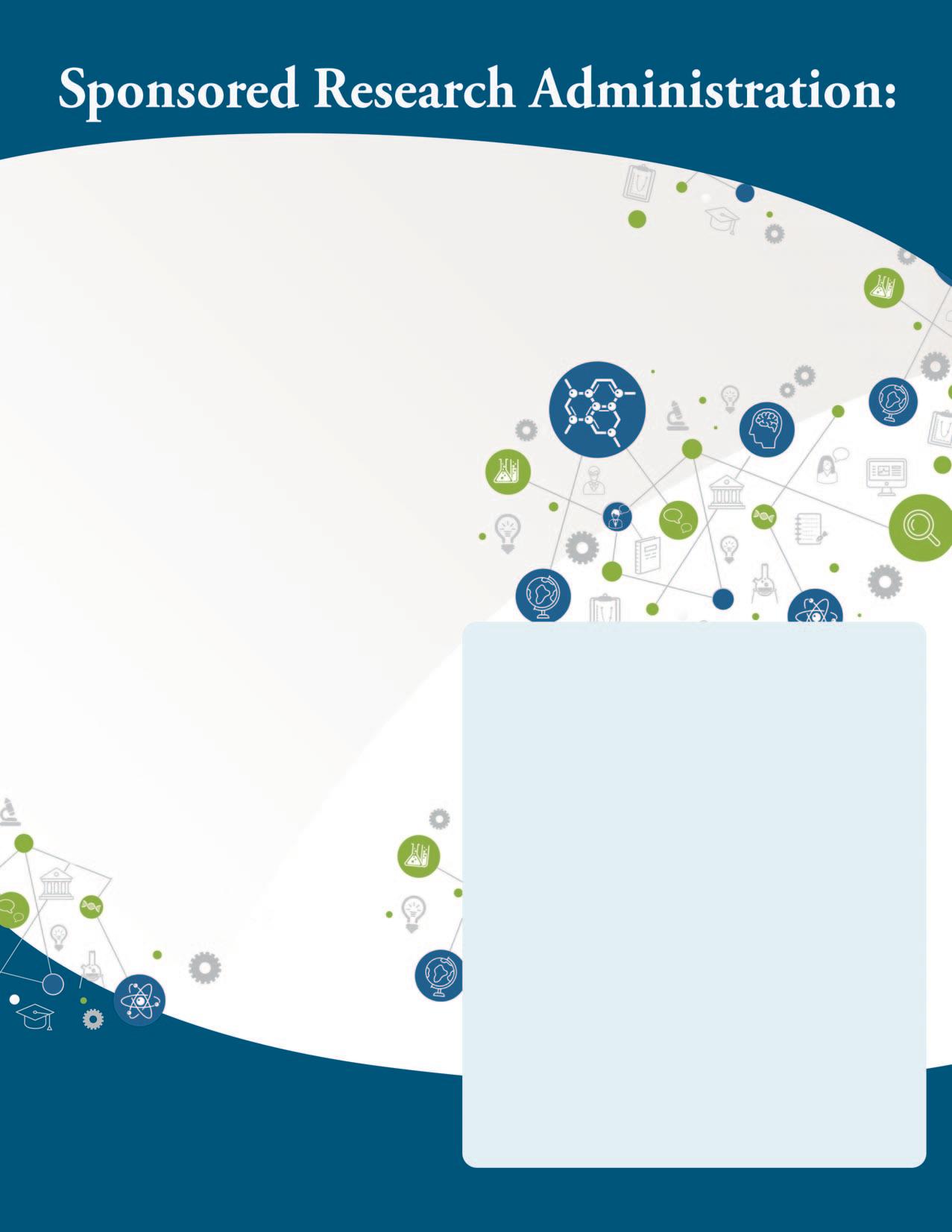
With remotetoday’s comprehensiveenvironmentworkthisPDF resource can be shared with institutionyour colleagues.
Recent Articles Include:
• Evaluating the Impact of Internal Submission Deadline Policy on Grant Proposal Success
• Preparing for and Surviving an Audit: Helpful Tips
• When Did You Say Your Proposal Was Due? Working on Short Deadlines
• Defining and Documenting Financial Compliance for Complex Costs
• Troublesome Clauses: What to Look for and How to Resolve Them
• Rewards of a Two-Part Subrecipient Risk Assessment
• Proposal Resubmission: Overcoming Rejection
• Mitigating Audit Risk at Small Institutions
• Fundamentals of Federal Contract Negotiation
• Managing Foreign Subawards from Proposal to Closeout
• How to Reduce Administrative Burden in Effort Reporting
• Strategies for Increasing Indirect Cost Recovery with NonFederal Sponsors
• A Guide to Industry-University Cooperative Research Centers (IUCRCs)
• Building Research Administration Community Through Service
• Turning Off Turnover - The Use of a Progression Plan to Attract and Retain Employees
By Cerrone Bell and Rashonda Harris




Introduction













The National Council of University Research Administrators (NCURA) is more than a professional organization—it’s a dynamic, inclusive community where members, staff, volunteers, and affiliated institutions collaborate to drive progress in research administration on a global scale. Through a network of educational programs, diversity initiatives, and regional support systems, NCURA empowers research administrators to succeed and innovate. This article highlights NCURA’s initiatives, such as the Empowering Members by Engaging Resources and Growing Excellence (EMERGE) program, regional opportunities, and DEI efforts, underscoring the essential role that “All of Us” play in the organization’s accomplishments and influence.
NCURA’s commitment to lifelong learning is reflected in its diverse educational resources that cater to the varied needs of research administrators. These include traditional webinars, flexible self-paced tutorials, and the specialized EMERGE program—a key initiative that prepares emerging research administrators to lead with confidence.
• EMERGE Program: Designed to equip new research administrators with the skills and knowledge necessary to excel, EMERGE is a leadership program intended to develop inclusive leaders while providing opportunities to connect with NCURA peers and resources. By focusing on emerging professionals, EMERGE not only supports individuals but also builds a robust talent pipeline, ensuring a future generation of capable research administrators poised to navigate and lead in complex research environments.

• Webinars and Self-Paced Tutorials: In addition to EMERGE, NCURA’s webinars and self-paced tutorials provide members with continuous learning opportunities on subjects such as compliance with federal regulations, university problem-solving strategies, and leadership skills. These resources are accessible to members at every career stage, providing valuable insights to strengthen their roles and institutions.

Through these educational offerings, NCURA fulfills its mission to support professional growth, ensuring research administrators are prepared to adapt to a rapidly evolving profession.
NCURA’s regional opportunities allow members to participate in local gatherings, fostering connections and collaboration across diverse institutional backgrounds. These regional groups bring NCURA’s resources closer to home, enabling members to engage with peers in their geographic area and addressing region-specific challenges and opportunities.
• Regional Conferences and Events: NCURA’s regional conferences and workshops offer an accessible platform for research administrators to exchange ideas, build partnerships, and share best practices. These events are particularly valuable for addressing issues unique to specific areas, such as local regulatory environments or funding availability.
• Peer Support and Collaboration: The regional structure of NCURA enhances the sense of community among members. Through regionally organized events and initiatives, members can share local insights and collaborate on projects that address shared regional challenges, strengthening both NCURA and their institutions.
These regional opportunities empower members to make a more immediate impact in their communities while contributing to NCURA’s larger mission of supporting research administration.
NCURA’s Diversity, Equity, and Inclusion (DEI) Committee leads initiatives and educational programs that foster an inclusive environment within research administration. Recognizing that diverse perspectives enhance problem-solving and innovation, NCURA is dedicated to creating an organization where all members feel valued and supported.
• DEI Educational Programs: The DEI Committee organizes and leads NCURA’s SCDEI Webinar Series, which focuses on issues of inclusivity and diversity in research administration. These educational opportunities help members understand the importance of equity in their work, promoting a culture of inclusiveness across institutions.
• Inclusive Member Engagement: The DEI Committee also emphasizes inclusive engagement strategies to ensure that all members, regardless of background, have a voice within NCURA. By prioritizing diversity, NCURA enhances the organization’s ability to address a wide range of challenges, making it stronger and more resilient.
Through these initiatives, NCURA not only fosters a more equitable research administration community but also ensures that diverse perspectives are at the forefront of its mission and values.
NCURA thrives through the active participation and dedication of its members and volunteers, who work tirelessly to further the organization’s mission. From the leadership of NCURA committees to the collaborative spirit of task forces, member involvement is at the heart of NCURA’s accomplishments.
• Active Participation in Committees and Projects: Members shape NCURA’s future through their involvement in committees, task forces, and special initiatives. This engagement not only drives NCURA’s mission forward but also ensures that the organization remains responsive to the dynamic needs of research administrators.
• Volunteer Leadership: Volunteers, including members of the DEI Committee, lead critical programs, create new educational content, and manage events. This culture of volunteerism instills a sense of ownership among members, ensuring NCURA’s standards remain high and its programs relevant and impactful.
This dedication to volunteerism is a cornerstone of NCURA’s success, creating a supportive, innovative community focused on advancing research administration.
➥ Continuous Improvement: Enhancing NCURA’s Offerings
NCURA is committed to the ongoing refinement of its resources, driven by member feedback and an understanding of the evolving landscape of research administration. Through this dedication to continuous improvement, NCURA ensures that its offerings remain relevant and impactful.
• Feedback-Driven Enhancements: NCURA listens to member feedback to enhance its curriculum, webinar topics, and regional and DEI programming. This approach allows NCURA to remain responsive to the current challenges and needs within research administration.
• Innovation in Programs and Topics: NCURA continuously seeks innovative ways to present educational content and engage its members. By staying ahead of industry trends, NCURA provides cutting-edge knowledge that prepares members to lead in an increasingly complex research environment.
This commitment to excellence and adaptability is central to NCURA’s role as a leading resource in research administration.
Conclusion: “All of Us” Strengthening NCURA’s Impact
The accomplishments of NCURA—and its role in advancing research administration—are made possible by the collective efforts of its staff, members, volunteers, and institutional partners. Together, these individuals and entities drive NCURA’s mission forward, cultivating a supportive environment that empowers research administrators around the world. Through programs like EMERGE, regional networking opportunities, and DEI initiatives, NCURA embodies a collaborative spirit that fosters personal and professional growth. The contributions of “All of Us” make NCURA an essential, transformative force in research administration, benefiting institutions globally. N



Cerrone Bell is a Subaward Specialist at the University of Connecticut with 6 years of experience supporting research. Cerrone specializes in post award research administration and uses his experience to ensure that sponsored research is funded timely, and that the university is doing business with stakeholders that share our attention to detail. He can be reached at cerrone.bell@uconn.edu.
Rashonda Harris, MBA, CRA, EdD, is a servant leader. She is the Founder and CEO of Purple Sheep Consulting and a Johns Hopkins Faculty member, teaching in the Masters for Research Administration program. She is a past National Board Member, DRA Traveling workshop faculty, a Region III, and a national recipient of NCURA Distinguished Service Award. She is also a former member of the Presidential Taskforce on Diversity, Equity, & Inclusion and a former Region III DEI committee member. Rashonda can be reached at rharr122@jhu.edu.
Have the latest regulations at your fingertips.

Bulk Pricing Available.
Order Yours!
In the final meeting of the year in December 2024, NCURA’s President, Kris Monahan, expressed gratitude to each Board member for their service over the past year. A special thanks were given to the Immediate Past President, Bryony Wakefield, for her support throughout the year as well as Timothy Schailey for his outstanding service as Treasurer. NCURA’s Board relies on the support of the outstanding professional staff who run the day-to-day operations.
NCURA’s Executive Director, Kathleen Larmett, thanked the Board for its support in working together on strategic issues and shared several 2024 highlights to include:
■ Membership grows to over 9,500 members.
■ Young Professionals membership grew to 1,100.
■ Student memberships continue to grow to 50+.
■ NCURA’s Board approved the Apprentice Affiliate members in October and in November welcomed its first Apprentice Affiliate member!
■ International Region membership climbed to over 200.
■ PRA and FRA went to Hawaii and brought along 2,400 attendees.
■ NCURA’s 66th Annual Meeting welcomed 1,900 members to Washington, DC.
■ NCURA produced:
■ 15 live webinars, providing education to 24,000 individuals
■ 12 in-person traveling workshops and 14 virtual “traveling” workshops
■ 6 webinars organized and hosted by the Select Committee on Diversity, Equity, and Inclusion
■ 3 one-day symposiums (AI, Research Security, Pre and Post Award Directors Leading Together)
■ 3 Young Professionals webinars
NCURA continues to strengthen our global partnerships and hosted in-person workshops and webinars on US Grant Funding and Management in the Republic of Georgia, Finland, Egypt, Nigeria, Italy, and Jordan. NCURA also hosted a Study Tour of US universities for a delegation from Republic of Georgia and signed an agreement with Greece to provide a Study Tour of US universities in 2025.
Approvals from the Board meeting include the following:
■ 2025 budget
■ Collaborate Vice Chair
■ Education Scholarship Fund Select Committee Vice Chair and five (5) members
■ One (1) Financial Management Committee member
■ Nominating & Leadership Development Committee Vice Chair, one (1) At-Large member, and one (1) regional member
President
Denise Moody
Lundquist Institute for Biomedical Innovation
Vice President
Shannon Sutton
Georgia State University
Immediate Past President
Kris Monahan
Providence College
Treasurer
Kay Gilstrap
Georgia State University
Secretary
Diane Hillebrand University of North Dakota
Executive Director
Kathleen M. Larmett
National Council of University Research Administrators
Eva Björndal
King’s College London
Natalie Buys University of Colorado Anshutz Medical Campus
Jennifer Cory
Stanford University
Jill Frankenfield
University of Maryland, Baltimore
Katy Gathron

■ Professional Development Committee Vice Chair, one (1) member, and three (3) Chair-Appointed members
■ Select Committee on Global Affairs Vice Chair and six (6) members
■ Select Committee on Peer Review recommended three (3) peer reviewers
■ Select Committee on Diversity, Equity, and Inclusion Vice Chair, four (4) members, and Chair-Appointed Member
■ Minutes from October 2024 Board meeting

Upon the conclusion of the meeting, President Monahan recognized the members who were concluding their service and thanked everyone for their invaluable contributions that help support NCURA’s mission and ensure the Board is always thinking strategically ahead.
As we begin 2025, we want to continue to be transparent and available to our membership on an ongoing basis and encourage our members to reach out to NCURA’s Executive Committee and/or Board of Directors with any questions or concerns at any time.
Denise Moody
NCURA President

If you have any questions, comments, or concerns, please feel free to reach out to any member of the Board of Directors or NCURA staff.

MD Anderson Cancer Center
Melanie Hebl
University of Wisconsin-Madison
Katherine Kissmann
Texas A&M University
Rosemary Madnick
Lundquist Institute for Biomedical Innovation
Danielle McElwain
University of South Carolina
Nicole Nichols
Washington University in St. Louis
Scott Niles
Georgia Institute of Technology
Lamar Oglesby
Rutgers University
Geraldine Pierre
Boston Children’s Hospital
Lori Ann Schultz
University of Texas, San Antonio
Thomas Spencer
University of Texas Rio Grande Valley
By Kairi D. Williams
As a contributing editor for NCURA Magazine’s compliance track over the past three years, I’ve had the privilege of engaging with and contributing to the dynamic interplay of expertise, collaboration, and innovation within our research administration and compliance community. As my tenure as a contributing editor comes to a close, this issue’s theme, “NCURA is more than just a professional organization,” resonates deeply with my experience. For me, and for all of us committed to advancing research administration, NCURA embodies a vibrant ecosystem where members, staff, volunteers, and institutional supporters intersect to drive continuous improvement in compliance and regulatory practices.
Our compliance track has evolved in response to increasing regulatory scrutiny, shifting federal guidelines, and the demand for transparent, ethical research practices. The focus is not only on informing our members but on preparing them for the challenges ahead. This requires input from every corner of our community—whether through volunteer members sharing firsthand experiences or NCURA staff guiding educational initiatives.
While serving as a contributing editor, I’ve been fortunate to support authors in creating relevant content that shares best practices and insights to assist our readers. Through articles such as Leadership-Centric Management for Research Administration Compliance: An Evolving Mindset, Strategic Risk Assessments: A Meaningful Step in Navigating
Compliance in Higher Education, and Who Can Sleep When There is So Much for an IACUC Administrator to Think About?, we have provided NCURA members with insights that are both timely and practical. Our article on strategic risk assessments offered institutions a proactive framework for managing compliance risks and empowering research administrators across universities to tailor risk management strategies to their specific needs.
Similarly, articles such as Building a University Platform for Data Use Agreements and Justice in Research: One Institution’s Efforts Towards Leading Inclusive and Just Research have helped members approach specialized topics with a broader, impact-driven perspective. These articles provide guidance on building robust data management systems and advancing inclusivity in research as well as supporting institutions in their commitment to ethical research practices while meeting complex
compliance requirements. Another key piece, Square Peg in a Round Hole: Subrecipients That Do Not Fit the Mold, addresses the challenges of managing subrecipients who don’t always fit standard compliance expectations. By sharing innovative strategies for navigating these relationships, we aim to help colleagues bridge compliance gaps and foster effective partnerships that enhance research outcomes.
By centering on these topics and more, NCURA elevates discourse around compliance creating a knowledge-sharing platform that reflects the collective experience and insight of its members. Past magazine issues, available through NCURA’s digital archive, offer a wealth of information that continues to guide members as they navigate the evolving compliance landscape. The dedication of NCURA staff and support from volunteers across institutions is crucial to making this possible. Staff efforts in organizing events, curating relevant content, and responding to members’ needs enable us to focus on what truly matters: enhancing the knowledge and skills required to navigate complex compliance issues effectively.
regulatory environment. Just as NCURA’s editors, writers, and staff adapt content to new policies and global shifts, university research administrators continually adjust their strategies to meet emerging compliance and funding challenges. This adaptability is crucial to sustaining and supporting impactful research and fulfilling the missions of both NCURA and universities.
In essence, NCURA’s contributors and university research administrators share a commitment to fostering research excellence and integrity. Both groups play foundational roles in supporting and advancing research whether through NCURA’s guidance and resources or by implementing that guidance directly in university settings. This symbiotic relationship strengthens the entire research administration profession, ultimately benefiting institutions and researchers worldwide.
Furthermore, assisting NCURA in fulfilling its mission presents invaluable opportunities for research administration and compliance professionals. Contributing to NCURA’s content, participating in committees, and presenting at conferences help professionals establish themselves as thought leaders, which can lead to career advancement and recognition. Additionally, NCURA contributors gain early exposure to emerging trends and best practices, which they can bring back to their institutions to enhance research support and compliance.
“NCURA elevates discourse around compliance creating a knowledge-sharing platform that refects the collective experience and insight of its members.”
There are striking similarities between those who help NCURA fulfill its mission and the many professionals supporting research at universities and research organizations. In NCURA, members and staff collaborate to establish best practices, adapt to changing regulations, and uphold compliance standards mirroring the efforts within university research compliance offices. Just as NCURA’s contributors develop resources to help navigate complex compliance landscapes, university compliance officers interpret and implement these standards in ways aligned with their institution’s research goals.
Both NCURA and university research compliance offices thrive on collaboration, bringing together individuals dedicated to shared goals and understanding. While NCURA relies on active member participation, university research support demands coordination among grants management, compliance, technology transfer, and cybersecurity teams, all working to support and secure research activities. This collective effort allows institutions to function as interconnected entities, akin to NCURA’s organization-wide mission. Ongoing learning is a core value for both NCURA and research administration and compliance professionals.
NCURA’s educational initiatives reflect the latest developments, equipping research administrators to support university research with refined knowledge and skills. Similarly, university offices often rely on NCURA’s resources to stay updated on evolving regulations and best practices, ultimately benefiting both researchers and institutions. Both NCURA contributors and research administrators work within an ever-evolving
NCURA also offers a platform for building relationships with other professionals who share similar challenges and goals. Engaging in NCURA activities whether through volunteering, writing, or presenting, opens doors to collaborations that may lead to partnerships, joint projects, or new professional opportunities. These connections are invaluable for exchanging insights, solving common problems, and gaining support for institutional challenges. Through NCURA involvement, professionals have the chance to shape the direction of research administration practices and policies. Contributing to NCURA’s resources helps set industry standards and demonstrates a commitment to advancing the profession. Contributing to NCURA’s mission also provides a sense of purpose beyond one’s daily role. Knowing that their work helps guide institutions and impacts the larger research community brings fulfillment and a stronger commitment to the profession. It’s a way of giving back to a profession growing in importance and complexity, especially as global research becomes increasingly interconnected and regulated.
By supporting NCURA, research administration and compliance professionals gain insights, skills, and networks that make them invaluable to their institutions and propel them forward as leaders. The opportunities are substantial and rewarding, both personally and professionally. The accomplishments of NCURA, especially in compliance, are built on the collective commitment of all who contribute. I am proud to be part of this journey and grateful for the opportunity to assist with the magazine’s compliance track, dedicated to meeting the needs of our members and supporting NCURA’s mission. Together, we are not just maintaining standards; we are setting new benchmarks in research administration and compliance, ensuring research institutions worldwide can thrive in a compliant and ethical environment. This truly reflects the strength of “All of Us.” N

Kairi Williams is the Assistant Vice Chancellor for Research Administration and Compliance at UC Berkeley. The Offce of Research Administration and Compliance (RAC) includes the Sponsored Projects Offce (SPO), Animal Care and Use, Offce for Protection of Human Subjects, Stem Cell Research Oversight, Export Controls, Confict of Interest, Research Security, and RAC Information Services. Prior to joining UC Berkeley, Kairi served as Associate Vice Provost for Research Operations and Compliance in the Offce of Research & Innovation for Drexel University. He can be reached at kdw@berkeley.edu.
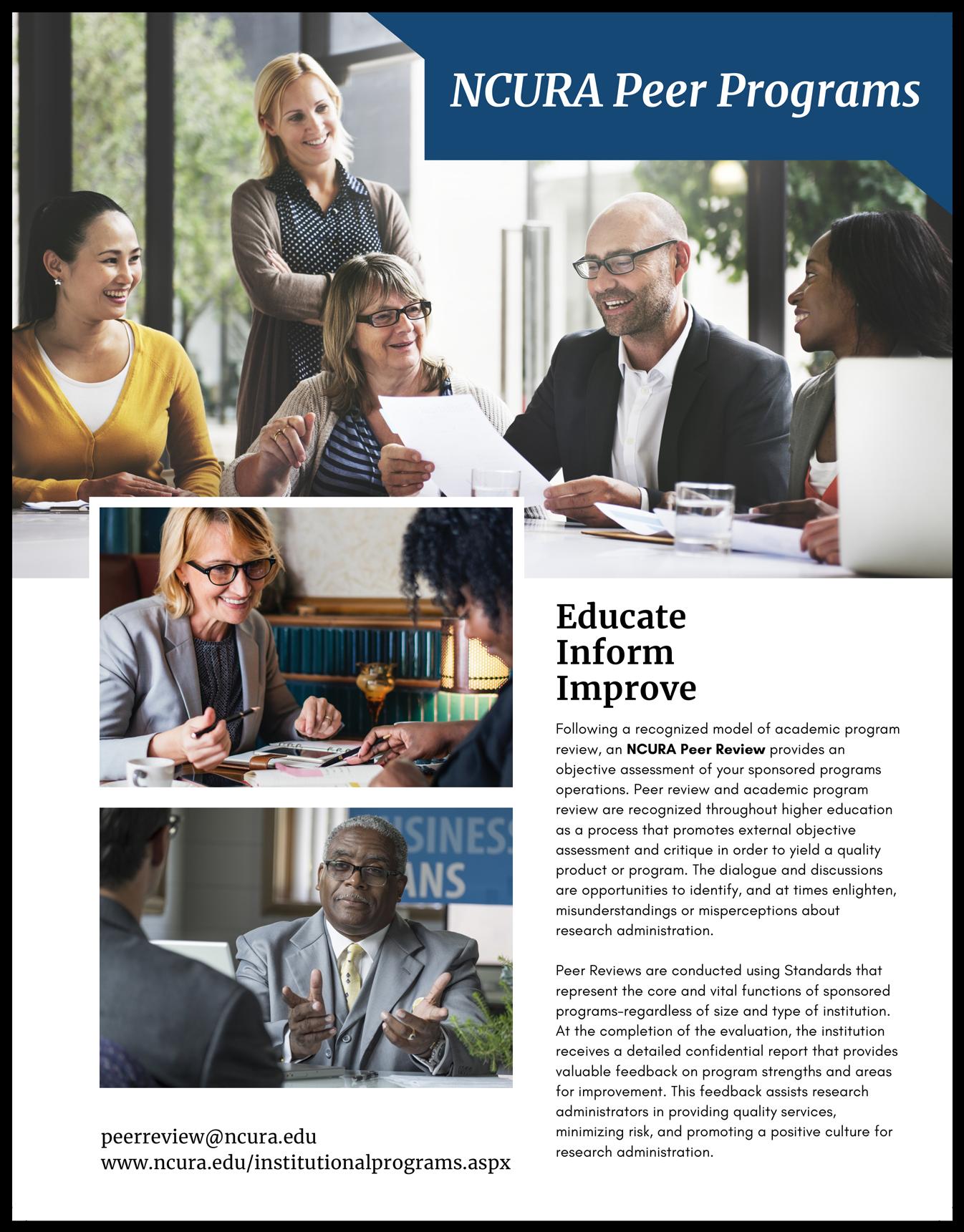


19th Annual Pre-Award Research Administration Conference
Charting New Horizons
NCURA and the PRA Planning Committee look forward to seeing you in sunny San Diego, California for the 19th Annual Pre-Award Research Administration conference. Wednesday, March 19th is the FRA/PRA shared workshop day, followed by the PRA conference on March 20th and 21st. Our theme touches on the growth and innovation that happens in the field of research administration. We are "Charting New Horizons" every day as we navigate federal policy changes, rapidly progressing research, and shifts in our workforce. This meeting promises opportunities to engage with colleagues, deepen your professional knowledge, and hopefully find some downtime to relax and enjoy the vibrant local scene.
Anchored in our theme, "Charting New Horizons," this year’s conference is designed to inspire and empower pre-award professionals of all experience levels. Whether you’re just setting sail in the field or are a seasoned captain of research administration, the PRA Conference offers a treasure trove of learning and networking opportunities.
The 2025 PRA program includes diverse tracks tailored to the multifaceted roles in pre-award administration and spans federal, departmental, financial, PUI, human capital and DEI, and research development. Our Global track highlights the interconnectedness of our profession, showcasing international perspectives and practices that broaden our understanding and approach to research administration. Our Systems/ERA/Data/AI track charts new territory by delving into cutting-edge technologies and methodologies, equipping professionals with the tools to navigate the ever-evolving digital landscape of research administration.
San Diego’s stunning coastal views, year-round sunshine, and dynamic cultural offerings make it the ideal setting for the 2025 PRA Conference. Our venue, the Hilton San Diego Bayfront, offers breathtaking views of the harbor and convenient access to key attractions such as the Gaslamp Quarter, Seaport Village, and Balboa Park, ensuring that your time in San Diego will be both productive and memorable. History buffs can tour the USS Midway or explore the historic Gaslamp Quarter, while food enthusiasts can savor Cali Baja cuisine, gastropubs, and the delights of Little Italy. Nature lovers will enjoy over 70 miles of coastline, perfect for beach sunsets, birdwatching, or even whale spotting. From sophisticated art and nightlife to an abundance of attractions, San Diego offers something for everyone. So be sure to join us in San Diego, CA for the 19th Annual Pre-Award Research Administration Conference.

Jennifer Cory Darren May

By Stephanie Alfieri, Charles Bartunek, and Jill A. Frankenfield
Negotiating a research contract can often be a multifaceted process that requires input from myriad stakeholders within your institution, as contracts associates rarely have the complete knowledge base to address the full range of issues involved. Each participant involved thus brings a unique perspective and specialized knowledge essential for ensuring that the contract meets the requirements of the institution, protects the interests of all parties involved, and adheres to all appropriate regulatory standards. It is imperative for research administrators to work within their professional network of legal counsel, financial experts, compliance officers, and principal investigators to ensure that the terms of the relevant agreement are consistent with institutional parameters. Research contracts, especially those involving public institutions or government funding, can often be highly nuanced, containing terms directed to, among others, intellectual property, confidentiality, publication rights, regulatory compliance, and financial management. Frequently, your institution will engage in projects involving multiple institutions, each of which bears its own policies and priorities. Therefore, negotiating a research contract requires a comprehensive understanding of many aspects, including legal regulations, compliance standards, ethical guidelines, and budgetary constraints. And failure to properly address these issues could lead to significant consequences for your institution and your Principal Investigator (PI).
Most institutions have offices specifically dedicated to negotiating research contracts, which are separate from their Office of General Counsel (OGC). The OGC attorneys supporting research activities typically have relevant backgrounds in intellectual property, contract
law, and compliance with government regulations, such as the Health Insurance Portability and Accountability Act (HIPAA) and the General Data Protection Regulation (GDPR).
OGC will usually be enlisted to review complex legal language when the negotiator and its related office are unsure whether the terms align with institutional policies and legal requirements. OGC may also identify potential liabilities and areas of risk and will even assume responsibility for the negotiation of particularly high-touch agreements and collaborations.
The input of OGC can be especially important when dealing with international contracts. Not only do such activities potentially expose your institution to significantly higher risk, but OGC is also more likely to be aware of international laws and regulations and any updates that directly impact the project.
Many negotiators treat the financial terms of a contract as almost an afterthought, but it is crucial to involve your institution’s financial experts in the process. These personnel analyze the budget to ensure it is realistic and aligns with the research project’s goals. They will also examine the direct and indirect costs (e.g., salaries, equipment, and overhead) to determine if the project is financially viable within the specified terms.
Financial stakeholders can also assist with evaluating the terms of funding distribution, payment schedules, and potential financial risks. For example, they can assess whether the terms adequately cover the costs of delays, equipment loss, or additional personnel required for project adjustments. They work closely with other members of the network, particularly research administrators and other proposal
development staff, the study teams, and PIs to provide a clear and comprehensive budget that reflects the actual needs of the project.
Without budgetary oversight, institutions could face unexpected costs or funding shortfalls, potentially jeopardizing the success of the research project and impacting financial health. As such, your finance colleagues ensure that the contract will provide sufficient resources for all project phases, minimize financial risk, and ensure project sustainability.
Compliance officers are vital in ensuring that the terms of a research contract adhere to ethical guidelines and regulatory standards. Research projects, especially those involving human or animal subjects, must meet strict criteria, including obtaining informed consent and ensuring data privacy and security. This also includes adherence to ethical guidelines for animal research and data security, and clauses involving Institutional Review Board (IRB) approval and the Association for Accreditation of Human Research Protection Programs (AAHRPP) language for more highrisk interventional studies. Violations and overall inability to follow proper policies could lead to regulatory fines and reputational harm, including the inability to receive sponsor funding or suspension of the project.
Additionally, compliance officers play a role in determining if there are potential conflicts of interest or issues related to dual-use (research that could be misused). They collaborate closely with legal counsel, research administrators, and scientists to create terms that promote ethical practices and protect all parties involved.
PIs bring technical expertise to the negotiation process. They offer input regarding the scope of work, which—in theory—will assist with negotiating terms that align with the research project’s contemplated scientific goals and methodologies. The PIs also provide insight into the project’s specific requirements, such as equipment, data collection methods, or unique participant needs that must be sufficiently addressed within the body of the research agreement.
The PIs should always be engaged by the negotiator regardless of the perceived complexity of the agreement, given that their work, both in the short and long term, will be significantly impacted by the clauses outlining rights to publication, data access, and intellectual property. Their role in negotiations often involves clarifying the project’s objectives, anticipated outcomes, and necessary resources, which help the other stakeholders understand the specific needs of the research and craft terms that support those goals.
Even with the above involvement, the negotiator, who serves as the bridge between the various stakeholders, is responsible for the research contract. Their role involves coordinating efforts among departments, facilitating communication, and ensuring that all parties understand the terms and implications of the contract. Contract associates often serve as the main point of contact between the institution and external sponsors, managing correspondence, organizing meetings, and keeping all stakeholders informed throughout the negotiation. Beyond coordination, contract associates are tasked with negotiating the agreement itself. They ensure that the terms align with institutional
requirements, overseeing the contract’s entire lifecycle from negotiation to execution and monitoring. Further, their soup-to-nuts understanding of the research process and administrative requirements makes them indispensable in identifying potential challenges and resolving conflicts that impact all aspects of the project. Throughout their efforts, the negotiators will work with government agencies, private sponsors, and partner institutions, each of whom may have unique priorities. As a result, the negotiator will have to nimbly manage these relationships by facilitating a transparent negotiation process and balancing the institution’s interests with the sponsor’s.
The collaboration between these diverse professionals relies on open communication and mutual understanding. Each stakeholder must be aware of their role and respect the expertise that others bring to the negotiation process. The actual contract negotiator plays a central role in streamlining and facilitating communication, organizing regular meetings, and encouraging open discussions.
Effective communication helps prevent misunderstandings and ensures that all aspects of the contract are thoroughly vetted. Without open dialogue, important details can be overlooked, leading to conflicts or issues that could have been resolved during the negotiation phase. Collaboration is also essential in building trust among stakeholders, ensuring that the contract serves the best interests of everyone involved.
The involvement of your institutional specialists in contract negotiation mitigates risks, ensures compliance, and builds a strong foundation for successful research projects. Through collaboration and communication, these professionals can navigate the intricacies of research contracts, creating terms that align with institutional goals and support scientific progress. As research becomes increasingly interdisciplinary and collaborative, the need for a diverse network in contract negotiation will only continue to grow, underscoring the importance of teamwork and shared expertise in advancing scientific knowledge and innovation. N

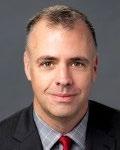
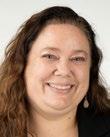
Stephanie Alfieri, Executive Director of the Institute for Clinical and Translational Research (ICTR) at Montefiore Einstein, has more than 20 years of experience managing research operations at research institutions and medical centers. She can be reached at stephanie.alfieri@einsteinmed.edu.
Charles Bartunek, JD, is the Senior Director of the Office of Collaborative and Corporate Research Contracts at The Children’s Hospital of Philadelphia. He has 13 years of research administration experience at non-profit research institutions and hospitals. He can be reached at bartunekc@chop.edu
Jill A. Frankenfield, Associate Vice President of Sponsored Programs Administration at the University of Maryland, Baltimore, has more than 20 years of experience in centrally sponsored programs administration at public institutions of higher education. She can be reached at jill.frankenfield@umaryland.edu.
Standard, Expedited, or Exempt: Can ChatGPT
Determine IRB Review Category?
Emmett Lombard, Gannon University
Exploring Marginality, Isolation, and Perceived Mattering Among Research Administrators
Denis Schulz, California State University San Marcos, Karen Gaudreault, University of New Mexico, and Ruby Lynch-Arroyo, University of Texas at El Paso
A Case Study of Research Administrator
Perceptions of Job Satisfaction in a Central Research Administration Unit at a Private University
Noelle Strom, University of Denver
Research Security and the Cost of Compliance: Phase I Report
Council on Government Relations
BOOK REVIEW: The SAGE Handbook for Research Management, 1st ed.
Chloe Brown, Texas State University
BOOK REVIEW: The Mentor’s Guide: Five Steps to Build a Successful Mentor Program, 2nd ed.
Clinton Patterson, Texas A&M University
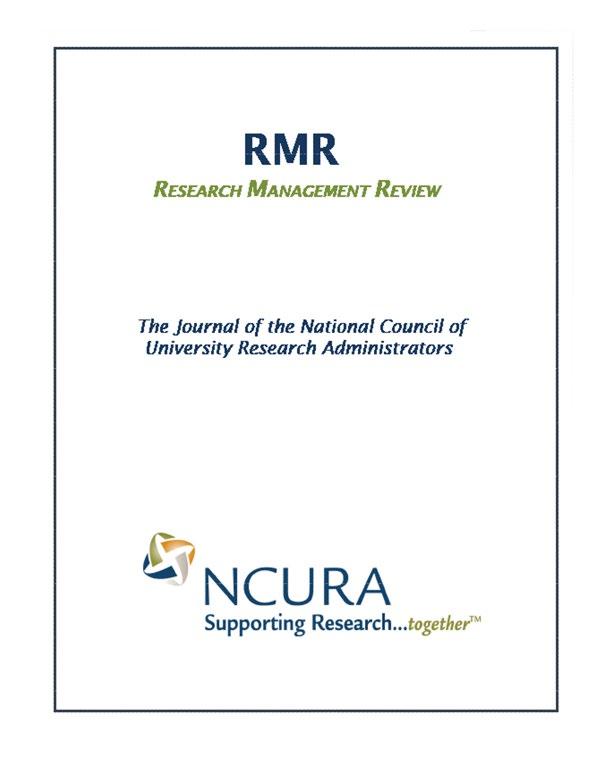
The Research Management Review invites authors to submit article proposals. The online journal publishes a wide variety of scholarly articles intended to advance the profession of research administration. Authors can submit manuscripts on diverse topics.
www.ncura.edu/Publications/ResearchManagementReview.aspx
By Laneika K. Musalini and Carpantato ‘Tanta’ Myles
The National Institutes of Health initiative, All of Us, is a research program that has made a historic effort to collect and study data from one million or more people living in the United States. The program’s goal is better health for all of us (NIH, 2021). The mission for All of Us is to accelerate health research and medical breakthroughs, enabling individualized prevention, treatment, and care for all of us (NIH, 2021).
For those unfamiliar with the All of Us research program, at the beginning of the process is nurturing partnerships for decades with at least a million participants who reflect the diversity of the United States. This leads to the goal of delivering one of the most extensive, richest biomedical datasets that is broadly available and secure, according to NIH (2021); which then leads to the goal to catalyze an ecosystem of
communities, researchers, and funders who make All of Us an indispensable part of health research.
Too often, health care is one size fits all. Treatments meant for the “average” patient may not work well for individuals. All of Us is working to improve health care through research. Unlike research studies that focus on one disease or group of people, All of Us is building a diverse database that can inform thousands of studies on various health conditions. This creates more opportunities to:
• know the risk factors for certain diseases;
• figure out which treatments work best for people of different backgrounds;
• connect people with the right clinical studies for their needs; and
• learn how technologies can help us take steps to be healthier (NIH, 2021).
Importance: What it means for research administration
The All of Us dataset is disease-agnostic and can support research on many aspects of health. This research program is building a dataset to help transform the future of health research by equipping researchers with expansive health data shared by a diverse participant cohort (NIH, 2021). Many of our principal investigators (PIs) are engaged with the data from the All of Us program. So, what does that mean for research administration? Are the data sets only for clinical research? Do the PIs need to sign a data agreement? Do the PIs need to get IRB approval? What information can the PIs share with All of Us?
Data sets are not just for clinical research. Researchers from many different disciplines can access All of Us data via the researcher workbench, which requires a data use agreement signed by an authorized organizational representative. The research workbench is a cloud-based platform where registered researchers can access registered and controlled tier data (NIH, 2024). The workbench consists of additional levels of data, workspaces, a cohort builder, and an interactive notebook environment.
Only researchers whose institutions have signed a Data Use and Registration Agreement may register for the researcher workbench (NIH, 2024). There are overarching principles intended to guide institutions and organizations in developing an appropriate data security plan to preserve data integrity. The data security and protection framework also have five cybersecurity functions: identifying, protecting, detecting, responding, and recovering (NIH, 2022). All of Us research program has rigorous security practices that help safeguard data to ensure they are protected and used ethically and responsibly by all. Thus, someone in your central sponsored programs office will need to work with PIs to gain access to the researcher workbench. Additionally, your institution will need to assign someone in the central office to review and approve the workbench user list monthly.
Researchers who use this data are not required to get IRB approval. The data that participants give to the All of Us research program is personal. Authorization for access to participant-level data in All of Us is based on a ‘data passport’ model, through which authorized researchers do not need IRB review for each research project (The All of Us, 2024). To protect this information, All of Us follow strict security protocols and processes that are regularly reviewed and updated by the Institutional Review Board (IRB) of the All of Us research program (NIH, 2024). As a single IRB, the All of Us IRB is charged with reviewing the protocol, informed consent, and other participant-facing materials for the All of Us research program. The IRB follows the regulations and guidance of the Office for Human Research Protections for all studies, ensuring that the rights and welfare of research participants are overseen and protected uniformly (NIH, 2021).
Researchers and PIs typically do not share data with All of Us but access data through the workbench. However, partner organizations may share data with All of Us. Partner organizations must show that they can meet strict data security standards before they may collect, transfer, or store information from participants (NIH, 2024).
All of Us is unique in its diversity as 77% of participants are from historically under-represented communities in biomedical research, and 46% are individuals from under-represented racial and ethnic minorities (The All of Us, 2024). Scientists anticipate that this diverse dataset will advance
the guarantee of genomic medicine for all populations. All of Us identified more than 1 billion genetic variants, including more than 275 million previously unreported genetic variants, more than 3.9 million of which had coding consequences (The All of Us, 2024). Leveraging the linkage between genomic data and the longitudinal electronic health record, genomic investigators evaluated 3,724 genetic variants associated with 117 diseases and found high replication rates across both participants of European ancestry and participants of African ancestry (The All of Us, 2024). What researchers can realize with the All of Us datasets will be groundbreaking for future generations.
For participants, All of Us is returning value by sharing participants’ DNA results, such as genetic ancestry, hereditary disease risk, and pharmacogenetics according to clinical standards, with those who wish to receive these research results. This practice can change the life trajectory of many participants and their families.
More than 1,100 reports and publications from participating researchers have also achieved research gains from the All of Us program (NIH/CDC, 2015). The publications generated include genomic and non-genomic relevance, indicating that the program is focused on significantly impacting multiple disciplines. During the program’s earlier years, there seemed to be limited data, publications, and reports generated from the work. However, since the program started, nearly 800 publications have been associated with data generated by All of Us, and close to 300 additional publications mention the program (NIH/CDC, 2015). As with most of the information related to the program, data related to publications are readily available to research administrators, researchers, and the general public. The publication database serves as a comprehensive and diverse resource for individuals and teams looking for the latest findings in precision health. The broad topics addressed by original studies include genomic research, diverse health conditions, health disparities, innovative approaches, and public health impact (NIH/CDC, 2015).
There have been notable findings related to health equality, prescribing patterns, and the effectiveness of antihypertensive medications for Hispanics and Blacks compared to White individuals. Goleva et al. (2024) found that Hispanics and Blacks could benefit from earlier interventions and personalized medication strategies. Without the data generated by the All of Us program, it would have taken several years to learn this information. Access and expanded analysis of real-world data and evidence are helping to broaden the understanding of differences based on multiple genetic, gender, and racial differences.
The diversity of the program’s participants is without comparison but will require ongoing engagement and transparent communications for continued success. Additionally, enrollment of participants, including children from diverse backgrounds, must continue alongside opportunities for enrolled participants to contribute data. According to researchers, the dataset already shows tremendous power to study several diseases. Still, it should continue to enroll up to its target of 1 million participants with genomics data to enable researchers to advance health equity through studies on key issues such as women’s health, mental health, cancer, and other common and rare diseases (NIH, 2024).
The path forward for the All of Us program includes sustainable funding, continued participant engagement, support for ancillary studies, and expanding researcher access across all sectors. The specific scientific
priorities have been identified for the next phase of the program and have been divided into three major categories. The first category is exposures and drivers of health, such as lifestyle, environment, genetics, and health inequity. The second category is causality and outcomes related to common and rare health conditions, maternal and child health, healthy aging, and resilience, and sharing results with participants. The third category is continued use and improvement of the researcher workbench (NIH, 2024).
Research administrators can help researchers collaborate with the All of Us program by facilitating access to the researcher workbench and workshops. Additionally, Research administrators should stay informed about funding opportunities and participate in collaborative events to help shape the program’s direction. This engagement would help put forward some and utilize the scientific priorities identified by the program to help researchers identify possible funding opportunities. Finally, research administrators should ensure that all research activities adhere to ethical standards and regulatory requirements, including obtaining IRB approval, where required, and following data privacy and security protocols. As with researchers, research administrators play a significant role in the All of Us program as it continues to enroll 1 million participants. N
References
Goleva, S. B., Williams, A., Schlueter, D. J., Keaton, J. M., Tran, T. C., Waxse, B. J., Ferrara, T. M., Cassini, T., Mo, H., & Denny, J. C. (2024). Racial and Ethnic Disparities in Antihypertensive Medication Prescribing Patterns and Effectiveness. Clinical pharmacology and therapeutics, 10.1002/cpt.3360. Advance online publication. https://doi.org/10.1002/ cpt.3360
National Institutes of Health. (2021 July 16). All of us research program. https://allofus. nih.gov/about
National Institutes of Health. (2021 July 16). All of us: Institutional review board. https:// allofus.nih.gov/about/who-we-are/institutional-review-board-irb-of-all-of-us-researchprogram
By Angela Wishon
In this issue, we focus on how the collective efforts of research administrators can not only advance our profession but also research. Our hot topic features NIH’s efforts to accelerate research advances and personalized medicine with its All of Us initiative. While it began in 2018, it continues to be relevant for the research administrator. Key aspects of the project are that it was designed to make it efficient and streamlined for the researcher, provide participants that their data will be handled ethically and securely; and it represents the diversity and inclusion needed to address broad health issues that impact persons differently based on their gender, race, ethnicity, and social determinants – of note 77% of participants are from historically under-represented communities.
Research administrators can leverage the oversight provided under a single IRB approval. When their investigators seek a secondary use of the data or access to the research workbench, they will not have to seek additional IRB approval as the project has a “data passport
National Institutes of Health. (2022 January 26). All of us: Protecting data and privacy. https://allofus.nih.gov/protecting-data-and-privacy/precision-medicine-initiative-data-security-policy-principles-and-framework-overview/achieving-principles-through-precision-medicine-initiative-data-security-policy-framework
National Institutes of Health. (2024). All of us: Privacy & security protocols. https:// researchallofus.org/privacy-security-protocols/#:~:text=The%20data%20that%20participants%20give%20to%20the%20All,%28IRB%29%20of%20the%20All%20of%20Us%20 Research%20Program.
National Institutes of Health. (2024). All of us: Researcher workbench. https://www.researchallofus.org/data-tools/workbench/?_gl=1%2Avzct1s%2A_ga%2AMzY5MDc2OTY5LjE3MjQ0NTAzOTk.%2A_ga_QJ5S1MNSC9%2AMTcyOTYzNzI5My43LjEuMTcyOTYzNzMzNi4xNy4wLjA.
National Institutes of Health. (2024 September 17). All of us’ advisory panel releases report on the future of the program. https://allofus.nih.gov/news-events/announcements/ all-us-advisory-panel-releases-report-future-program
National Institutes of Health/Center for Disease Control. All of Us Reports and Publications Database (2015). Retrieved 2024, from https://phgkb.cdc.gov/PHGKB/allOfUsPublicationStartPage.action.
The All of Us Research Program Genomics Investigators. (2024). Genomic data in the All of Us research program. Nature 627, 340–346. https://doi.org/10.1038/s41586-023-06957-x
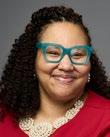
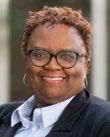
Laneika K. Musalini, EdD, is the Director for the Office of Sponsored Research & Programs at Metropolitan State University of Denver. She is a traveling workshop faculty member for Departmental Research Administration and a contributing editor for the NCURA Magazine. Dr. Musalini can be reached at lamusalini@msudenver.edu.
Carpantato ‘Tanta’ Myles, EdD, is the Associate Vice President for Research Integrity Assurance at Georgia Institute of Technology. She is the Senior Editor of NCURA Magazine and is the former chair of NCURA Region III. Dr. Myles can be reached at tanta.myles@oria.gatech.edu.
model.” Negotiating terms for the data use agreement are not necessary as the NIH has established fair terms in a simplified Data Use and Registration Agreement that institutions sign in advance so that investigators do not have to wait on contract cycle times. Finally, genomic data that is linked to longitudinal electronic health records in a secure method to meet information security requirements ensures that investigators can use datasets for years to come and answer future research questions. N
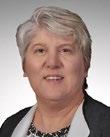
Angela Wishon, JD, is former Senior Editor of NCURA Magazine and serves as the Vice President for Research Compliance and Administration at Prisma Health. She has served as a site visitor for AAHRPP and OHRP, a CTSA Regulatory Knowledge Core Director and routinely presents on research compliance and regulatory issues. She can be reached at angela.wishon@prismahealth.org.

Grant awards and effective management are critical in fostering innovation and advancing an institution’s strategic goals in research. Managing and navigating the grant landscape can be a complex and daunting endeavor when we aim to make a significant impact in achieving the research mission of an institution. With the changing research landscape and increasing federal regulations, the role of research administrator evolves and the team managing a grant award grows especially. According to Toni Shaklee (2023), traditional research administration tasks focused on financial stewardship with the role of laboratory heads before moving in the path of professionalism.
“Today’s research administrator, while still responsible for sound financial stewardship, is also driven by increasing federal regulation and a greater need for transparency” (Shaklee, 2023, p. 476). Transparency in grant management is important due to the ever-increasing compliance responsibilities. Besides the dedicated role of the departmental research administrator, many people in departmental units are great contributors to the process of grant management. It takes the effort of a village to achieve success in departmental grant management.
Effective grant management at the departmental level requires the participation of multiple people from various units: the departmental research administrator (DRA), the grant project principal investigator, the project team, as well as contributions and support from many colleagues and stakeholders. The University of Houston Libraries is developing grant infrastructure to build processes, guidelines and policies to help library researchers navigate the complicated grant lifecycle. We have collected data from focus groups with grant relevant roles that indicates responsibilities of many colleagues from other departmental units.
By Annie Wu
• Department Financial Administrator (DFA) and Team: DFA/team are involved in grant budget preparation, financial transaction authorization, grant effort reporting certification, and cost center verification/reconciliation. The department DFA/team also assists with property/equipment acquisition, travel, and reimbursement using the grant project budget.
• Department Business Administrator (DBA) and Team: DBA/team provides support in payroll setup, hiring/recruitment of grant project personnel as well as assistance in system setup for performance evaluation of new grant project employees.
• Department Information Technology (DIT): The DIT provides technology support to awarded grant projects such as software installation, tools, systems, and storage space set-up for data management, retention, and preservation. The DIT also works with University IT on grant data management when necessary.
• Department Facility Manager: The facility manager helps with the tagging, tracking, inventory, and disposal of grant project property, including equipment and supplies.
• Department Communication Director: The department communication director is in charge of departmental events, business promotion, and communication and helps with the award announcement on various channels. They also coordinate the promotion and communication of grant project achievements.
• Department Leadership: It’s important to have approval from department administration at the beginning of the grant lifecycle. Department administration provides directions, instructions, and support to help ensure the success of a grant awarded project, especially when grant related problems and issues arise.
This joint effort is fundamental for departmental grant management. Organizing and coordinating activities with strategies and actions is very important to achieve a productive and effective effort. Guidelines and role establishment, proactive communication, transparency, relationship, and trust building are all key elements to successful departmental grant management throughout the entire grant lifecycle.
• Guidelines and Well-defined Roles and Responsibilities: Colleagues in other departmental units have their primary job responsibilities. They sometimes may not be aware of their specific roles in grant project support. Establishing guidelines and making clear roles and responsibilities can help people understand their parts and keep them on track in effectively meeting grant requirements, needs, and deadlines.
• Proactive Communication and Transparency: DRA serves in the role of primary grant manager as well as a pivotal role in facilitating and coordinating the joint efforts from departmental units, the university grant office, grant partners, sub-awardees, and community stakeholders. It is crucially important to be proactive in reaching out to relevant colleagues on upcoming grant activities to avoid delays and problems. Being transparent and timely in updating people on changes, grant status, performance, and issues can help colleagues to be on the same page to better handle problems and complete needed activities for grants.
• Building Relationships and Trust: Effective grant management involves multiple relationships between individuals, partners and stakeholders within the department, the institution, and out in the community. It can be challenging to keep people engaged in a rapidly
changing environment with increasing regulations and new initiatives. Integrate with people, understand their needs and challenges through relationship building, staff education, and effective training can help foster collaboration, trust, and reliability.
The African proverb “It takes a village…” conveys the message that we are a collaborative community and are all in it together for a common goal. As research administrator’s roles have evolved to manage increasingly complex financial, compliance, and technology requirements, collaborating with colleagues with competencies and expertise in various units in grant management can be a recipe for triumph and joy in contributing to the accomplishment of grant project goals. N
Reference
Shaklee, T. (2023). Research administration in the United States. In S. Kerridge, S. Poli, & M. Yang-Yoshihara (Eds.), The Emerald handbook of research management and administration around the world (pp. 473–481). Emerald Publishing Limited. https://doi.org/10.1108/978-1-80382-701-820231040

Annie Wu, M.L.I.S., is the Director of Librarian Grant Readiness at the University of Houston Libraries (UHL) building and implementing grant infrastructure including workflows, guidelines, and policies for UH Libraries grant management. Annie holds the rank of Full Librarian and is the Kenneth Franzheim II and Mrs. Jorgina Franzheim Endowed Library Professor. She can be reached at awu@uh.edu.
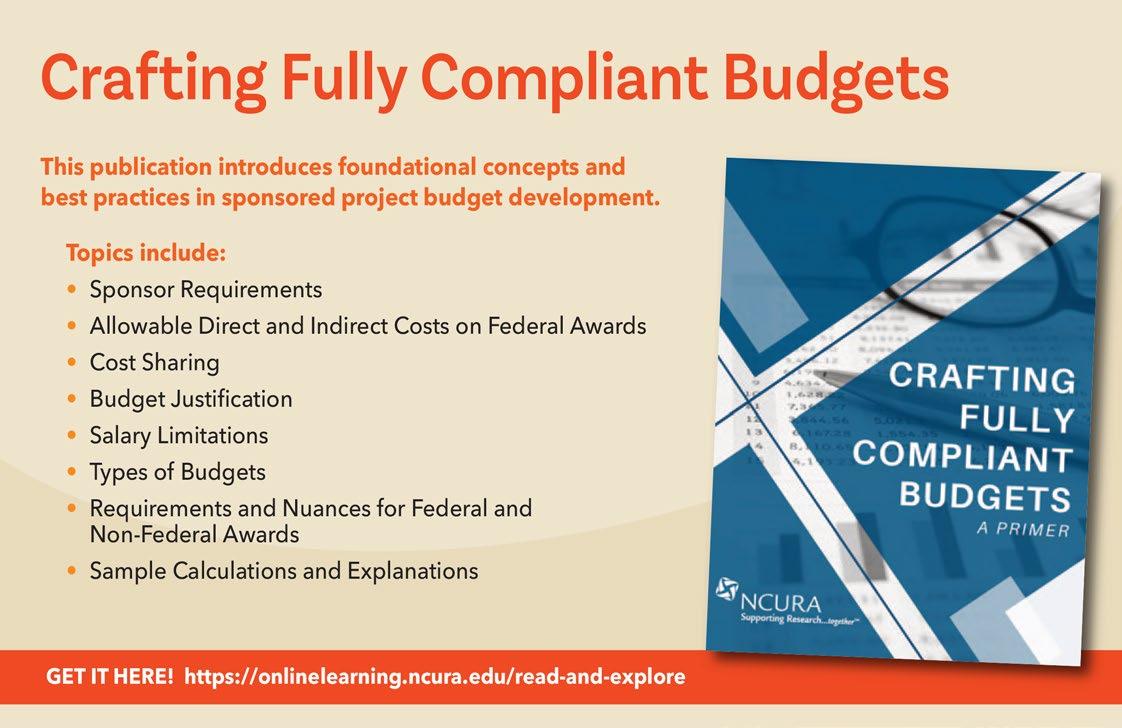



NCURA’s comprehensive resource of all the relevant regulations for grants, cooperative agreements, and contracts.
This vital reference distills more than 100 Federal Requirements to help you keep your institution and faculty in compliance. Over 200 pages of important information in an easy to use format that will save countless hours of research. Chapters include:
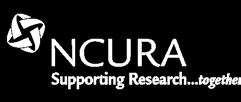



By Manouchka Jean-Gilles
Like many interdisciplinary professions, research administration is a dynamic profession that can often be difficult to explain. Research administrators (RA) engage in a broad and diverse range of activities daily, supporting institutions and faculty throughout the research process—everything from preparing and submitting proposals to managing grants and contracts. The essential skills required for success in this profession include proposal development, award administration, budgeting, compliance, financial management, systems development, and project management, along with strong communication, collaboration, and problem-solving abilities. That can be overwhelming for new RAs starting to figure out the job.
The answer to the question “What do RAs do?” can vary depending on the audience and context – further complicating issues. Many RAs will say they “fell into” the profession, or that becoming an RA was not part of their original career plan when they started college. A common theme in the career development of most research administrators is that their journey into the profession is rarely a straightforward path. Instead, it is shaped by decisions, opportunities, and unexpected twists that require quick adaptation and operational dexterity.
So, how do you plan for a future as an RA when the subject is ever evolving, and there is no clearly marked path? This article provides guidance for new and seasoned RAs on advancing their careers in research administration and explores the importance of ongoing professional development and networking, which are essential for building a successful, sustainable career in this profession.
Commit to a Career in Research Administration
Adopting that we view our work as a career rather than a job allows us to invest in ourselves and embrace a growth-oriented approach. A career


takes time to establish, as the longer you stay, the more skills you acquire and the better you get at your job. You may have fallen into the job, but once you commit to making it a career, your entire approach will shift.
Reflection is an excellent starting point when setting career goals. Take time to consider how you’ve grown as an administrator, the skills you’ve developed on the job, and the areas where you’d like to improve. Seek regular feedback from peers and supervisors, as we may not always recognize our strengths and weaknesses. Be sure to own your wins and view weaknesses as opportunities to develop or network to build a vital resource of support. An outside perspective can provide valuable insights and help critically evaluate our performance from a different vantage point.
Setting clear career goals helps ensure that you’re actively pursuing growth and advancement. These goals might include seeking a promotion, acquiring new skills, or staying aligned with the evolving demands of research administration. Any goal not structured within a clear plan is simply a dream. To turn your goals into reality, consider using the SMART framework—making them Specific, Measurable, Achievable, Relevant, and Time-bound. This approach helps ensure that your goals are actionable, and progress is trackable.
Skilled RAs are essentially an ongoing creation of continuous learning and adaptation. To remain effective, we must stay informed about evolving industry trends, emerging technologies, and policy changes, as these factors can significantly impact the landscape of research administration. In addition to acquiring new skills through professional development, RAs also build a network of peers who can offer support, mentorship, and access to valuable resources and new opportunities. Professional development creates a ripple effect that benefits individuals, institutions, and organizations.
While it’s widely recognized that mentoring offers numerous benefits to both the mentee and mentor, there are several myths about mentoring that can discourage professionals from seeking out this valuable relationship. One common misconception is that mentoring is only for younger or less experienced individuals but can benefit professionals at any age or career stage. Mentoring doesn’t have to be a formal arrangement, and mentors don’t need to be experts in the profession to offer valuable guidance and support.
Connect, Build Your Network and Find Community
In the post-COVID era of remote work, cultivating a sense of community can be a challenge. Teams are expected to collaborate effectively through impersonal Zoom meetings, and employees are asked to feel supported despite being separated by screens or communicating via chat platforms like Teams. To bridge this gap, consider connecting with coworkers on LinkedIn, engaging with their posts, or joining online communities. Becoming a member of leading professional organizations, such as NCURA, can also help build connections. Don’t let the screen be your only
connection—attend live events like conferences, where you can engage with peers, share experiences, and find renewed inspiration and motivation in person. At these professional gatherings, you can foster deeper relationships and gain fresh insights that help you thrive in your career.
In the August 2024 issue of NCURA Magazine, Minessa Konecky discusses the “Grey Area of Research Administration Boundaries.” Konecky offers 10 tips for establishing clear boundaries in research administration, emphasizing the benefits of setting limits to enhance operations and reduce burnout among RAs. Work-life integration is more relevant than ever as many RAs navigate the work-from-home environment. It recognizes the interconnected interests that often compete for our time and energy— interests that span home and family, health and well-being, career, and community. Rather than trying to separate these areas, work-life integration focuses on finding a way to coexist and support each other in a balanced, fulfilling way.
My journey into research administration began in academia, where I started as a graduate student conducting research, navigating the complexities of Institutional Review Board (IRB) compliance, teaching undergraduate courses, and presenting my work in the interdisciplinary field of American Studies. After graduating and working as an adjunct faculty in the university setting, I realized there was still more to explore in terms of my professional development. While my background in teaching, research, and academia was strong, I recognized a gap in my experience—administration. I understood that becoming a well-rounded professional would open me up to a broader range of career opportunities. Nine years ago, I was introduced to project administration, marking the beginning of my career in research administration. To this day, I continue to strive for excellence in my profession, whether by joining NCURA or volunteering at regional conferences. Since joining NCURA, I’ve found a true sense of community. At my first NCURA Regional Conference, I had the opportunity to meet some of my colleagues face-to-face for the first time, and I was welcomed at the registration table as if I were part of a scene from “Cheers”—where everyone knows your name.
I encourage us all to take proactive steps to advance our careers in research administration, whether through certification, networking, or seeking mentorship. By investing in our careers, we can contribute to the ongoing success of the research community. As dynamic as it is, research administration offers a gratifying career path. In a world of global networks, this path doesn’t have to be walked alone or without guidance—it can be cultivated and shaped. With the right tools, training, and professional network, individuals can thrive in this growing and impactful profession. N

Manouchka Jean-Gilles, PhD, is a Senior Research Administrator at Beth Israel Deaconess Medical Center with over six years of experience. She has served as co-chair of the Post-Award Track and currently co-chairs the Compliance Track for the NCURA Region I Conference Committee. She is also in the NCURA Region I Professional Development Pilot Cohort. She can be reached at mjeangil@bidmc.harvard.edu.
ORDER YOUR COPY!
Leadership and management are complicated. The “soft stuff” of managing people can be the most challenging aspect. NCURA has a new resource to help!
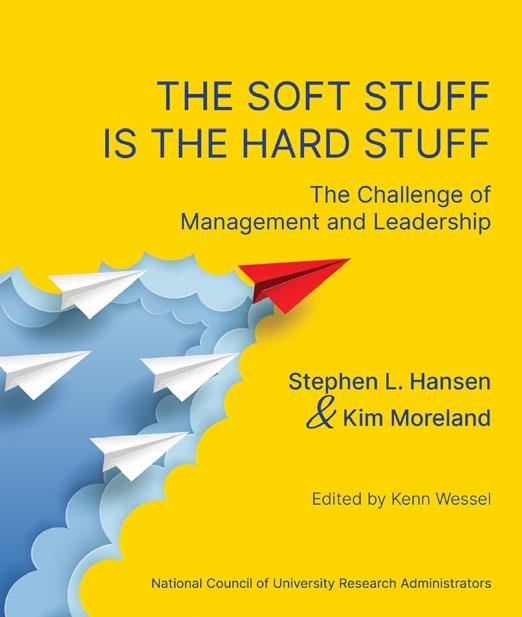
In this new publication, we discuss the principles of research administration, the art of leadership, the skills of communication, the management of personnel, and the importance of people skills.
CHAPTER 1: THE CHALLENGE OF RESEARCH ADMINISTRATION
CHAPTER 2: THE ART OF LEADERSHIP IN RESEARCH ADMINISTRATION
CHAPTER 3: COMMUNICATION: THE MOST IMPORTANT LEADERSHIP SKILL
CHAPTER 4: CIVILITY AND THE LANGUAGE OF EFFECTIVE LEADERSHIP
CHAPTER 5: KINDNESS: A COROLLARY TO CIVILITY
CHAPTER 6: WORKING WITH DIFFICULT BOSSES
CHAPTER 7: WORKING WITH DIFFICULT EMPLOYEES
CHAPTER 8: FIGHTING BURNOUT
CHAPTER 9: CLIENT SERVICES AND THE FUNDAMENTALS OF RESEARCH ADMINISTRATION
CHAPTER 10: RECRUITING AND RETAINING TALENTED STAFF
By Melinda Fischer, Simon Kerridge, Madhuri Dutta, and Cristina Oliveira

Ten years ago, the inaugural NCURA Research Program funded the first Research Administration as a Profession (RAAAP) survey. Over the years, the team has changed, and the survey has evolved, with the latest RAAAP-3 iteration deployed in 2022see the RAAAP (2024) website for more detailed background. Subsequently, the team conducted interviews with a select group of respondents to gain deeper insights into their motivations for entering the profession and the challenges they encountered along the way. Note that as this is an international endeavor, rather than the term Research Administration we are using the more generic Research Management and Administration (RMA) for the profession.
The RAAAP-3 survey was distributed through international research administration associations (Oliveira et al., 2023) including NCURA (Fischer et al., 2022). Responses revealed many themes (Dutta et al., 2023) and these have been explored with follow-up interviews conducted with a wide range of respondents from around the world:
Routes into the Profession
As you can imagine, probably from your own experiences, many interviewees discovered RMA roles serendipitously, starting in temporary or administrative positions before advancing. Some of their backgrounds included accounting, administration, and marketing. Motivations for entering the profession included job stability and financial security, seeking steady pay and a positive work environment.
Transferable skills, like adaptability and managing diverse teams, also played a critical role, with individuals from arts and humanities successfully applying their expertise. Several interviewees reported their networking and professional associations such as NCURA provided essential support and development opportunities. These varied pathways and experiences demonstrate that there is no singular or primary route to a fulfilling career in RMA.
Interviewees highlighted several challenges faced during their early years as RMAs, with a significant issue being the lack of structured training and support. They indicated that self-learning was the primary method to manage their work portfolios at that time. The interviewees recommended that practical training, coupled with mentorship or guidance, would be highly beneficial for early-career RMAs. This approach may have helped them navigate the steep learning curve associated with understanding the regulations, policies, and processes relevant to research management and administration. Another challenge identified was the lack of understanding of the RMA profession by other staff members, such as academicians. This was linked to a general lack of awareness regarding the various job titles held by RMA staff.
Interviewees highlighted the evolution of their professional identity within the profession of RMA. For many, the journey involved a gradual shift, while for others it marked a more transformative realization of their role within the research ecosystem.
Many RMAs began in administrative or support-focused roles, often unaware of the broader scope of their responsibilities or the potential for strategic involvement. Over time, exposure to the complexities of research funding, compliance, and project management allowed their professional identities to expand and mature. A recurring observation was the lack of initial clarity regarding the term "Research Administrator" itself, with individuals discovering their fit within this category after engaging in professional networks or attending conferences. A notable factor influencing professional identity was participation in international associations and mentorship programs, which provided a sense of belonging and a clearer understanding of the profession’s scope.
A significant area of dissatisfaction among the interviewees was the lack of recognition for this profession, unlike more traditional fields such as accounting. This lack of visibility has resulted in challenges for career progression and made the profession a lower priority for policymakers. The interviewees suggested that developing academic courses and qualifications specific to this profession, similar to other professional streams, could better establish it as a recognized career choice.
Additionally, reductions in team size due to the global economic downturn have significantly increased the workload for current RMAs. This has forced them to focus on bureaucratic and repetitive tasks rather than strategic planning. Another area of concern is job insecurity and instability, as the career is heavily dependent on the volatile environment of research funding.
Thinking back on what they might have done differently, many RMAs emphasized the importance of engaging with professional networks and associations earlier in their careers, recognizing the support and knowledge these communities provide. Others wished they had approached the role more strategically from the start, developing technical and transferable skills and focusing on long-term career growth.
Most interviewees affirmed that they would still choose to be an RMA, citing the satisfaction of supporting research and contributing to scientific advancement. The variety and complexity of the profession were seen as key factors in maintaining their enthusiasm over the years.
When recommending the profession to others, RMAs described it as ideal for individuals who are curious, adaptable, and committed to collaboration. Essential skills identified included financial literacy, strong communication, and critical thinking, alongside values such as perseverance, integrity, and a commitment to learning.
For aspiring and developing RMAs, the advice was clear: engage with professional organizations, seek mentorship, and pursue relevant training. Staying informed and maintaining a flexible approach were also highlighted as crucial to success in this dynamic and rewarding profession.
Building on the findings from the RAAAP surveys, the need for exploring the professional identity and values of RMAs was recognized. These are being looked at as part of the Research Administration Professional Identity values Scale (RAPIdS) project - you can check out the self-analysis tool on the RAPIdS (2024) website: https://bit.ly/RAPIDSTool.
The eagle-eyed among you will have noted that the RAAAP-3 survey took place in 2022, and runs every three years, so expect the RAAAP-4 survey to arrive in your inboxes sometime early this year. Please try to find some time to take the survey so that we can keep building this international picture of our incredible profession. Thank you in advance!
We are truly grateful to the 5,076 people who responded to the RAAAP-3 survey, and in particular the eight individuals who agreed to be interviewed —we have drawn on their input greatly for this article (randomly ordered): Suzan Lund, Rita Gusmão, Rhys Denton, Mir Asghar Ali Khan, Juliana Juk, Judit Fekete, Josephine Amuron, and Bontle Moleme. If you would be interested in participating in an interview following the RAAAP-4 survey, please remember to include your contact information.
ESSENTIAL SKILLS IDENTIFIED INCLUDED FINANCIAL LITERACY, STRONG COMMUNICATION, AND CRITICAL THINKING, ALONGSIDE VALUES SUCH AS PERSEVERANCE, INTEGRITY, AND A COMMITMENT TO LEARNING.
References
Dutta, M., Oliveira, C. I., Fischer, M., & Kerridge, S. (2023). Routes into research management and administration. In S. Kerridge, S. Poli, & M. Yang-Yoshihara (Eds.), The Emerald handbook of research management and administration around the world (pp. 125–140). Emerald Publishing Fischer, M., Kerridge, S., Dutta, M., Oliveira, C. (2022). RAAAP is Back… Again! HIBARMA – How I Became a Research Manager and Administrator, NCURA Magazine 54(1), 24-25.
Oliveira, C. I., Fischer, M., Kerridge, S., & Dutta, M. (2023). The research administration as a profession (RAAAP) survey. In S. Kerridge, S. Poli, & M. Yang-Yoshihara (Eds.), The Emerald handbook of research management and administration around the world (pp. 113–123). Emerald Publishing.
RAAAP. (2024). RAAAP Website. https://sites.google.com/view/raaap [accessed 13th November 2024].
RAPIdS. (2024). RAPIdS Website. https://sites.google.com/view/ncurarapids [accessed 18th November 2024].
About the Authors
MF, SK, MD, CO contributed equally to the conceptualization, writing–original draft, and writing–review and editing, according to the CRediT definitions.

Melinda W. Fischer, CRA, CPRA, Grants Administrator & Manager, College of Education, Clemson University. Melinda is the PI for the NCURA sponsored RAPIdS project, Co-PI on RAAAP, and Co-PI on an NSF GRANTED project focused on enhancing research administration infrastructure for ERIs in SC, SC-REACH. She also served as regional editor for North America on the recently released Emerald Handbook of Research Management and Administration Around the World. She can be reached at melindf@clemson.edu. Orcid ID: 0000-0003-1503-3369



Simon Kerridge, BSc, DProf, Founder, Kerridge Research Consulting, in the UK. Simon leads the RAAAP projects, is an advisor for RAPIdS, and RM ROADMAP, and was co-editor of the Emerald Handbook of Research Management and Administration Around the World. He can be reached at s.r.kerridge@kent.ac.uk. Orcid ID: 0000-0003-4094-3719
Madhuri Dutta, PhD, Head, Centre for Operational Research CORE India at George Institute for Global Health. Madhuri is a DBT/Wellcome Trust Indian Research Management Initiative IRMI fellow. She is Co-PI on RAAAP and has an interest in capacity building and research impact assessments. She can be reached at mdutta@georgeinstitute.org. Orcid ID: 0000-0002-7220-151X
Cristina Oliveira, MSc, Executive Research Manager of the MagIC Research Centre, NOVA Information Management School (NOVA IMS). Cristina is an active contributor to the Platform for the Professionals at the Interface of Science (PIC, the Portuguese RMA network), the WP leader on training and development in the RM Roadmap project, a member of the BESTPRAC network, and one of the Co-PIs of the RAAAP project. She can be reached at coliveira@novaims. Orcid ID: 0000-0002-0887-7961.

By Stephen Tersoo Orafa
Being a Research Administrator has been intriguing as well as challenging. I became a research administrator by accident. I joined the Center for Translation and Implementation Research (CTAIR), College of Medicine, University of Nigeria, Nsukka, in 2021 and I was introduced to the profession of research administration for the first time. Thrilled by the all-important role of research administration in the vast landscape of academic and scientific pursuit and recognizing the myriad opportunities and the potential for growth within this profession, I decided to fully embrace and pursue it as my profession. The zesty desire to enhance knowledge and to contribute to scientific advancement has continually watered and sustained my interest in the profession, driving me to explore every opportunity available to me with unwavering dedication.
As I navigate the complex web of research administration, many aspects that were once unclear to me as an onlooker have become very clear. It became crystal clear that research administration encompasses a wide array of functions, including grant writing, project management, financial oversight, regulatory compliance, and dissemination of research findings. Research administrators are the unsung heroes who ensure that researchers can focus on their scientific endeavors without being overwhelmed by administrative burdens. They act as intermediaries between researchers, funding agencies, and institutional stakeholders, ensuring that projects are wellfunded, compliant with regulations, and executed efficiently.
However, the question of the identity of research administration remains unanswered. The identity of research administration remains terra nullius–a territory yet to be fully claimed or defined. It is unclear whether research administration should be classified as science, social science, or humanities. Unlike other academic professions that are rooted in a specific field of study, research administrators often come from varied backgrounds. They
might have degrees in science, engineering, humanities, social sciences, or business. This diversity brings a wealth of perspectives but also contributes to the profession’s identity crisis. Research administration lacks the formal educational pathways and professional development structures that are common in other professions.
The multidisciplinary approach of research administration leverages the strengths of different disciplines to provide more thorough, innovative, and adaptable solutions to complex problems:
1. Business and Management: Research administrators adopt principles from business management, such as budgeting, financial planning, human resources, and strategic planning. These skills are crucial in securing funding, managing grants, and ensuring the efficient use of resources.
2. Science and Technology: Understanding scientific principles and technological advancements is essential for administrators to support researchers effectively. This knowledge enables them to provide relevant resources, facilitate collaborations, and stay abreast of emerging trends.
3. Law and Ethics: Compliance with legal and ethical standards is a cornerstone of research administration. Administrators must navigate complex regulations, such as those governing human subjects, animal subjects, data privacy, and intellectual property, to protect both researchers and participants.
4. Humanities and Communication: Effective communication and interpersonal skills are vital for administrators to liaise between various stakeholders, including researchers, funding agencies, and institutional
leadership. The ability to convey complex information clearly and persuasively is paramount.
They act as intermediaries between researchers, funding agencies, and institutional stakeholders, ensuring that projects are well-funded, compliant with regulations, and executed efficiently.
Again, research administration involves professionals from various academic backgrounds, each bringing distinct skill sets and diverse experiences. Effectively addressing the complex challenges in this profession relies on harnessing this broad range of expertise. Integrating the varied perspectives and specialized knowledge of these professionals, research administration can address multifaceted issues with greater depth and innovation. Moreover, research administration exposes Research Administrators to different skills in different academic fields thereby enhancing their overall skills and capabilities. This cross-disciplinary engagement not only enriches their professional capacity but also fosters a more comprehensive understanding of the complexities involved in managing and supporting research initiatives.
In addition, all academic disciplines, whether they are science, engineering, humanities, social sciences, or business are engaged in the same kind of
activity; that of uncovering the unknown and expanding the frontiers of knowledge. Thus, the question of whether the discipline belongs to any academic discipline is less significant. Each field, despite its unique methods and focus, is driven by a common goal - to explore, understand, and address questions and challenges that lie beyond current knowledge. This shared objective underscores that the classification of a discipline as belonging to a specific academic category is secondary to the universal endeavor of inquiry and discovery. The essence of academic work transcends disciplinary boundaries, emphasizing that the quest for knowledge is a collective pursuit. Whether through empirical research, theoretical exploration, or practical application, all disciplines contribute to expanding the frontiers of understanding. Therefore, the specific academic classification of a discipline is less significant than its role in advancing human knowledge and solving complex problems.
In conclusion, research administration, as terra nullius, stands at the intersection of multiple disciplines, requiring a blend of skills from business, science, law, and humanities. While this interdisciplinary nature contributes to the profession’s identity crisis, it also offers opportunities for growth and professionalization. It is, therefore, safe to focus on the relevance of the profession to the central question of the pursuit of knowledge and liberation from ignorance. N

Tersoo
MA, serves as a Research Administrator at the University of Nigeria Teaching Hospital, Nigeria. He is also the administrative assistant at the Nigeria Implementation Science (NISA), Abuja, Nigeria, and a member of the National Council of University Research Administrators (NCURA). He can be contacted at Stephen.orafa@unn.edu.ng.
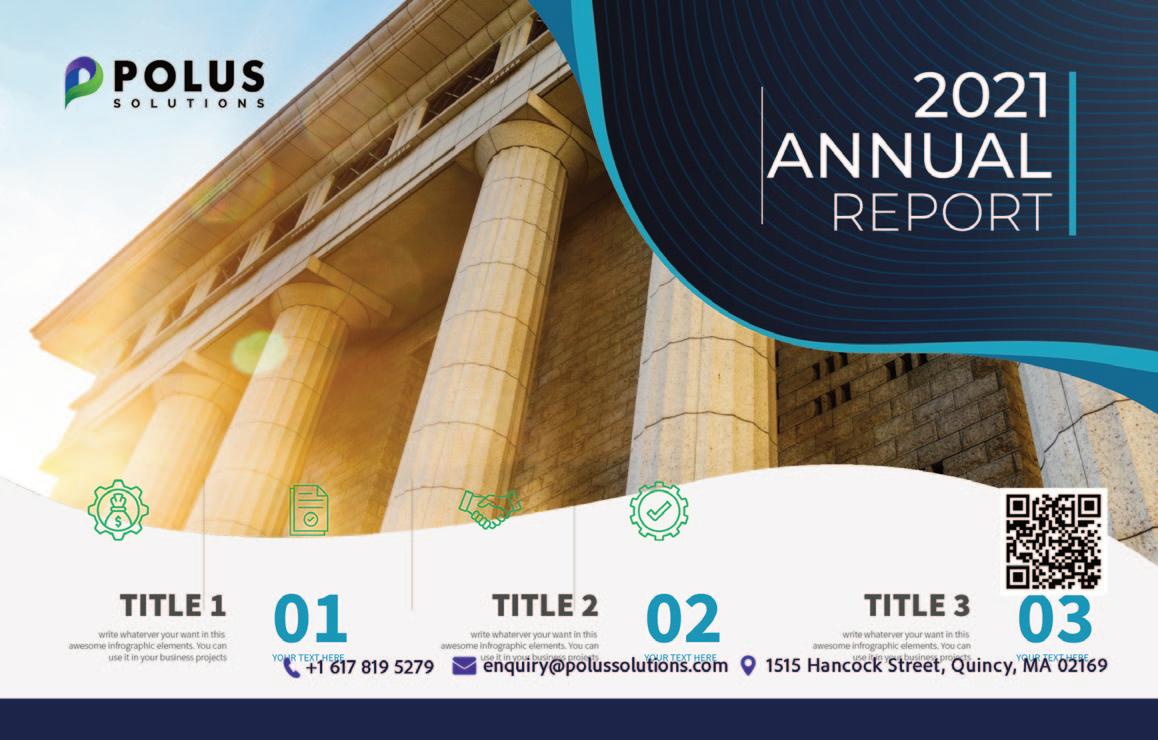








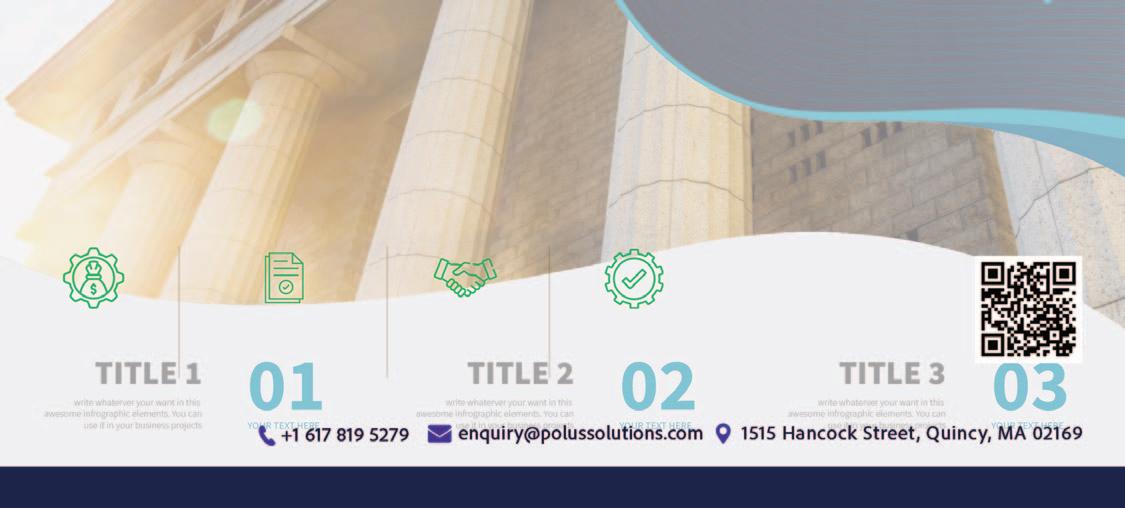
By Megan A. Bergeron, Abby Guillory, Sam Mombou, Stephanie Rodriguez-Makhlouf, and Noelle Strom
Pursuing a doctoral degree while working full-time is an ambitious endeavor that tests both one’s perseverance and resilience. In this article, five NCURA members—Abby, Stephanie, Sam, Megan, and Noelle—share their personal experiences of pursuing a doctoral degree while working as a research administrator. They discuss their motivation to enroll, the challenges they faced, surprising discoveries, and the rewards of their journeys. Their stories provide insights into navigating the complexities of pursuing advanced education alongside professional commitments.
The NCURA members featured in this article are as follows:
Megan Bergeron, PhD
Graduation Date: December 2022
Doctoral institution: University of Louisiana at Lafayette Degree program: Applied Language & Speech Sciences
Abby Guillory, EdD doctoral student
Expected graduation date: July 2025
Doctoral institution: University of Louisiana at Lafayette Degree program: Educational Leadership – Higher Education Administration
Sam Mombou, PhD
Graduation date: August 2024
Doctoral institution: Purdue University Degree program: Higher Education
What motivated you to enroll in your doctoral program?

Stephanie Rodriguez-Makhlouf, EdD doctoral student
Expected graduation date: Summer 2027
Doctoral institution: University of Central Florida Degree program: Educational Leadership – Higher Education
Noelle Strom, EdD
Graduation date: August 2023
Doctoral institution: University of Denver Degree program: Higher Education
Each participant entered their doctoral program with a different motivation, but they shared a common passion for growth. Abby sought to advance in higher education, while Stephanie envisioned a future in university leadership. Sam desired a deeper understanding of policy and governance, and Megan aimed to improve research administration processes. Noelle saw her program as an opportunity to lead as a scholar-practitioner. The thread connecting them all is a drive to contribute meaningfully to the field of higher education.
Abby: I knew I wanted to continue working in higher education administration, and I've always been interested in earning a doctorate degree and pursuing my own research. Having worked with grants for years, pursuing my own research was always of interest to me.
Stephanie: I have always wanted a doctorate. I decided to study Educational Leadership in higher education because that is where I want my career home to be–a university. I could not imagine a community with more to offer or a better mission.
Sam: After working for several years in research administration, I realized that while I had a solid understanding of operational aspects, there was a greater need for strategic insight into how a higher education institution functions, especially in areas like policy, governance, and leadership. I wanted to deepen my understanding of these elements to better navigate the challenges institutions face and to contribute to more meaningful changes within the system.
Megan: I was driven by a passion for advancing research administration and helping to create better processes for faculty and institutions to navigate complex research landscapes. I saw firsthand the need for deeper knowledge to lead initiatives that could truly make a difference.
Noelle: I like to joke that I enrolled in my doctoral program because my institution has a nice lap pool at the gym. And when you’re a full-time grad student, you get into the gym for free. But really, I enrolled because I want to be a thought leader in research administration by driving progress as a scholarpractitioner.
What did you find surprising about being a doctoral student?
The surprises along the doctoral journey were diverse among the participants. For Sam, it was the evolution of his perspectives and critical thinking. Megan was taken aback by the emotional challenges, particularly the imposter syndrome she experienced. Balancing responsibilities while managing feelings of self-doubt and overwhelm made the journey emotionally complex, but also empowering. Each participant found themselves navigating unexpected personal and professional transformations along the way.
Stephanie: The amount of work. It was a shock.
Sam: One thing that surprised me about being a doctoral student was how much my thinking and perspectives evolved over the course of the program. While I expected to gain new knowledge and skills, I didn’t anticipate just how much my mindset would shift. The process of engaging deeply with research, theory, and critical discussions pushed me to challenge my assumptions and approach problems from new angles.
Megan: A surprise was the emotional aspect of the journey—imposter syndrome crept in at times, and I didn’t expect the degree of self-doubt I would experience, particularly when balancing so many responsibilities. Not only that but overall feelings of overwhelm, exhaustion, and defeat, those feelings were hard to deal with. However, looking back, the experience helped me realize how strong I actually am.
not only academic prowess but also
What did you find challenging about being a doctoral/ student/candidate?
Balancing the competing demands of career, academics, and personal life was the most common challenge. Stephanie struggled to manage her career, coursework, and family responsibilities. Noelle found writing her dissertation to be particularly difficult, experiencing moments of self-doubt. Each participant faced a unique set of hurdles, but they all emphasized the importance of self-care, boundary setting, and perseverance in overcoming these challenges.
Stephanie: The most challenging aspect of being a doctoral student has been balancing it all – my career, my courses, my family, and myself. It has not been easy or natural, and I have had to make some changes to help me do it all. I started a health program that I committed to prioritizing. I also gently created boundaries with friends and family and stopped agreeing to every opportunity that came my way. Several months later and I feel like I might be able to do this.
Noelle: Writing my dissertation was the most challenging. I spent weeks during data analysis feeling like I was making no progress and was just fumbling around in the dark. I had to emotionally psych myself up to hear any feedback on my drafts because I felt so fragile.
What did you find rewarding about being a doctoral student/ candidate?
Despite the challenges, the rewards were plentiful. Megan found immense satisfaction in balancing motherhood, work, and academia, knowing that her daughters witnessed her determination. Abby cherished the relationships and knowledge gained from collaborating with colleagues across different areas of the university. The participants universally agreed that completing milestones toward their degrees brought a deep sense of accomplishment.
Abby: I learned so much from my colleagues in other areas of the university through my program! I had the pleasure of being in a cohort with leaders in all areas of the university.I learned about their backgrounds and their experiences. It helped me to gain a big picture view of the work of the university and how all the units working together moved us forward.
Megan: One of the most rewarding aspects was the sense of accomplishment with each milestone, knowing that I was contributing to a field that I care deeply about. Balancing a full-time career, motherhood, and my studies was challenging, but it was also immensely gratifying to see my hard work pay off. It was important for my daughters to see their working mother tackle and conquer something as significant as a doctorate. I wanted them to understand that big goals are attainable with perseverance and dedication.
What would you do differently as a doctoral student?
Reflecting on their journeys, the participants shared what they would have done differently. Sam wished he had started networking earlier, while Megan emphasized the importance of setting boundaries and allocating time for self-care. The shared advice across the board was to be mindful of personal well-being and to seek out collaborative relationships sooner rather than later.
Sam: I would start networking and collaborating earlier in the program. While I focused heavily on my own research and coursework, I realize now that building a stronger professional network within the academic community and engaging with peers more frequently could have provided additional perspectives and support.
Megan: I would be more proactive in setting boundaries and allocating time for self-care. I often felt the pressure to be perfect in every aspect—work, home, and school—leading to burnout. If I could do it again, I would establish a more sustainable routine, ask for help more often, and prioritize rest without feeling guilty.
Abby: I do not think I would change anything. This was my journey. It is not what I wanted it to look like or what I expected when I started the program, but I have learned lessons along the way that I would not give up for an earlier completion.
What advice do you have for current doctoral students/candidates?
The participants’ advice speaks to the resilience required to complete a doctorate. From Abby’s reminder to keep pushing forward to Megan’s call for grace and self-compassion, their collective wisdom emphasizes that the journey is just as important as the destination. Success in a doctoral program requires not only academic prowess but also mental fortitude and self-awareness.
Abby: Keep going. If you finish quickly, great! If it takes you longer, that is ok, but do not let the negative thoughts make you quit.
Stephanie: Know that the workload ebbs and flows, but you will get through the tough times if you keep putting one foot in front of the other.
Sam: Embrace the journey with patience and resilience, knowing that the process is as important as the end result. Doctoral studies can be challenging and, at times, overwhelming, but it is essential to stay focused on the long-term goal while also giving yourself grace when things do not go as planned.
Megan: Give yourself grace. Pursuing a doctorate is a marathon, not a sprint, and there will be ups and downs. Remember that everyone’s journey is unique. There is no single “right” way to get a doctorate, and it is okay if your path looks different from others. Life does not stop while you are working toward your degree, so embrace the journey and celebrate each victory, no matter how small.
Noelle: Remember that the skills to complete a doctoral degree are like those of an endurance athlete–you need resilience, consistency, and tenacity. You must grit your teeth and put in the work even when you are not in the mood. You can expect discomfort and fatigue from pushing yourself. If you get intimidated by thinking about how far you still must go, just breathe. Break the distance up into smaller sections and take it one step at a time.
The journey of pursuing a doctorate while working full-time is undoubtedly one of the most demanding challenges a person can face. However, as demonstrated by fellow NCURA members, it is also an incredibly rewarding journey. Their experiences highlight the strength, adaptability, and dedication it takes to succeed both in academia and in professional roles. For those who are considering or already on a similar path, know that while the challenges may seem daunting, the personal and professional rewards make the journey worthwhile. As with any challenge, the key to success lies in perseverance, self-compassion, and the ability to embrace the unexpected twists and turns along the way. N




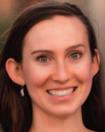
Megan A. Bergeron, PhD, CRA, is a graduate of Louisiana State University, Clemson University, and the University of Louisiana at Lafayette. She is an active NCURA member and a Senior Research Development Officer at Texas A&M University (TAMU). Megan’s responsibilities at TAMU include leading large-scale proposal development, team science initiatives, and strategic research collaborations. She can be reached at megan.bergeron@tamu.edu.
Abby Guillory, MLIS, CRA, is the Assistant Vice President for Research Enhancement at the University of Texas Rio Grande Valley. Abby is an active NCURA volunteer, nationally and regionally, through her presentations, publications, and committee work. She also serves as NCURA Traveling Workshop Faculty. She can be reached at Abby.Guillory@UTRGV.edu.
Sam Mombou, PhD, MBA, CRA, serves as the Director of Sponsored Programs at the University of Nebraska Lincoln (UNL). His responsibilities include policy development and implementation, as well as overseeing pre-award processes, award acceptance and negotiation, and post-award activities. He can be reached at kmombou2@unl.edu.
Stephanie Rodriguez-Makhlouf is the Associate Director of Sponsored Programs – Pre-award Office at the University of Central Florida. She has leadership experience in sponsored programs administration at both foreign and domestic institutions. Her interests include innovative approaches to process refinement, professional development, and creating access. She can be reached at Stephanie.R.Makhlouf@ucf.edu.
Noelle Strom, EdD, MBA, CRA, is the Director of External Funding in the College of Arts, Humanities & Social Sciences at the University of Denver. As a scholar-practitioner, Dr. Strom’s research interests include optimizing operational efficiency, advancing research administration practices, and enhancing the research ecosystem within higher education institutions. She can be reached at Noelle.Strom@du.edu.

By Lisa Mosley

In the increasingly complex landscape of research administration, effective partnerships and collaborations are critical for success. The National Council of University Research Administrators (NCURA), the Council on Governmental Relations (COGR), and the Federal Demonstration Partnership (FDP) play instrumental roles in fostering such collaborations, supporting institutions, and advancing the profession of research administration. These organizations enhance the efficiency, compliance, and overall impact of research through their collective efforts.
National Council of University Research Administrators (NCURA)
NCURA is dedicated to advancing the profession of research administration. It provides its members with professional development opportunities, resources, and a platform for networking. Through conferences, publication resources, workshops, and webinars, NCURA equips research administrators with the knowledge and skills they need to navigate the ever-changing regulatory landscape and manage the complexities of research administration effectively.
Partnership and collaboration are at the heart of NCURA's mission. By bringing together professionals from diverse institutions, NCURA fosters an environment where best practices are shared, innovative solutions are developed, and challenges are collectively addressed. This collaborative spirit ensures that research administrators are well-equipped to support their institutions' research goals while maintaining compliance with regulatory requirements.
Council on Governmental Relations (COGR)
COGR is an association of research universities, affiliated medical centers, and independent research institutes in the United States. Its primary focus is on the intersection of research policy and government regulation. COGR advocates for policies that promote research, innovation, and education, and works to ensure that federal regulations are reasonable and effective. Collaboration is a cornerstone of COGR's approach. By engaging with federal policymakers, agencies, and other stakeholders, COGR helps shape research policy in ways that benefit the research community. The organization provides a forum for its members to discuss and develop unified positions on policy issues, ensuring that the collective voice of the research community is heard. This collaborative approach not only strengthens individual institutions but also enhances the overall US research enterprise.
The FDP is a unique forum composed of federal agencies, academic research institutions, and research policy organizations. Its mission is to
reduce administrative burdens associated with federally funded research while maintaining accountability and ensuring compliance with federal regulations. The FDP achieves this by piloting innovative administrative processes and sharing best practices across its membership.
The collaborative nature of the FDP is one of its greatest strengths. By bringing together representatives from federal agencies and research institutions, the FDP facilitates open dialogue and mutual understanding. This partnership allows for the identification of administrative inefficiencies and the development of streamlined processes that benefit both grantors and grantees. The FDP's collaborative projects and pilot programs have led to significant improvements in research administration, demonstrating the power of partnership in achieving common goals.
The synergy created by the collaboration between organizations like NCURA, COGR, and FDP is evident in the positive impact they have on the profession of research administration. Each organization brings unique strengths and perspectives to the table, and their combined efforts lead to a more cohesive and effective research administration landscape. Together, they create a comprehensive support system that addresses the multifaceted challenges faced by research administrators. This collaborative ecosystem ensures that research institutions can focus on their primary mission of advancing knowledge and innovation, while also maintaining compliance and accountability.
The importance of partnership and collaboration in research administration cannot be overstated. Organizations like NCURA, COGR, and FDP play vital roles in fostering these collaborations, supporting research institutions, and enhancing the overall effectiveness of research administration. Through their collective efforts, these organizations help ensure that the research enterprise remains robust, innovative, and capable of addressing societal challenges. As the profession of research administration continues to evolve, the collaborative spirit exemplified by NCURA, COGR, and FDP will remain essential to its success. N

Lisa Mosley is the Executive Director of the Office of Sponsored Projects at Yale University. She has over 25 years of experience in research administration and has worked in a variety of positions in both central administration and departmental. Lisa is an active volunteer for COGR, FDP, and NCURA. She can be reached at lisa.mosley@yale.edu.
By Kayla Guilford and Samantha Montgomery
In October 2023, the Office of Management and Budget (OMB) proposed updates to the Uniform Administrative Requirements, Cost Principles, and Audit Requirements for Federal Awards (2 CFR Part 200). Since then, OMB has gathered extensive public feedback and input from federal agencies to refine, clarify, and modernize the guidance. The final guidance was published on April 22, 2024, with technical corrections published on October 1, 2024. These revisions mark the most significant changes to the Uniform Guidance since it was first established in 2014.
The final guidance, which includes raising certain thresholds impacting indirect cost (IDC) rate calculations and applications, took effect for awards issued on or after October 1, 2024. However, not all Institutions of Higher Education (IHEs) may be able to implement these changes immediately. Any changes that the IHE wants to make that affect Modified Total Direct Costs (MTDC) should be implemented in conjunction with the IHE’s next IDC proposal (Federal Register). >>
Reference/SubjectChange
§ 200.1 | Subawards and MTDC Redefine MTDC to include uptothefirst$50,000 (previously $25,000) of each subaward and exclude any amount in excess of $50,000.
§ 200.201, § 200.313, §200.439 | Equipment Capitalization
Increase threshold of equipment capitalization from $5,000 to $10,000 1
1 Recipient may elect to use lower threshold than $10,000.
Updated definitions per 2 CFR part 200.1 (changes bolded for emphasis):
MTDC means all direct salaries and wages, applicable fringe benefits, materials and supplies, services, travel, and up to the first $50,000 of each subaward (regardless of the period of performance of the subawards under the award). MTDC excludes equipment, capital expenditures, charges for patient care, rental costs, tuition remission, scholarships and fellowships, participant support costs, and the portion of each subaward in excess of $50,000 (Federal Register).”
Equipment means tangible personal property (including information technology systems) having a useful life of more than one year and a per-unit acquisition cost which that equals or exceeds the lesser of the capitalization level established by the non-Federal entity recipient or subrecipient for financial statement purposes, or $10,000 (Federal Register).
The IHE must have the MTDC and capitalized equipment definitions updated in their rate agreements before implementing any changes. Federal cognizant agencies for indirect costs will not reopen currently predetermined IDC rate agreements to incorporate the threshold changes. For example, an IHE with predetermined rates through 2028 cannot implement new changes until the new rates are negotiated, starting from 2029 and onward. The IHE submitting an IDC rate proposal that would like to request the threshold changes should include the impact of the changes in their next proposal submission. If an IHE is seeking a rate extension rather than submitting a new IDC rate proposal, they should request to change thresholds by submitting an impact statement with a rate extension request to their cognizant agency. The purpose of the impact statement for either the equipment or subaward threshold impact analysis is to assess how changing these thresholds might affect the IDC rate for the IHE. So, how might these changes affect the IDC rate?
1) Sponsored expenditures previously classified as equipment between $5,000 and $10,000, and subawards below the new threshold of $50K will be included in the MTDC base (denominator) for IDC rate calculations. The increased MTDC base will produce downward pressure on the calculated IDC rate.
2) Depreciation for non-sponsored equipment purchases between $5,000 and $10,000 will no longer be included for recovery in the IDC rate calculation. The decrease in equipment depreciation costs (numerator) will also apply downward pressure on the calculated IDC rate.
3) The undepreciated balance for equipment below the new threshold could be written off and amortized over the term of the next IDC rate agreement, providing relief to offset the impact of the decline in equipment depreciation for the short-term.
What is needed to conduct the impact analyses? There are several data elements that can assist in modeling this impact, including the following:
1) Schedule of new subawards and spending over the last 3 (three) fiscal years to estimate the additional dollars that will be added to the base by increasing the spending from $25K to $50K.
2) Current equipment schedule that details for each asset: cost, year of acquisition, annual depreciation, net book value (undepreciated amount), and funding source for the equipment. This will allow you to calculate the new depreciation cost pool, evaluate the current year expenditures that would be included in MTDC, and determine the write-off amount for the undepreciated balance.
3) The most recently calculated IDC rate showing the total amounts for the indirect cost pool(s), the direct cost base(s), and the allocation ratios to research (if multiple rates are calculated). This will help to support the sensitivity analysis when layering in the impacts to the pool(s) and base(s) for each threshold change that is being evaluated.
The goal of the equipment threshold impact analysis is to assess how changing the equipment capitalization threshold might affect the IDC rate. To conduct this analysis, the IHE should model the impact using a single fiscal year and identify equipment with acquisition costs between $5,000 and $10,000, along with their funding sources, to determine the appropriate treatment in the model. To gauge the impact on the IDC rate, the IHE should rerun their rate calculations, incorporating the changes to depreciation and other expenses.
The aim of the subaward threshold impact analysis is to assess the effect on various bases, such as Organized Research and Other Sponsored
!"#$%$&'()&(*+,-"+"')(./0"%/&-1(*'#0"2%"%
!"#$%#&'()*"+),&-,$+)&%.&+$/#)/"0#) +$/"1$+2
3$.4/$.)'.5&%&0#+'#&1$)64+.$%) #")#+'/7)'%.)5'%'-$)84+/,'0$0) "*)&#$50
9#+$'5(&%$.)8+"/4+$5$%#)*"+) 84+/,'0$0)6$(":)#,$)%$:) #,+$0,"(.

+,%)-"(.$&-,%)*
3$1&0&%-)8"(&/&$0)'%.)8+"/$.4+$0 ;%'(2<&%-)=>?)+'#$)%$-"#&'#&"%)#&5&%@1'(4'#&%-)020#$5A($1$()/"%*&-4+'#&"%0) B8.'#&%-)64.-$#)-4&.$(&%$0)'%.) #$58('#$0 C"%&#"+&%-)08"%0"+)'-$%/2) &58($5$%#'#&"%)8('%0)'%.)'00$00&%-) &%0##&"%'()+$'.&%$00
It may not be prudent for every
change the thresholds in the immediate term, or at all.
could make tracking the increase to MTDC thresholds difficult. Potential accounting system challenges include programmed limitations on the number of new accounts that can be created, or the system requires a manual entry for capturing the additional costs. These, along with current university policies and processes, need to be considered when determining the next steps in deciding if or when to implement these updates.
Universities can elect to not increase the capitalization threshold because of current state legislative requirements. Universities that are agents of their respective states are typically obligated to follow the current capitalization policies set forth by state requirements. Legislative requirements mandated by the state impact the threshold a university is obligated to follow therefore impacting the ability to move forward with these threshold changes.
The MTDC base change creates a unique situation recovering allowable direct costs between $25,001 and $50,000. Depending on how an institution decides to implement, when approved to do so, there could be some logistical difficulties in identifying and accounting at the higher threshold. To accomplish this, accounting systems should be flagged with new account information that is being utilized for those awards starting on or after the transition date. These updates, along with updated resources and information to campus end users, create a clear point-in-time that shows the transition to the higher threshold. Identifying and capturing data accurately when that transition occurs is important for several reasons. For instance, accurate accounting ensures that the institution is recognizing and receiving recovery for the appropriate amount of costs. Additionally, having the threshold transition identified clearly will support the financial statements during audits.
Activities. To conduct this analysis, the IHE should identify the expenditures for each subaward by fiscal year, determine which year(s) the $25,001$50,000 range occurs for potential addition to the base, and calculate the base increase. To determine the overall impact, the IHE should recalculate each component using the new base, which includes the original base plus the additional base due to the subcontract threshold change.
Increasing thresholds offers several advantages, namely the potential for higher indirect cost recovery and reduced administrative burden. Additional cost recovery can be achieved by applying the IDC rate to new expenses within the base, such as items previously classified as equipment valued between $5,000 and $10,000, and subcontracts between $25,000 and $50,000. An overall increase in total cost recovery is possible if future rates remain unaffected. The IHE will no longer need to track and manage purchases of items previously classified as equipment in the $5,000 to $10,000 range as rigorously as before. Additionally, raising the equipment threshold will streamline the procurement process for purchases below the new threshold.
As this new guidance is implemented, the IHE should take the following steps:
1) Revising institutional policies and procedures, such as those related to allowable costs, procurement, capital equipment, and IDC;
2) Reviewing and analyzing the timing of IDC rate negotiations to apply updated thresholds for equipment and subaward inclusions in MTDC;
3) Evaluating system-level configurations in financial systems/ERPs to accommodate threshold changes in cost categories, if applicable;
4) Updating proposal budget guidelines and templates to align with changes in direct costs and IDC; and
5) Monitoring sponsor agency implementation plans and assessing institutional readiness.
Universities have multiple considerations to assess when reviewing the changes to MTDC and their equipment capitalization policies. For instance, legislative regulations at the state level could make it impossible to raise the capitalization threshold, or accounting system functionality limitations
The decision to proceed or not with the threshold changes included in the Uniform Guidance updates should be made with input and consideration from key stakeholders within the IHE. It may not be prudent for every institution to change the thresholds in the immediate term, or at all. Those that choose to implement an increase in one or both thresholds should document the processes in place to support the transition and ensure they are integrated into the IHE’s regular internal control framework. This will mitigate some of the risk that accompanies change management, while achieving the benefits of reduced administrative burden and a potential for increased cost recovery. N
References
Federal Register. (2024, April 22). Guidance for federal financial assistance. Federal Register. www.federalregister.gov/documents/2024/04/22/2024-07496/guidance-for-federal-financialassistance#sectno-reference-200.1
Office of Management and Budget. (n.d.). Uniform administrative requirements, cost principles, and audit requirements for federal awards (2 CFR Part 200). Electronic Code of Federal Regulations.www.ecfr.gov/current/title-2/subtitle-A/chapter-II/part-200?toc=1

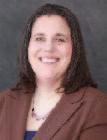
Kayla Guilford serves as a Senior Associate in the Education and Research practice at Huron Consulting Group. In this capacity, she supports universities, colleges, and hospitals with their indirect cost rate (IDC) calculations for research. She can be reached at kguilford@hcg.com.
Samantha Montgomery has 11 years of state and local government audit experience, where she specialized in federal compliance. After leaving public accounting, she has worked in higher education for almost five years. She can be reached at smontgomery@uky.edu.




• Advanced Online Networking Search: based on areas of responsibility and expertise
• Online Member Directory: to connect with your peers
• Collaborate: NCURA’s Professional Networking Platform, including discussion boards and libraries sorted by topical area
• Automatic membership in your geographic region
• NCURA’s Resource Center: your source for the best of NCURA’s Magazine, Journal, YouTube Tuesday and Podcast resources, segmented into 8 topical areas
• 10% discount on tuition to JHU’s Master of Science in Research Administration program
• NCURA Magazine: new issues published six times per year, and all past issues available online
• Sample Policies & Procedures
• NCURA Magazine’s e-Xtra and YouTube Tuesday delivered to your inbox each week
• Special member pricing on all education and products
• Podcasts and session recordings from our national conferences
• Access to and free postings to NCURA’s Career Center
• Leadership and Volunteer Opportunities
• Scholarships for Graduate Education in Research Administration
• NCURA Fellowship Program: apply to travel to an organization in another part of the world to learn and support global collaborations

By Tine Heylen and Lott Peers

Do you recognize that particular research administrator (RA) feeling of nervous excitement? You receive an email from one of your researchers about the plan to submit a proposal to a private foundation sponsor; one that you – as was to be anticipated – have never heard of before. Both thoughts of anxiety and joy rush through your brain, whilst a generous feeling of curiosity keeps you alert. What’s finding its way to you this time?
In today’s rapidly evolving research landscape, securing funding is more competitive and complex than ever before. Within this research economy, the presence of private foundation sponsorship has strongly increased over the last decade. Since philanthropic often fund cutting-edge research in niche areas of study that may divert greatly from the priorities of government grants, they create unique windows of opportunity. In parallel, this interesting player gives rise to specific challenges for research institutions, since managing private foundation funding can feel like taking a plunge in the unknown. Such private sponsors, both large and small, US and non-US based, might use different wording than the public funding sector. Additionally, again unlike standardized governmental funding schemes, these funders tend to impose foundationspecific requirements; requirements that can vary widely. This mandates RAs to be resilient, critical, and flexible.
Over the years at KU Leuven R&D, we have defined some key risk areas, as well as practical strategies when it comes to private foundation research. By developing an understanding of compliance,
institutional alignment, as well as legal and financial management, RAs can help their institution to capitalize on the opportunities these sponsors provide while avoiding potential pitfalls.
First things first, an apparent, yet decisive question to ask yourself as an RA is: what precisely is the new thing we’re looking at in our mailbox here? The private sector tends to be creative with its vocabular. Terms like “grant,” “award,” “gift,” “fellowship,” “R&D contract” are often used interchangeably. Like many institutions, at KU Leuven we have different offices dealing with the many faces sponsored research can present itself as. Therefore, identifying the nature of the contract is an essential first step. That being said, the main hurdle in solving this question often resides in the fact that the information being provided to you is simply too limited in order for you to make an informed decision. A good practice here is to proactively ask your funder for subsequent detailing for as long as any unclarities remain.
The primary challenge, however, that privately funded research brings along is compliance with, and assessment of sponsor specific terms and conditions. Each foundation may have its own set of widely varying criteria related to project scope, reporting deadlines and templates, specific legal and financial constraints (e.g. grants in foreign currencies), revenue sharing requirements and other expected outcomes. Non-compliance, even if unintentional, can result in loss of funding, reputational damage, or the inability to secure future grants. This means that a diligent review and understanding of the unique expectations of each sponsor is crucial. At KU Leuven R&D, we prefer to analyse these terms and conditions thoroughly already at pre-award stage. By conducting a comprehensive risk assessment early on
While foundations may not always be open to extensive changes, many are in fact willing to work with research institutions to find mutuallysolutions.beneficial
in the application process, potential roadblocks are being identified, and, thus, future surprises avoided. Based on this assessment, we might advise our researchers to adapt their application’s focus. In exceptional cases, we might offer a negative submission advise due to incompatible or unfavourable terms.
This risk assessment is a complex exercise as there are many different perspectives to take into account: your institution’s interests, local legislation, the sponsor’s terms, sustainable research growth, as well as a PI’s particular vision. These are all different pieces that form part of this risk assessment puzzle. Therefore, additional input from other institutional experts might be required. Since our grants office is embedded within the Tech & Knowledge Transfer Office of the university, we have the unique opportunity to collaborate easily with different types of research support offices. Hence, where needed, the RA will involve IP, legal, data and/or finance experts into the conversation. Additional checks with institutional leadership, the principal investigator, as well as the sponsor might also be required. As international grants advisor it is our role to connect the different stakeholders and facilitate this process. Communication–as it is so often–is key here.
In addition, RAs need to be prepared to negotiate terms and conditions. Before we submit any application, it needs to be clear which terms are negotiable and which are not. If any uncertainty remains, then we make
sure to communicate to our researcher that accepting the funding will depend on mutually agreed terms. Negotiation might include seeking more flexible budget allocations, better terms on indirect costs, or clarifying data sharing and intellectual property rights. While foundations may not always be open to extensive changes, many are in fact willing to work with research institutions to find mutually beneficial solutions. What is more, we believe that stressing your institutional concerns and dealbreakers to private sponsors is also important in the long run, given precisely the increased importance of private players. Clear communication helps both parties to better understand one another, and, thus, potentially help build interesting new models for privately funded research.
Given the variety in private foundation sponsors requirements, for now, a one-size-fits-all approach to compliance is often insufficient. This means that at KU Leuven R&D we assess terms and conditions for every new proposal and project. In the end, the needs of each specific research project are unique as well and need to be taking into account simultaneously. All of that, ultimately, asks a lot of flexibility from an RA and all other involved research support offices. At KU Leuven R&D, we aim to develop customized compliance frameworks tailored to each foundation’s specific needs. These frameworks include tracking mechanisms for reporting and its deadlines, foreign currency managing plans, expenditure monitoring, and adherence to project outcomes. By instituting a clear compliance structure, the RA can mitigate risk while streamlining the management of multiple foundation grants.
Private foundation funding presents both opportunities and challenges for research institutions. As the role of private foundations in research continues to expand, RA’s who are proactive in identifying and addressing potential challenges will be best positioned to set up their institutions for success. Through understanding key risk, ensuring institutional alignment, careful planning, effective communication, and strategic negotiation, ultimately, you will be able to translate your initial feelings of nervous excitement into a true foundation of success. N


Tine Heylen is Senior Advisor European and International Projects at KU Leuven Research & Development in Belgium. Tine's responsibilities include pre and post award management. Tine is also Chair-Elect 2024 of Region VIII. She can be reached at tine.heylen@kuleuven.be.
Lotte Peers works as an Advisor European and International Projects at the KU Leuven Research & Development in Belgium. Lotte’s responsibilities cover both pre- and post-award management. She can be reached at lotte.peers@kuleuven.be.
Reduce administrative burden and allow your research teams to focus on innovation and discovery.
Huron helps research institutions:
• Improve pre- and post-award efficiency
• Enhance award and portfolio oversight
• Effectively manage subaward complexities
• Modernize research compensation compliance
• Enhance research administration training and education
• Lead your enterprise through change
• Manage immediate and long-term staffing needs
• Leverage cloud solutions for improved efficiency
Learn how the research administration experts at Huron can help you put possible into practice across your research enterprise.
Connect with our research administration team: huronconsultinggroup.com/expertise/research-enterprise

By Olive Giovannetti

Not to be dramatic, but NCURA has changed my life. It has introduced me to new colleagues (even friends), provided learning and mentoring options, offered me ways to grow professionally and personally, and opened my eyes to career trajectories I didn’t know were possible when I was an early-stage research administrator.
I’ve met several colleagues at various NCURA conferences, including the annual, Pre-award Research Administration (PRA), Financial Research Administration (FRA), and regional conferences. I’ve also had the honor of presenting at NCURA conferences with people from my institution, people I knew at other institutions, and people I met when NCURA paired us together (because our abstracts were so similar).
Some of the colleagues NCURA paired me with were from U.S. institutions; others were from non-U.S. institutions. What a gift to work with professionals I’ve never met, who share the same passion for research administration and have the chance to collaborate and discuss our institution’s ways of obtaining funding, which sponsors and government funding agencies are most prominent in any given region or country, and learning about similar and differing challenges based on location, culture, federal or institutional support.
Learning how research administration in other countries is conducted is useful. It allows me to have a broader understanding of why specific collaborators create budgets the way they do (i.e., their government pays faculty salaries, so including those salaries on our National Institutes of Health (NIH) budget would be double-dipping, which is unallowable). It also helps me to understand why approaching them to request a subcontract packet within two weeks of a deadline just isn’t possible (routing requirements at various levels inside and outside of their institution, or their country closes down for July).
Nineteen years ago, in my first administrative role at my institution, I was responsible for processing travel reimbursements, reconciling petty cash reimbursements, and arranging travel to/from Kampala and Mbarara, Uganda. This exposure to reviewing receipts and understanding the importance of timely reconciliation for payment—while also recognizing "the importance of a thorough and compliant review”—made me realize that my role could impact humans and research halfway across the world. If I took too long, their petty cash reserves would diminish impacting their ability to cover payroll, pay bills, and conduct research. In this entry-level role, I was a part of global research!
In my next role as a research administrator, I supported a Principal Investigator (PI) who did a lot of work with researchers in Brazil. My PI was keen to share cultural and professional insights and even paid for a Portuguese language instructor to come to our office weekly to teach us Portuguese as well as the demographics and culture that make Brazil a vibrant country. This additional instruction helped me build robust relationships and communications with research administrators and faculty in Brazil (don’t get me wrong, I was not fluent enough to email my colleagues solely in Portuguese, but I was able to send well wishes and salutations in Portuguese and read their responses while discussing the business needs in English).
In 2017, I was fortunate to participate in the NCURA Global Mentorship Program, which paired mentors from U.S. institutions with mentees from institutions around the world. We first met at the 2017 Annual Meeting in
Washington, DC, where we had pre-conference sessions for introductions, to learn more about the mentorship program, and to begin working on our goals and objectives as a cohort.
During the program, we stayed in close contact with our mentees/mentors, checking in regularly via Skype. Coordinating across time zones—balancing the needs of participants from the United States, Europe/Africa, and Australia— was often a logistical puzzle, but it was worth every early or late meeting. Ultimately, we all learned that many of our challenges as research administrators were the same, no matter the differences in our systems.
After the mentorship program, I was motivated to apply for the NCURA Global Fellowship Program. I was awarded the fellowship, which allowed me to visit my mentee’s institution and gain firsthand experience of their research administration practices.
“Not to be dramatic, but NCURA has changed my life.”
Arriving halfway across the world, I walked through the labs and offices of my mentee and her university colleagues. This experience underscored the importance of seeing research administration environments from the ground up. I shared insights on NIH policies and other U.S. sponsors while learning about Australian grant funding structures and how their offices support domestic and international research. These exchanges of knowledge and practices created a strong professional bond, and I left with a deeper appreciation for the complexities of supporting research globally.
Reflecting on the theme of “All of Us,” I realize that NCURA’s commitment to fostering connections among research administrators worldwide has been crucial in building a strong, collaborative global community. My experiences with NCURA’s global initiatives have demonstrated that we collectively create a network that uplifts and advances the research administration profession. The network of individuals I’ve met—from Uganda to Brazil to Australia and beyond—has offered new perspectives, fresh insights, and innovative solutions that I bring back to my institution.
The NCURA community’s commitment to professional development, knowledge sharing, and global partnerships has empowered me to support researchers with a broader perspective and a deeper understanding of the diverse, international research landscape. Ultimately, the success of NCURA and the advancement of the research administration profession rely on the collective efforts of “All of Us”—the individuals across institutions and borders who contribute their time, expertise, and passion. N

Olive Giovannetti, Team Manager & Grant Officer, Proposals and Grants, in the Office of Sponsored Research at the University of California San Francisco, is responsible for leading a team in proposal management and award processing to ensure compliant sponsored activities. They are also a previous NCURA Global Fellowship Program recipient. They can be reached at olive.giovannetti@ucsf.edu.
In 2025, NCURA will be bringing its Traveling Workshop Series to a city near you!
For current information on open workshop registrations, please visit our website here.


Contract Negotiation & Administration
Departmental Research Administration
Financial Research Administration
Level I: Fundamentals of Sponsored Projects Administration
Level II: Sponsored Projects Administration



LOOKING TO FOSTER MORE COLLABORATION AND ENGAGEMENT WITH YOUR TEAM?
NCURA is pleased to o昀er in-person and virtual On-Campus Traveling Workshop trainings. Visit our On-Campus website here or email Gabby Hughes, hughes@ncura.edu to learn more today!
By Helen Brazier-Mitouart, Abby Guillory, and Emily Devereux
Our research institutions are growing, developing new initiatives, and are excited about new opportunities. This means we all experience change and are part of reaching the desired goals. Effective and successful organizational change management includes timely training and education of all stakeholders. Training is critical for effective implementation and sustained knowledge and understanding.
Communities Supporting Change Communities need to evolve regulations, technological advances, and institutional policies or systems. This fast-paced dynamic means that the training content and media used must match the pace of change. Educators and learners must remain engaged, connected, and ready for new learning opportunities and challenges. In our research industry, this adaptability isn’t just beneficial—it’s essential. What else could be expected of our community serving cutting-edge research?
Tips for Success:
• Keep standard operating procedures, manuals, training videos, guides, websites, and other resources up to date to ensure users have timely references when changes are made.
• Make sure old resources are removed from libraries and websites.
• Schedule some time on a quarterly basis to review these materials or portions of these materials to make revisions and adjustments as needed.
• Develop short checklists and videos to remind employees about the main highlights of the new processes; it can complement official and more lengthy Standard Operating Procedures and policies for better compliance.
• Regularly invest in this process, making it less overwhelming and keeping new resources at the forefront.
Training Ensures Success
A robust educational foundation is vital to the success of the research enterprise. Through comprehensive training and knowledge-sharing, research administrators develop the expertise to navigate complex grant applications, compliance requirements, and project management challenges. By investing in quality education and continuous training, institutions strengthen their capacity to maintain research compliance and manage funding effectively while fostering a thriving research environment. This culture of learning and improvement energizes the entire research community, from innovative idea generation to project execution.
Tips for Success:
• Communicate training and resources as they are rolled out.
• Request feedback on needs from your research community and allow that to influence what is offered.
• Find ways to offer previously provided training for those unable to attend, whether as a short-term video or long-term resource that benefits your institution.
• Always be on the lookout for upcoming changes to anticipate their implementation more effectively.
Training fosters enhanced technical competence and broadens precious qualities like flexibility and openness to improved processes by implementing new systems through collaboration. Education programs strengthen these essential skills individually and across our research communities— whether faculty and researchers, departmental research administrators, or central offices’ stakeholders. This ripple effect cultivates a collective resilience and shared capacity to grow new skills and contribute effectively to the research enterprise. Together, employees become better equipped to face exciting innovations and daunting setbacks with more confidence.
• Communicate proficiencies and competencies addressed in programs from education and training related to research administration.
• Offer monthly research management panels with multiple offices to discuss and troubleshoot common issues and opportunities.
• During training roll-out, emphasize how employees’ flexibility and adaptability are greatly appreciated by the organization.
From a leadership perspective, education and training are not only a tactical necessity but should rather be seen as a strategic framework that can foster and sustain cohesiveness across departments. Leaders who champion education and training create frequent opportunities for the workforce to connect, engage, and think about new possibilities. All members can appreciate through training how their contribution to the change meaningfully supports other departments and units’ activity and, ultimately, the research organization’s values and mission.
• Create a tiered system for training and education to include all levels, from novice to senior leadership, in research administration training and updates.
• Create diverse advisory committees combining central and departmental research administration leadership with operational units (procurement, travel, IT) to review policies, identify barriers, and develop innovative solutions.
• Use pedagogy to address diverse roles and applications and apply it to a leadership perspective for senior-level buy-in.
• Emphasize that training sessions are an excellent opportunity for all employees to connect with each other and realize how interconnected they are.
We all have different responsibilities in our organizations and work interdependently. Training and education are valuable opportunities that recurrently bring everyone to a common table and keep us moving forward together through change and growth! N

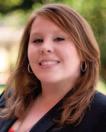

Helene Brazier-Mitourart, PhD, is the Education Manager in the Office of Education and Training in Research Administration at Weil Cornell Medicine, Cornell University. She teaches a research administrator mentoring program. Helene is passionate about serving her community’s learning needs so everyone can thrive. She has been a proud NCURA member since 2020. She can be reached at herb2020@med.cornell.edu.
Abby Guillory, MLIS, CRA, is the Assistant Vice President for Research Enhancement at the University of Texas Rio Grande Valley. Abby is an active NCURA national and regional volunteer through her presentations, publications, and committee work. She also serves as NCURA Traveling Workshop Faculty. She can be reached at abby.guillory@utrgv.edu.
Dr. Emily Devereux, CRA, is the Office of Research Training Director and Vice President for the University of South Carolina flagship and system campuses. She implements strategic training and coaching programs for both faculty and staff, including competitive proposal development programs for faculty and tiered training programs and certifications for research administration staff. She has more than 20 years of experience and has authored numerous journal articles and columns in research administration. She can be reached at devereue@mailbox.sc.edu.

The requirements for documenting compensation charges to federal awards are complicated - we have a new resource to help!
This resource provides the framework for understanding the federal requirements for documenting compensation charges to federal awards and the complexities in meeting the requirements, as well as the implications and potential repercussions if not met.
Topics include:
• Requirements of supporting salary charges
• Determining what constitutes compensation
• Documentation and Internal Controls
• Issue and Risks
• Common Audit Findings
• Other considerations
• Example of internal control framework for compensation compliance
By Saraf Salim
October 17, 2024, the U.S. Department of Health and Human Services (HHS) Office for Human Research Protections (OHRP) and the Food and Drug Administration (FDA) Office of Clinical Policy (OCLP) co-hosted a live public webinar to hear from research ethics professionals and the public about differing approaches to measuring institutional review board (IRB) effectiveness in protecting human subjects in research.
The webinar was part of OHRP’s and FDA OCLP’s efforts to address the fourth recommendation in a 2023 report by the U.S. Government Accountability Office (GAO), GAO-23-104721, INSTITUTIONAL REVIEW BOARDS: Actions Needed to Improve Federal Oversight and Examine Effectiveness (U.S. GAO, 2023). The recommendation in the report provided the following:
The Secretary of Health and Human Services should ensure that OHRP and FDA convene stakeholders to examine approaches for measuring IRB effectiveness in protecting human subjects and implement the approaches as appropriate. These could include effectiveness measures; peer audits of IRB meetings and decisions; mock protocols; surveys of IRB members, investigators, and human research participants; or other approaches.
The convened panel included five distinguished speakers who discussed four possible approaches to measure IRB effectiveness. The approaches were informed by previous discussions OHRP and FDA OCLP had with the regulated community on the topic and included: (1) post-approval monitoring to verify compliance with IRB requirements, relevant regulations, and institutional policies; (2) accreditation and peer review; (3) the experience of study participants; and (4) the quality of IRB deliberations. Each speaker gave a presentation before participating in a panel discussion in which members of the public had the opportunity to contribute their thoughts and ask the speaker questions. Opening remarks were provided by Karen Giardiello, Supervisory Regulatory Counsel for FDA OCLP, who presented the webinar topic and welcomed speakers for the event. Holly Taylor, a Research Bioethicist at the Clinical Center of the National Institutes of Health (NIH), moderated the webinar and set the stage by noting that the challenge of measuring IRB effectiveness is not
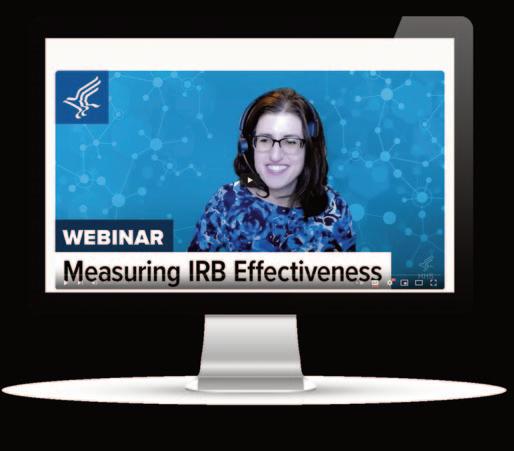
“IRBS CAN ONLY BE EFFECTIVE IF THEY ARE PART OF AN EFFECTIVE HRPP PROGRAM AND COMMUNICATION AND COORDINATION ARE CRITICAL FOR IRBS TO FULFILL THEIR MISSION.”
new and discussed how desirable IRB outcomes can be subjective and amorphous, which makes them hard to operationalize as measures.
The first speaker, Rachel Lally, Assistant Vice President for Research at the Pennsylvania State University, reported on efforts her institution has taken to streamline IRB review and consider how their efforts may impact IRB effectiveness and suggested that while IRB effectiveness may not be the same as efficiency, consistency in the process may be relevant for an IRB to be effective. Nichelle Cobb, Senior Advisor for Strategic Initiatives for the Association for the Accreditation of Human Research Protection Programs (AAHRPP), reflected on her organization’s assessment of the effectiveness of human research protection programs (HRPPs). Dr. Cobb presented data from a survey of accredited organizations and suggested IRBs can only be effective if they are part of an effective HRPP program and communication and coordination are critical for IRBs to fulfill their mission.
Benjamin Mooso, IRB Director at the University of California San Diego and co-chair for the Executive Committee of the Consortium for Applied Research Ethics Quality (CARE-Q), discussed the peer review process CARE-Q provides and explained that reviewers assess an IRB’s effectiveness
through a risk-based approach to the review of studies and the burden on IRB staff, and perform a needs assessment for potential improvements.
Luke Gelinas, the Senior IRB Chair for Advarra, explored the role of participant experiences as a measure for IRB quality, and cautioned that this may be unreliable due to a gap between IRB review and how study personnel may conduct the approved protocol, Dr. Gelinas also mentioned it is important to consider that participants may have negative experiences due to a variety of factors that are unrelated to an IRB’s review or within their control.
The last presentation was given by Laura Stark, Associate Professor at the Center for Medicine, Health, and Society at Vanderbilt University, who discussed the dynamics of decision-making and approaches to studying IRB deliberations. Dr. Stark, who in 2012 authored the book Behind Closed Doors: IRBs and the Making of Ethical Research in which she interviewed members of three IRBs and a sample of IRB Chairs, discussed how IRB members used “warrants” when justifying their expertise or statements during IRB deliberations and that the same protocol reviewed different decisions by different IRBs but often each IRB is fair through their own established local precedents. She noted that studies of IRB effectiveness should consider the impact of warrants and local precedent on the quality and effectiveness of IRB decision-making.
During the panel discussion, Dr. Taylor invited panelists to reflect on next steps in how IRB effectiveness could be measured and discuss components of effectiveness, if regulatory compliance is enough, and the role of the researcher in IRB effectiveness and protecting participants. The speakers suggested more information is needed on the impact of the
HRPP and the IRB on study conduct and the need for consensus on what is meant by “effectiveness.”
Overall, the speakers noted the importance of collaboration and resource support to promote IRB effectiveness beyond regulatory compliance efforts. They emphasized the necessity of trust between research teams and IRBs for IRB effectiveness to support good science and protect research participants.
The speakers’ biographies, slides, webinar recordings, and summary reports are available on OHRP’s website. N
Disclaimer: The opinions expressed are those of the author and do not necessarily reflect the policy of the U.S. Department of Health and Human Services.
References
Office, U. S. G. A. (2023, January 17). Institutional Review Boards: Actions Needed to Improve Federal Oversight and Examine Effectiveness. Institutional Review Boards: Actions Needed to Improve Federal Oversight and Examine Effectiveness | U.S. GAO. www.gao.gov/products/gao-23-104721
Stark, L. (2012). Behind Closed Doors: IRBs and the Making of Ethical Research. University of Chicago Press.

Saraf Salim is a Public Health Advisor in the Division of Policy and Assurances, Office for Human Research Protections (OHRP), at the U.S. Department of Health and Human Services. OHRP provides leadership in protecting the rights, welfare, and wellbeing of human subjects in research conducted or supported by HHS. She can be reached at Saraf.Salim@hhs.gov.
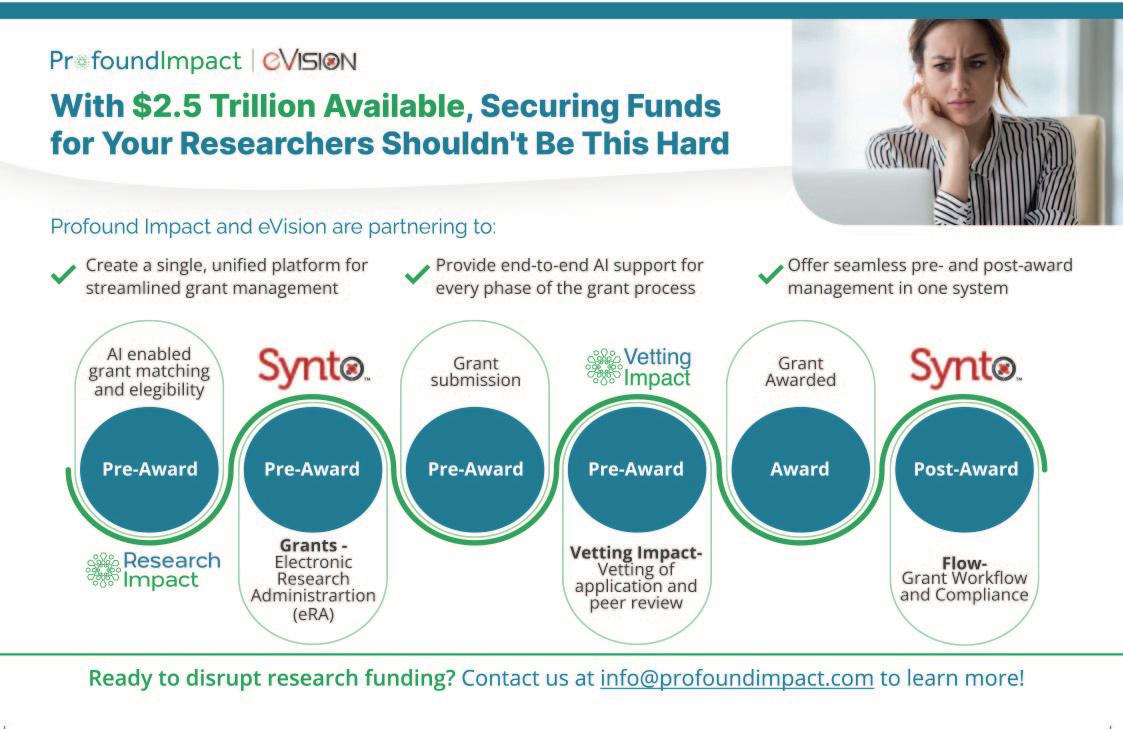
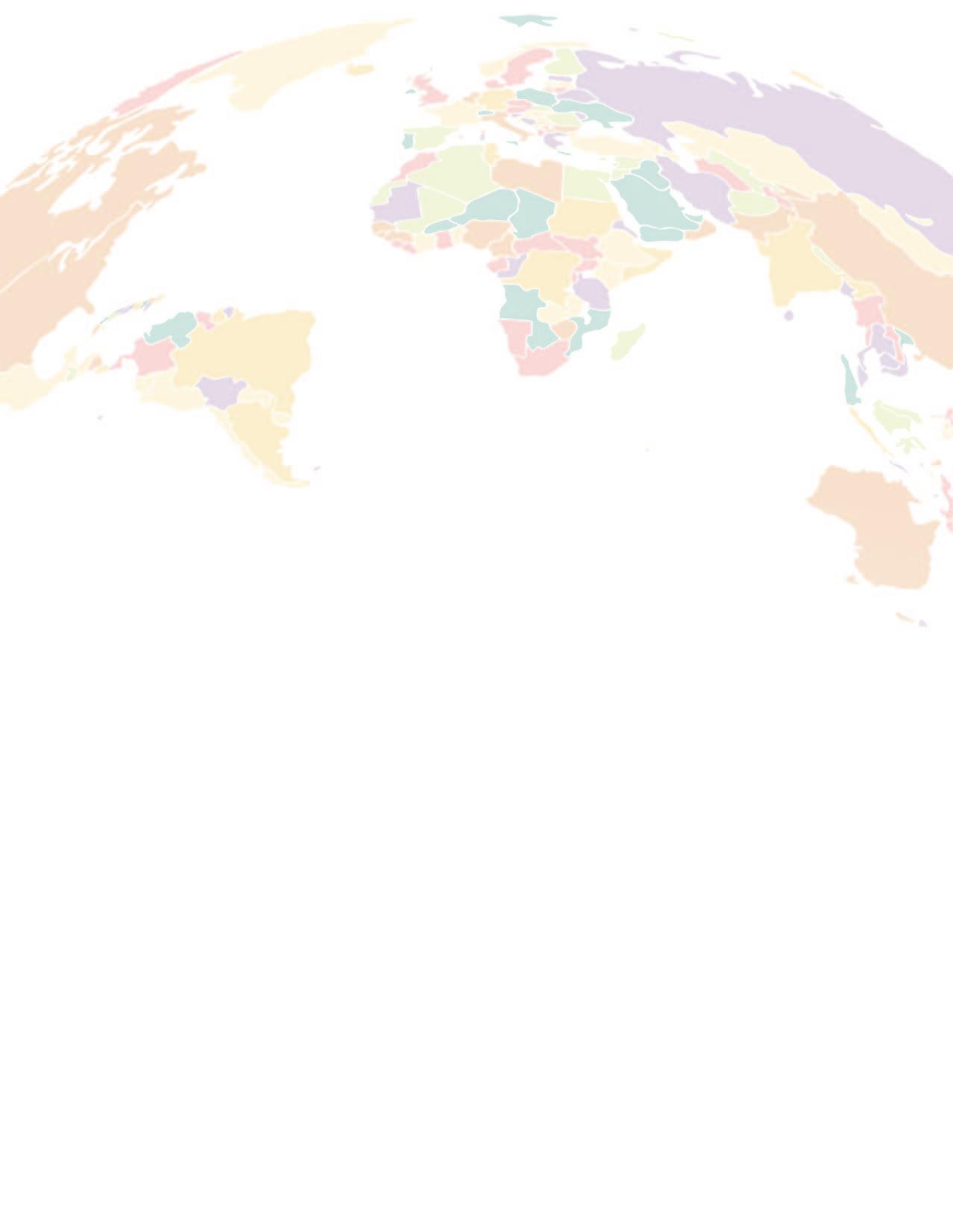
In 2024, NCURA’s Global Initiatives engaged more than 300 research administrators across six countries through tailored workshops, innovative grant programs, and impactful fellowships. By fostering cross-border collaborations in Slovenia, advancing research security in Finland, and building capacity in Egypt and Georgia, NCURA's efforts demonstrated the power of global partnerships in driving local innovation and advancing research administration worldwide.
NCURA facilitated workshops that connected research administrators across continents, providing training tailored to the unique needs of each region. These programs focused on knowledge sharing, collaboration, and building sustainable frameworks for research growth.
Tbilisi, Georgia
As part of the University Capacity Building Program (UCBP), NCURA hosted a workshop aimed at strengthening the research capabilities of Georgian universities. Hands-on training covered topics such as grant management, donor engagement, and creating sustainable research administration frameworks. The initiative promotes long-term growth and fosters collaboration between Georgian and U.S. institutions.
Ljubljana, Slovenia
A two-day workshop at the University of Ljubljana, organized in collaboration with the U.S. Embassy, focused on navigating U.S. funding opportunities, financial management, and grant administration. Participants worked through challenges related to tight deadlines and complex requirements. A faculty member reflected, “Ljubljana, known for its bridges, served as the ideal setting for spanning continents and cultures.”
Helsinki, Finland
At workshops hosted by the University of Helsinki and Aalto University, research security took center stage. Partnering with the Finnish American Research and Innovation Accelerator (FARIA), discussions emphasized safeguarding sensitive data and adapting to evolving global standards. Real-world scenarios allowed participants to develop actionable solutions for protecting institutional and collaborative research.
Cairo, Egypt
NCURA expanded the Research Administration - Capacity Building Program (RA-CBP) through a partnership with USAID, the Egyptian Ministries of Foreign Affairs and Higher Education, and the Science and Technology Development Fund (STDF). A three-day workshop offered practical training in project management, leadership, and strategic planning. The program fostered collaboration between Egyptian and U.S. administrators, highlighting the value of shared learning.
NCURA met with stakeholders from the Higher Council on Science and Technology (HCST) and the Royal Scientific Society (RSS) to discuss research commercialization and technology development. Supported by the Fulbright Rawabit Program, these meetings reinforced how global partnerships can stimulate local innovation.
Strategic Grants: Laying the Groundwork for the Future
NCURA Global advanced its mission in 2024 by securing key grants that supported global research administration.
• In Georgia, NCURA entered the third phase of the UCBP, offering mentoring, workshops, and immersive study visits to build a skilled network of research administrators.
• In Egypt, the RA-CBP continued equipping administrators with tools to develop modern research offices, fostering innovation and economic growth.
• In Greece, NCURA implemented two grants focused on protecting intellectual property (IP) and preventing unauthorized technology transfers. Greek academics engaged with U.S. experts on IP management, research security, and technology transfer policies, enabling institutions to safeguard their research while enhancing international collaborations.
The NCURA International Conference Excellence (NICE) Fellowship program continued to provide transformative opportunities for research administrators from emerging countries, enabling them to attend major NCURA conferences. By reducing financial barriers, the program supports diversity and inclusivity in the profession.
At the Annual Meeting and the Financial Research Administration Conference, fellows enriched discussions by sharing unique perspectives. One fellow noted, “The conference equipped me with strategies that are already improving processes at my institution.” The program underscores NCURA’s dedication to fostering global engagement in research administration.
The accomplishments of 2024 reflect NCURA’s unwavering commitment to strengthening research administration worldwide. Workshops, grant programs, and fellowships laid the groundwork for continued collaboration and innovation.
As we move into 2025, plans include expanding to additional countries, piloting a virtual workshop series, and launching a mentorship program to connect experienced administrators with early-career professionals. These initiatives will further empower research administrators and contribute to a thriving global research community.
For updates on upcoming programs and opportunities, visit NCURA’s website. Together, we will continue building connections that drive research administration forward. N
Take 5 minutes a day for your professional development –be informed and inspired with new articles posted daily to the NCURA App!
Reading is, and always has been, the habit of the highly successful.
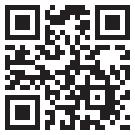
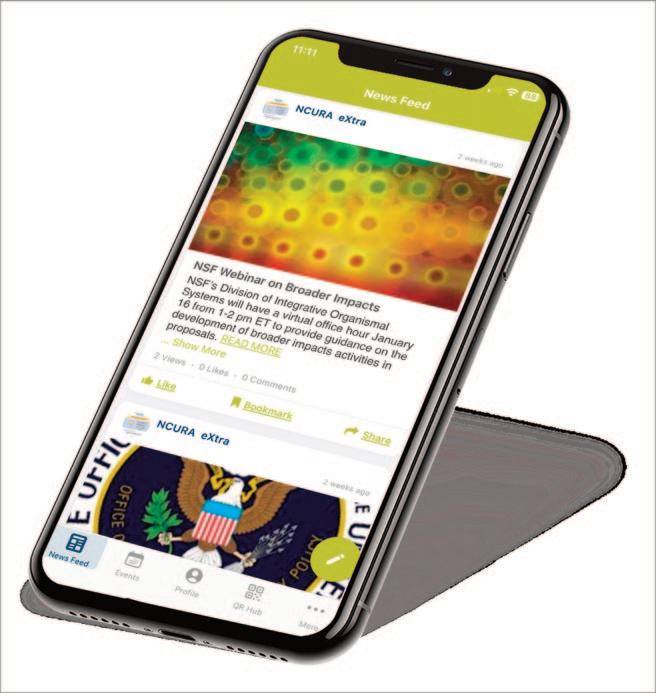
Available for iOS and Android devices! “NCURA” in your app store or use the QR code to take you directly there!
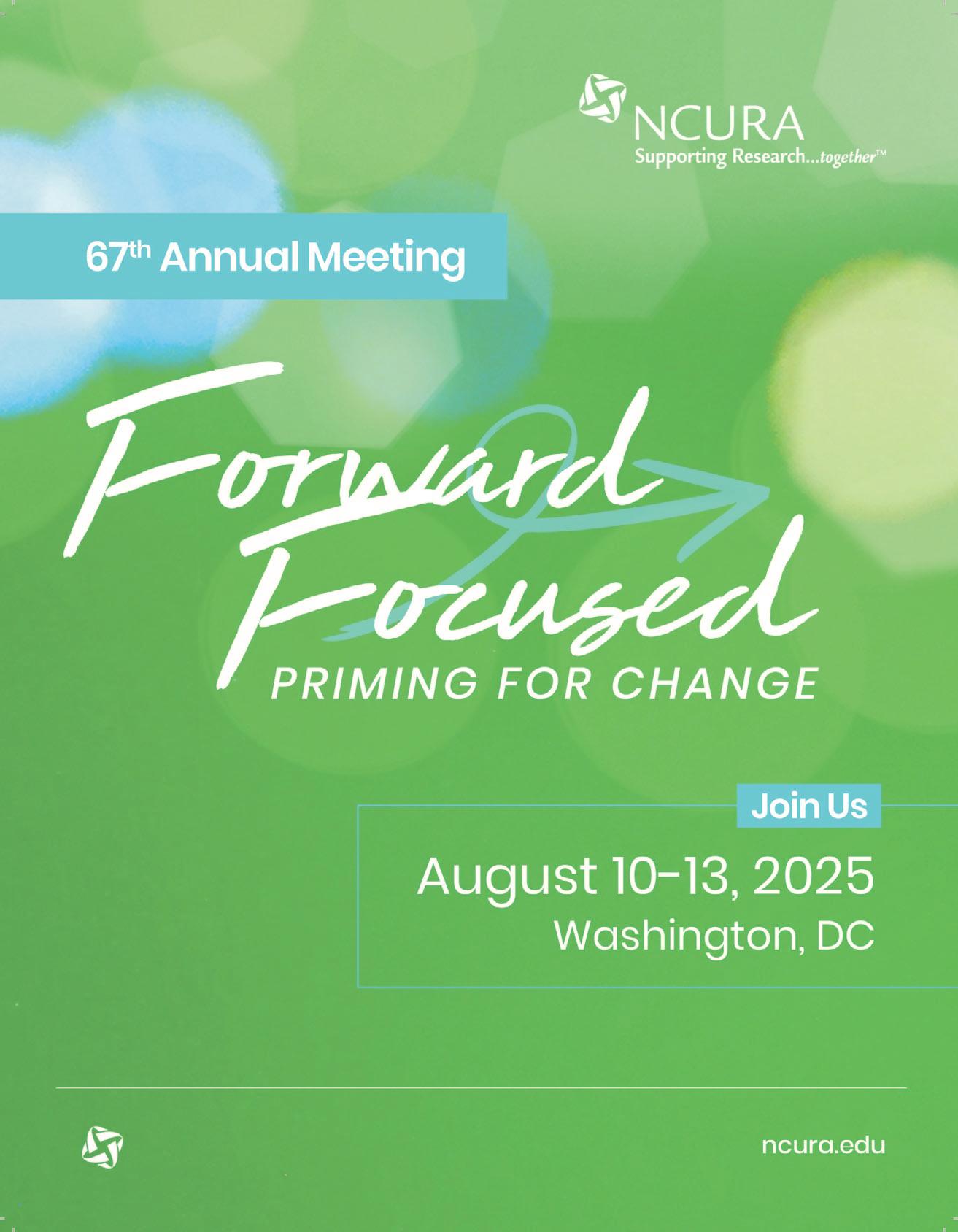
By Christina Stanger
In today’s world, we all understand the need for diversity when it comes to clinical research participants. We know the history of limitations in earlier research due to the lack of diversity, whether it is a lack of representations by age, sex, gender, race, religion, cultures, or geography. National Institutes of Health (NIH) has multiple policies that underscore this understanding and the need to represent true populations in our research. These include, but are not limited to, NIH Policy and Guidelines on the Inclusion of Women and Minorities as Subjects in Clinical Research and NIH Inclusion Across the Lifespan in Human Subjects Research.
How do researchers overcome basic barriers to rich and diverse medical research data? It can be a complex issue. Perhaps the researcher is in a rural area and diversity in their immediate population is limited. Or they are junior investigators with limited funding and resources as they try to break into the academic medical arena, and they simply cannot recruit substantial numbers of diverse participants to provide a substantial number of diverse participants to represent any statistical significance. Another possibility is that the researcher is very experienced but looking into a new area of research or precision medicine for their disease group specialty and need some preliminary data to simply test their theories in the infancy stage before they begin to apply for funding. Or, perhaps, there are entity-specific policies that limit the researcher’s ability to perform research in a specific area. There is a path forward and research administration is key.
For my entity, we’re a 10-hospital academic healthcare system in an urban area with a small research portfolio. Access to a diverse population is not an issue. Funding can be tricky at times, as it can be anywhere. For us, there are internal policies that limit research in certain areas. For instance, if a researcher would like to do marijuana research there is a process for review and approval. Even though there is not a strict ban on marijuana research, there is a careful review at the top levels of our organization for a proposed marijuana research project. While our state has legalized recreational use of marijuana, the federal government has not. No entity wants to violate federal law or risk losing federal funding. Additionally, there are strict state laws regarding how and who can legally grow and distribute marijuana, not to mention ensuring we can get research quality and quantity
of supplies for a study. With marijuana usage on the rise and a growing number of states passing legalization laws, the effect on human health is woefully under researched. Junk science and propaganda has been filling the void with lots of claims that have not been scientifically proven. There is a strong need to push the research forward while considering a very diverse population of users. The stereotypes of the aging hippy and the young gangster rapper have been shattered. Uses range from pain relief for cancer patients, inclusion in religious rites, supplemental assistance for anxiety patients, and general recreational usage just to name a few. Users come in all shapes, sizes, races, ages, genders, cultures, geographies, and religions. Therefore, the science and research of marijuana must expand and with it the expansion of those included in the research.
If your entity has not registered, your researchers are missing out! Check out their main web site: https://allofus.nih.gov.
At our entity, I can probably count on one hand and actually name every researcher that has asked for permission to perform marijuana research. So, it was a complete surprise one day when I was asked how one of our residents performed a marijuana research study. I can clearly remember the day we were asked about this marijuana research study. A resident from one of our hospitals has recently published a paper on his research. Our organization utilizes intelligent automation to capture all news and media sources that mention one of our system entities, and this study publication was picked up by that automation. This completely came out of left field for us. Our research offices had never heard of this resident researcher, nor did he have any grants or contracts under his name. Our director for the pre-award office and myself were scrambling through our files. Was this some rogue researcher? Were we looking at all sorts of research regulatory
violations? Our minds were racing! We reached out to our IRB office to see if they had any records. Their office had records for the researcher, but it was only for research involving secondary use of data—data originally collected under a different research study is used in a second study to answer a different research question. Usually, this can be easily approved with de-identified data, and this was the case with our mysterious resident researcher.
A year earlier, our entity executed an agreement to gain access to the NIH All of Us database. Each new researcher from our entity would fall under this agreement and would only need to execute their own certifications regarding the use of the database to get access to the data. The NIH All of Us research program has existed for several years now, and many entities have signed agreements for access to data. If your entity has not registered, your researchers are missing out! Check out their main website: https://allofus.nih.gov. This could be a path forward for researchers, especially if they just need some seed data to help formulate their future research project.
There are multiple tiers for accessing data that includes a public tier of aggregate and de-identified data, a registered tier requiring a basic data sharing agreement, and a controlled tier of genomic data. The data included in the All of Us database includes multiple surveys of more than 410,000 participants, physical measurements of more than 328,000 participants, genomics data for more than 312,000 participants, data from electronic health records, data from digital health technologies (e.g., FitBit), data from ancillary studies, and data linkages. Data can be viewed via data
By Tricia Callahan
NCURA Peer Reviewers have witnessed institutions implementing strategies to enhance their research administration practices to meet the growing demands. These strategies include streamlining processes, leveraging data analytics, fostering collaboration, and investing in professional development for investigators and administrative staff.
Streamlining Operations & Enhancing Efficiency
• A dedicated liaison between investigators and Sponsored Programs was established to provide the colleges with comprehensive support services. This centralized approach leverages shared resources to efficiently assist investigators with research-related activities, including proposal development, award management, and compliance.
• A working group was formed to proactively identify and address potential data security challenges. By prioritizing data security, institutions can protect sensitive information, maintain compliance with regulations, and safeguard their reputation.
Fostering a Collaborative Research Community
• Senior leadership hosts monthly forums for central and unit administrative staff to discuss research administration topics and challenges. Forums like these provide opportunities for networking, knowledge sharing, and collaboration, fostering a strong sense of community among research administrators.
• Deans invite research administrative staff to college meetings to share their services and resources with investigators. These meetings can enhance understanding, build relationships, and improve the overall research enterprise by creating opportunities for interaction and communication.
snapshots or the data browser. The data browser includes a researcher workbench for those accessing data via the registered tier. The workbench offers a workspace to access, store, and analyze data for specific projects. It also offers a dataset builder, analysis tools, a cohort builder, and a user support hub (NIH, 2024).
The NIH All of Us program is trying to gather data on a million or more people in the United States with the goal of better health for all of us. This program has a strong commitment to diversity and transparency (NIH, 2024). For our resident researcher, it was a huge boon to be able to quickly get data to use for his project without financial commitment or any special approvals. It helped him publish his first article and welcomed him into the world of research.
Contributing sites and study volunteers are also needed. This is where we can individually make a difference! N
Reference NIH (2024) All of Us Research Program. https://allofus.nih.gov.

Christina (Tina) Stanger, MA, CRA, serves as the Assistant Vice President of Research Administration for the MedStar Health Research Institute. In this capacity she oversees all MHRI’s core administrative functions, including policy development and implementation, executive oversight of pre-award activities, and selective post-award activities. She can be reached at christina.m.stanger@medstar.net.
Promoting Professional Development
• Research administrative staff are encouraged and supported to attend national conferences. Professional conferences provide opportunities to engage with colleagues from other institutions, learn about emerging trends and best practices, and expand professional networks.
• Support is provided for Research Administrators Certification Council (RACC) certifications and re-certifications. Having certified staff allows institutions to attract and retain top talent, enhance their professional standing, and improve the overall quality of research administration services.
By implementing these strategies, institutions are creating robust and efficient research administration infrastructure that supports the success of their research enterprises.
Whether you work at a research institution or a predominantly undergraduate institution, the importance of providing quality services to your faculty in support of their research and scholarship is undeniable. NCURA offers a number of programs to assist your research administration operations and to ensure a high-quality infrastructure that supports your faculty and protects the institution.
Please contact NCURA Peer Programs: NCURA Peer Advisory Services and NCURA Peer Review Program at peerreview@ncura.edu

Tricia Callahan, MA, CRA, is the Interim Director of Research Training at Emory University. Tricia is the past Chair of the Select Committee on Peer Review and serves as a Peer Reviewer. She can be reached at tricia.callahan@emory.edu.

By Laurianne Torres
Federal agencies continue to implement policies to address concerns related to national security, the protection of intellectual property, and the integrity of the research process. As the number of requirements continues to grow, institutions may face significant challenges with faculty recognizing, prioritizing, and ultimately embracing this cultural shift to protect unpublished research.
Research is a cornerstone of academia and faculty are a critical component of the research ecosystem - pushing the frontiers of knowledge and discovery through their investigative work. An essential, though sometimes underappreciated, part of the research ecosystem is the framework of compliance that ensures research is ethical, legal, and compliant with federal requirements and terms and conditions of award. Some faculty may perceive these requirements (and compliance in general) as restrictive, irrelevant, or even counter-productive to their work, which can lead to a lack of engagement and understanding of the critical role these measures play in safeguarding research.
Faculty members face immense pressure to secure funding, publish results, discover, and innovate. In this context, compliance requirements can seem like additional layers of complexity or burden that distract from their primary research activities.
The rapid evolution of regulations – often accompanied by vague language or frequent changes – can exacerbate these feelings. When faced with seemingly insurmountable administrative hurdles, some faculty may overlook or neglect compliance or reject these requirements altogether.
Despite these challenges, the importance of compliance cannot be overstated. Non-compliance can lead to severe repercussions, including loss of funding, legal liabilities, and reputational damage for both the investigator and the institution. By understanding that compliance is not merely a regulatory obligation but a vital component of successful research, faculty may better appreciate its role in facilitating their work.
Here we explore strategies to foster understanding and collaboration among research leadership, faculty investigators, and the research administrators who support them using the Research Quality Management Program (RQMP) developed at Duke University.
The RQMP at Duke University is a comprehensive framework designed to enhance the quality and integrity of research by ensuring compliance with
regulatory standards (Duke University, n.d.). Established in response to the increasing complexity of research environments and the need for effective risk management, RQMP focuses on fostering a culture of compliance, continuous improvement, and proactive oversight.
The overarching goal of the RQMP is to integrate compliance seamlessly into the research process, ensuring that it is viewed not as a burden but as a vital component of scholarly work. By fostering a culture of compliance, RQMP aims to promote research integrity, enhance the quality of research outcomes, and safeguard institutional reputation.
1. Assessment and Evaluation: RQMP emphasizes regular assessments of research practices to identify potential compliance risks and areas for improvement. This proactive approach allows for timely interventions and the enhancement of research quality.
2. Training and Education: Central to the program is the commitment to ongoing education for faculty and staff. Tailored training sessions cover a wide range of topics, including ethical research practices, grants management, and federal regulations. By equipping researchers with the necessary knowledge and skills, RQMP seeks to promote a deeper understanding of compliance.
3. Collaboration and Communication: RQMP promotes open communication channels between research administrators and faculty. This collaboration is critical for clarifying compliance expectations, addressing concerns, and building a supportive research environment.
4. Performance Metrics: The program establishes clear performance metrics to measure compliance and research quality effectively. These metrics not only facilitate accountability, but also recognize faculty achievements in adhering to compliance standards.
The RQMP framework is an essential tool for navigating the challenges posed by the evolving regulatory landscape and relies on active and ongoing engagement with the research community. Here are a few ways the RQMP achieves this:
To cultivate a culture of compliance, the RQMP seeks to identify effective ways to engage faculty investigators, address their perceptions about compliance as an obstacle, and underscore the importance of compliance as a shared responsibility.
• Establish Open Communication Channels
Creating an open dialogue between research administrators and faculty is essential for addressing compliance concerns. Regular meetings, workshops, and informational sessions can facilitate discussions about the importance of compliance and clarify the rationale behind specific requirements. Providing platforms for faculty to voice concerns and ask questions can foster mutual understanding and collaboration.
• Tailor Education and Training Programs
Utilizing the RQMP framework, institutions can provide targeted education that addresses specific compliance issues relevant to different research areas. Workshops should focus on practical applications and illustrate how compliance enhances research quality and integrity. Incorporating real-life scenarios and case studies can make compliance more relatable, demonstrating its value in the context of faculty research activities.
• Simplify Compliance Processes
Identifying areas where compliance processes can be streamlined is crucial. Research administrators should seek input from faculty regarding the challenges they face and work collaboratively to develop more efficient procedures. By reducing bureaucratic hurdles and clarifying expectations, institutions can alleviate administrative burden on faculty while ensuring that compliance is maintained.
The overarching goal of the RQMP is to integrate compliance seamlessly into the research process, ensuring that it is viewed not as a burden but as a vital component of scholarly work.
• Create a Supportive Environment
Establishing a supportive environment where faculty feel comfortable seeking help with compliance issues is essential. Institutions can create dedicated resources, such as online guides and FAQs, to assist faculty in navigating compliance requirements. Additionally, appointing compliance liaisons within departments can provide faculty with easily accessible points of contact for questions and assistance.
• Encourage a Culture of Collaboration
Promoting a culture of collaboration between faculty and research administrators can help change the narrative around compliance from a burden to a shared responsibility. By emphasizing that all parties are committed to upholding ethical standards and ensuring research integrity, institutions can foster a collaborative environment. Regular check-ins and joint problem-solving sessions can further strengthen this partnership.
• Implement Feedback Mechanisms
Surveys, focus groups, and informal discussions can help identify pain points and areas for enhancement. Actively soliciting faculty input
demonstrates a commitment to understanding and addressing their challenges and fostering a sense of ownership in the compliance process.
• Recognize and Reward Compliance Efforts
Recognizing faculty who prioritize compliance can reinforce its importance and motivate others to follow suit. Institutions can implement recognition programs that celebrate compliance achievements. Highlighting these successes can create a positive feedback loop, encouraging more faculty to engage with compliance initiatives.
Strategies for Engaging Research Administrators
The effectiveness of these strategies relies heavily on the capabilities of research administrators. To foster compliance as a shared responsibility, research administrators must also be engaged and supported.
• Provide Ongoing Professional Development
Research administrators should engage in continuous learning about regulations, compliance issues, and effective communication strategies. Staying informed and skilled enables them to provide accurate guidance, address faculty concerns, and facilitate faculty understanding of sponsor rules and regulations.
• Encourage the Cultivation of Trusting Relationships
Effective research administrators cultivate strong relationships with faculty based on trust and mutual respect. Demonstrating empathy and understanding of faculty challenges can create a collaborative environment where compliance is seen as a shared commitment.
• Help Research Administrators Advocate for Faculty Needs without Compromising Compliance
Research administrators should act as advocates for faculty within the compliance framework. Identifying areas where processes can be improved or simplified can help reduce the administrative burden on faculty while ensuring that regulatory obligations are met.
Conclusion
By creating mechanisms for meaningful dialogue and a framework for compliance, institutions can demystify processes and alleviate the concerns faculty may have regarding administrative burdens. Highlighting the benefits of compliance, but also the consequences of non-compliance - such as loss of funding, reputational damage, legal consequences, disciplinary actions, and loss of public trust - can further motivate faculty to embrace these requirements as integral to their work. It truly takes “all of us” to foster compliance, ensuring that the integrity and quality of research remain paramount. N
Reference
Duke University. "Research Quality Management Program (RQMP)." MyResearchPath, Duke University, n.d., https://myresearchpath.duke.edu/topics/research-quality-managementprogram-rqmp.

Laurianne Torres is the Associate Dean for Research Administration at Duke University and oversees the Office of Research Administration and the Research Administration Support Resource. Laurianne holds a BA in Mass Communication and an MA in Nonprofit Management. She can be reached at laurianne.torres@duke.edu.
By Laura Rosales and Debra Murray

Imagine a world where your medical care is based on your individual differences, such as your genes, environments, and lifestyles. Treatment of diseases would be specifically tailored to you versus the average patient, which is the basis of how doctors have had to make recommendations. This tailored approach is called precision medicine, and there are people who have already been touched by this type of treatment. But what if we could create a world where ALL individuals could have access to this type of care all the time?
In 2015, under the tenure of President Barack Obama, the All of Us Research Program (previously known as the Precision Medicine Cohort Program) was born. The program is housed within the National Institutes of Health (NIH) and publicly funded by the 21st Century Cures Act (https://www.fda.gov/regulatory-information/selected-amendments-fdcact/21st-century-cures-act), which authorized $1.5 billion for the program over 10 years. The program’s primary purpose is to make advances in precision medicine, particularly by accelerating health and medical breakthroughs and enabling individualized prevention, treatment, and care (NIH, 2023).
To do this, a robust database of genetic and health data from one million volunteers would be developed for medical researchers and scientists from which to utilize in their biomedical research. The database is impressive and contains surveys, genomic data, electronic health records, and physical measurements that presents a rich source of data for researchers looking to help those in their community and beyond. Every eligible person in the
United States can join if they agree to share their health records. This initiative created many funding opportunities as well as program partners to carry out this mission (https://allofus.nih.gov/funding-and-program-partners). This included creating a pipeline from community to research to workforce, encompassing engagement to retention at all points.
In 2020, the Department of Molecular and Human Genetics (MHG) at Baylor College of Medicine (BCM) submitted a five-year proposal totaling $7 million to develop a program to engage researchers from diverse backgrounds to utilize the All of Us researcher database/workbench by hosting an annual workshop. We were successfully funded for Year 1 at just over $1 million with a start date of July 1, 2021, and as the program has progressed through current Year 4, additional activities were added, such as Researcher Workbench Open Hours and a Train-the-Trainer Program.
The All of Us Evenings with Genetics (AoUEwG) Research Program aims to engage diverse researchers with the All of Us database. The first approach involves providing opportunities through All of Us Evenings with Genetics Campus Seminars. The Evenings with Genetics seminars were originally developed by Susan Fernbach, a former Assistant Professor in MHG, with the purpose of connecting families with children with disabilities with resources and medical information presented by MHG faculty at the Houston Children’s Museum. The AoUEwG Research Program goal is to reach as many faculty at Historically Black Colleges and Universities (HBCU),
Hispanic Serving Institutions (HSIs), and small universities and colleges, ensuring a diverse and inclusive scientific community. Researchers at all faculty levels (Assistant, Associate, and Full Professor) in several disciplines (behavioral and social sciences, education research, public health, and STEM-Science Technology Engineering and Mathematics) are invited to learn about the database in small developmental meetings. The second approach is recruiting early career researchers to join the All of Us Biomedical Researcher Scholarship Program.
The All of Us Evenings with Genetics Research Program is successfully developing the scientific workforce through the All of Us Biomedical Researcher Scholarship Program. The Scholars Program begins with a Biomedical Researchers Faculty Summit to bring the potential scholars together to form multidisciplinary research teams. These teams form around a common research topic using the All of Us data. At the Faculty Summit, the scholars receive data science training, mentoring, and professional development. The Scholars Program provides support and resources for the research teams to thrive and encourages these teams to continue to work beyond the Scholars Program. Over the past three years of the program, a total of 118 scholars participated in the program.
As research administrators, we are all familiar with the typical funding mechanisms: grants, contracts, and cooperative agreements. It is rare that we come across an award based on an OT-Other Transactions. However, one of the ironic facts about the Other Transactions (OTs) mechanism is that it has been around since 1958!
In 1958, President Eisenhower signed legislation to create the National Aeronautics and Space Administration (NASA) and the OTs mechanism; agreements other than procurement contracts, grants, and cooperative agreements (Dobriansky & O’Farrell, 2018). And, with the passage of Section 815 of the National Defense Authorization Act (NDAA) for Fiscal Year 2016, OTs for prototype projects with the Department of Defense were permanently codified in Table 10, Section 2371b, of the U.S. Code (Dobriansky & O’Farrell, 2018). This has resulted in an increase in the usage of OTs, particularly by the Department of Defense, where they are used for either research and development and/or prototype initiatives.
The Other Transactions Authority (OTA) allows federal agencies to enter into OTs when appropriate (NIH, 2024). Specifically, the Public Health Service Act (PHSA), Sec. 402(n), 42 U.S.C. Sec. 282(n) provides authority for the NIH to use this mechanism. This unique type of legal instrument is not subject to the Federal Acquisitions Regulations (FAR), grant regulations, or any other laws that apply to procurement contracts, unless otherwise noted in the terms and conditions of the award (NIH, 2024).
Why would a federal agency use OTs instead of the more common funding mechanisms? According to NIH (2024), there are various reasons: (1) flexibility for negotiating terms and conditions; (2) non-traditional review and award management due to the highly evolving science where additional aims or expertise may be adjusted to the program; (3) collaborative involvement by the sponsor, particularly for progress review and decision making on efforts or direction; (4) negotiate intellectual property rights; and (5) participation by non-traditional research recipients, such as non-profits, individuals, and organizations who normally do not work with the federal government (patient advocacy groups, pharmaceutical companies, and foreign entities).
Personal Perspective and Conclusion
From a personal perspective, managing the award was not challenging. A typical Notice of Award (NOA) and a comprehensive Terms and Conditions
“Imagine a world where your medical care is based on your individual differences, such as your genes, environments, and lifestyles.”
Agreement were issued each year. There was required monthly reporting and monthly meetings with the Program Officer (PO) and the Grants Management Specialist (GMS) to review programmatic activities and financials. Occasionally, questions and prior approvals were required as the terms and conditions did not specifically address all concerns.
Today, we are in Year 4 of a proposed five-year program and have received total funding of $5.1 million since the program’s inception. However, this year the 21st Century Cures Act was hit with an overall 34% funding decrease from the prior year. Thus, we were significantly cut by 59% of our expected budget this year. We had to reduce or eliminate activities and personnel effort. However, the program continues to provide mentoring and professional development virtually as well as the annual, in-person Faculty Summit.
The 21st Cures Century Act expires after 2026, and it is uncertain if or how the program will continue, including whether BCM will receive another year of funding. However, the program has made an impact on enhancing a diverse and inclusive scientific community. For additional details, see a recently published article in the Journal of the American Medical Informatics Association, “Development and evaluation of a training curriculum to engage researchers on accessing and analyzing the All of Us data.” The link below will take you to the article. N https://academic.oup.com/jamia/advance-article/doi/10.1093/jamia/ocae240/7756403
References
Dobriansky, J. & O’Farrell P. (2018, July). Other transaction authority: Acquisition innovation for mission-control force readiness. Contract Management. https://acquisitioninnovation.darpa.mil/docs/Articles/Contract%20Management%20Dobria nsky%20OTA.pdf
National Institutes of Health. (2023, October 18). All of Us research program overview. All of Us research program. https://allofus.nih.gov/about/program-overview
National Institutes of Health. (2024, October 1). Other transactions. https://grants.nih.gov/funding/funding-categories/other-transactions


Laura Rosales, EdD, MBA, CRA, is the Administrator for the Department of Molecular and Human Genetics at Baylor College of Medicine (BCM). She is also a Co-Investigator on the BCM All of Us Evenings with Genetics Research Program. With over 30 years of higher education experience, she has worked in fiscal affairs, departmental administration, and research administration, both in the central and departmental offices. She can be reached at Laura.Rosales@bcm.edu.
Debra Murray, PhD, a leader in equity, mentoring, and research education. She was awarded the All of Us Evenings with Genetics Research Program from the NIH All of Us Research Program. Dr. Murray is Director of Genetics/Genomics Education Programs in the Human Genome Sequencing Center, and an Associate Professor in the Molecular and Human Genetics Department and co-Director of the Office of Community Engagement and Equity at Baylor College of Medicine (BCM). She can be reached at ddm@bcm.edu.
By Nigel Chong-You, Christine Galbreath, Gerik Kimble, and Ryan Loftus

In July of 2023, Deloitte and Washington State University (WSU) saw an opportunity to address a persistent need in the higher education grant management community facing principal investigators and research administrators alike. That need was a grant management forecasting tool that combined life-to-date budget and expense data for a given award or grant, along with the capability to forecast and give ‘what if’ scenario planning and management for that award’s financials.
Due to the differences that exist between grants and standard annual operating funds and other sources of funding in a university’s budget, WSU needed a powerful tool that could combine the enterprise financial data at the institution with grants-specific logic and requirements to accurately forecast and manage funds for the life of the grants in their portfolio.
With these needs in mind, Deloitte and WSU struck a partnership to design and develop a grants management forecasting tool that would be an industry-leading example that leverages technology to improve the stewardship of sponsor funded research dollars at the institution. The solution designed would utilize Workday Grants Management and Adaptive Planning to:
• Forecast facilities and administration (F&A) costs based on eligible direct cost projections.
• Project accurate salary and benefits expense including hourly workers and realistic worker-specific benefits rates.
• Allow manual entry of encumbrances for expenses not already obligated in Workday, and anticipated budget changes.
• Enable users to experiment with what-if scenarios to determine the best use of funds.
• Accurately calculate and forecast all direct and F&A impacts to overall budget to show a precise remaining balance.
The successful collaboration would create a pioneering solution that displayed the possibilities when leveraging Adaptive Planning, Workday Grants Management and Advanced Reporting to enhance grant management and forecasting capabilities.
Background
Founded in 1890, WSU is one of the oldest land-grant universities in the Western United States with over 25,000 students offering 200+ programs across five physical campuses across Washington
State and a global virtual campus. As a growing research institution, WSU also has four research centers, and 40 county and tribal extension offices throughout the state and is an R1 research institution with $378 million in annual research expenditures.
In January of 2021 in partnership with Deloitte, WSU successfully went live on Workday HCM, Payroll, and Finance, modernizing their systems while retiring decades old legacy mainframe systems and processes. To further expand its Workday capabilities, WSU again partnered with Deloitte in 2023 to implement Adaptive Planning to enhance its planning and budgeting capabilities.
Later in 2023, Gerik Kimble, Executive Director of Business System Operations and Process Improvement at WSU, approached Deloitte with an idea to create a tool within their existing Adaptive Planning instance, that not only meets a common need for a grant forecasting tool for the research community at WSU, but could serve as an example to universities across the nation utilizing Workday and Adaptive Planning platforms.
Challenges: Why invest in this tool?
At the time, WSU had no central decision support tool for grants management that could answer common questions faced by PIs and research administrators. They needed a tool for forecasting and scenario planning that enabled review of grant available balances and effective management of their grant funding.
“We took feedback from grant managers and listened to consistent feedback from partners” according to Christine Galbreath, Lead Business Systems Analyst at WSU, on the impetus to reach out to Deloitte to partner on building this tool.
Before selecting Adaptive Planning, WSU considered other potential tools but ultimately chose Adaptive Planning given it was already used by the university for annual budgeting and offers a comprehensive set of capabilities that enhance planning processes such as dashboards, report scheduling, and personal scenarios. Additionally, including grants data in the same system as other annual budgets lays the groundwork for future combined reporting on all funds.
Recognizing the needs of WSU faculty, Matt Skinner, Senior Associate Vice President for Finance and Deputy CFO, eagerly supported the innovative concept. “As we engaged with other research universities, we discovered they faced similar challenges. This realization further inspired us to develop a pioneering solution to meet the needs of WSU faculty,” Skinner shared. “We knew we needed the right partner to help us achieve this.”
With the recent successful implementation of both Workday and Adaptive Planning, WSU wanted to capitalize on the strong relationship and continued partnership with Deloitte, in hopes to design this new tool and improve the management and stewardship of their growing research portfolio.
The Solution
WSU and Deloitte embarked on a project in July of 2023 to create WSU’s first ever enterprise-level forecasting tool, aiming to replace traditional spreadsheets and costly shadow systems. The tool was designed to enable researchers and research administrators to forecast grant spending, including salary and benefits by person, non-personnel costs, and the ability to accurately forecast facilities administration (F&A) costs. The tool recognizes award dates and award budget periods which do not align with the standard operating fiscal year, in addition to the various institutional rate agreements that drive the millions of dollars of F&A costs and F&A recovery amounts.
To accommodate the design, Workday reports were designed to extract data and load Adaptive with:
• Budget, commitments, expense, data by grant and object class.
• Costing allocations for all people paid on grants.
• Benefit data by person and grant.
• Award attribute data such as F&A rates and award line dates.
Additional key features of the tool are:
• The capability to calculate F&A costs based off of F&A eligible projected direct costs.
• The capability to obligate salaries and benefits for the full period of any current and future costing allocations using the worker’s average benefits rate for the prior six months.
• The inclusion of payroll projections for hourly workers.
• Salary cap calculations brought in for projecting salary capped investigators.
• The ability to add manual budget projections and encumbrances for expenses not already obligated in Workday.
• The ability to forecast for cost share.
The forecasting tool presents users with a dashboard containing three tabs:
1. Grants Data & Budget tab: demographic data about the grant and the award including PI, F&A Rate, and current budget data with the ability to update the budget for forecasting purposes.
2. Grants Forecast tab: allows the user to project expenses that are not already obligated or incurred in Workday, including a salaries and benefits calculator by position.
a. Answer questions like “Can I afford to hire another grad student?” or “How will recent wage increases for research assistants impact my award budget?”
b. Data integrated from Workday: Cost center, grant, position, Institutional Base Salary (IBS) rate (annualized), base pay (annualized), annual work period, blended FTE, distribution %, average benefit rate (fringe rate), begin date, end date.
c. See salary and benefits projections update in real-time as changes are made.
3. Reports: brings all the forecast data together for analysis and provides reports and charts/graphs for projected balances.
a. Grant Forecast (by Object Class): see budget, actuals to date, Workday commitments/obligations, forecasted expenses, projected balance and Variance % by object class.
b. Grant Forecast (by Grant): Displays budget, actuals to date, Workday commitments/obligations, forecast and projected balance at the
Grant level; can be run by Cost Center, PI, or Award to show total balances for a portfolio of awards.
c. Grant Forecast (by Object Class)–Grant PI or Award Workbook: repeating report that produces one Excel spreadsheet with a workbook tab for each Grant in the PI’s portfolio. Each tab displays the Grant Forecast (by Object Class) report for that grant.
The solution has the potential to evolve and adapt to future needs within the industry. The initial release has already sparked new requests on how it could be applied to other accounts, such as programs, gifts, and other funding sources, highlighting the need for forecasting capabilities across all types of funds. Additionally, there is a growing need to forecast more accurately in response to changing enrollment trends.
A promising future use case involves the integration of generative AI to enhance forecasting options. For example, generative AI could create forecast options based on a PI’s portfolio, route these options to the PI for thoughts and approval, and subsequently initiate applicable business process options in Workday Financials. An illustrative scenario might involve a forecast indicating that a post-doc cannot be paid 100% of their salary; the PI could agree to reduce hours by 50%, and generative AI could then automate the costing allocation change for this reduction. This integration of AI would not only streamline processes but also enhance decisionmaking and operational efficiency.
Stay tuned for Part 2, where we will dive into the implementation, explore our change management approach, share valuable lessons learned, and discuss the impacts of our project. N
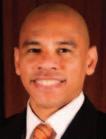
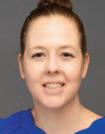


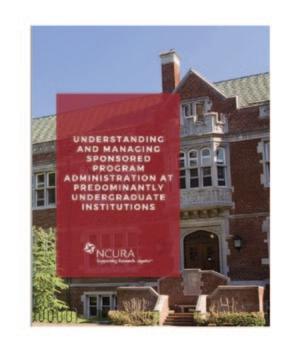

Nigel Chong-You is a Manager in Deloitte's Workday Financials Practice and brings more than 17 years of experience implementing and maintaining enterprise solutions in higher education environments. He can be reached at nchongyou@deloitte.com.
Christine Galbreath is the Grants Work Stream Lead at Washington State University (WSU) and has been a member of WSU’s Modernization Initiative since 2018 managing industry-leading projects and implementing process improvements and efficiencies in Workday for WSU’s research community. She can be reached at christine.galbreath@wsu.edu.
Gerik Kimble is the Executive Director of Business System Operations and Process Improvement for the Modernization department at Washington State University (WSU), with more than17 years of experience and currently driving operational excellence and process improvements. He can be reached at gerik_kimble@wsu.edu.
Ryan Loftus is a Manager in Deloitte’s Higher Education Workday Adaptive Planning practice and has 11 years of experience in professional services supporting clients in higher education, federal, and commercial sectors. He can be reached at rloftus@deloitte.com.

UNDERSTANDING AND MANAGING SPONSORED PROGRAM ADMINISTRATION AT PREDOMINANTLY UNDERGRADUATE INSTITUTIONS
This PDF resource introduces the framework, key concepts, and practices in effectively managing sponsored programs at Predominantly Undergraduate Institutions (PUIs). Topics include:
• Organizational Models and Structures
• Roles and Responsibilities
• Regulatory Compliance Requirements
• Pre-Award Services
• Post-Award Support Services
For details and to purchase visit https://onlinelearning.ncura.edu/read-and-explore

www.facebook.com/ncuraregioni
Happy New Year Region I! I am thrilled to step into 2025 as the Region I Chair once again! It’s an honor to collaborate with our dedicated advisory board, incoming officers, and all the incredible members of our region.
A heartfelt thank you to our outgoing officers for their hard work, creativity, and unwavering dedication: Nicholas Fisher (Chair), Brandi Glover (Secretary), and Lana Metayer (Treasurer). Your contributions have been invaluable. I’m equally excited to welcome and work with our incoming officers: Curtis Van Slyck (Chair-Elect), Karen Markin (Secretary), and Meredith Albuquerque (Treasurer). A huge thank you also to our Committee Chairs and members. You’re amazing!
Looking ahead, 2025 promises to be a year of growth and innovation for Region I. The Advisory Board will focus on refining the functions of the region and its committees, aiming for streamlined operations and enhanced productivity. Highlights of the year include:
• Workshops hosted by our Curriculum Committee
• A fresh slate of Wicked Good Chats
• A revamped mentoring program
• The return of New Member Orientations
Join us for the 2025 Region I Spring Meeting – A Mystery Awaits! The Region I Program Committee is thrilled to invite you to the 2025 Spring Meeting at the DoubleTree by Hilton in Manchester, New Hampshire, from April 28–30, 2025. The theme for this year’s meeting is “The Case of the Changing Landscape: Navigating the Future.” This dynamic event will feature over 50 informational sessions and discussion groups, along with wellness activities, networking opportunities, and fun games. Workshops will be offered on Wednesday, April 30, running alongside the final day’s sessions. Stay tuned for updates on programming and registration, we can’t wait to see you there!
Our region thrives because of the incredible contributions of our volunteers. To those who helped at the registration table, led sessions, or dedicated their time to committees—thank you! You are the backbone of Region I, and we are so grateful for your efforts. If you haven’t volunteered yet, we’d love to have you on board. Feel free to reach out to anyone on the Advisory Board for opportunities to get involved.
Stay connected through our regional calls and social media. If you haven’t joined our LinkedIn and Instagram groups, now’s the perfect time to sign up.
• LinkedIn (search NCURA Region i)
• Instagram (@ncuraregioni)
Here’s to a productive and rewarding 2025!
Stacy Riseman, MBA is the 2025 Region I Chair and serves as Director, Office of Sponsored Research at the College of the Holy Cross. She can be reached at sriseman@holycross.edu.

www.facebook.com/groups/ncuraregionii
Happy New Year Region II! We’re coming off the highlight of last year, the 2024 Region II Regional Meeting in Pittsburgh, PA. Highlights for me included seeing all my buddies, making new friends, and proudly watching our mentees in the Mentor Me program give their presentations! We also hosted two wildly successful educational opportunities in December: Understanding the Uniform Guidance on a Practical Level, a half-day virtual workshop with Ann Holmes and Rebecca Hunsaker, plus the first Mentor Me brown bag, Grant Spending Documentation & Processes: Post-Award Internal Controls with Mary Louise Healy (Mentor) and Gillian Silver (2023 Mentee).
I would like to take a moment to thank the outgoing Steering Committee Officers and Committee Chairs for all their hard work: Sandy Collier (Chair), Lamar Oglesby (Immediate Past Chair), Soraina Baez (Secretary), Chea Smith (Treasurer), Catherine Parker (PDC), and Charles Bartunek (Region II Meeting Program Committee Chair), and Laura Kingsley (Regionally Elected National Board Member).
I am excited to step into 2025 with my fellow Officers: Sandy Collier (Immediate Past Chair), Rebecca O’Brien (Chair-Elect), Stephanie Alfieri (Secretary), and Jennifer Vessio (Treasurer). In addition to our elected officers, the following committee chairs will lend their talents to the Steering Committee: Cynthia Kane (PDC); Margarita Cardona (DEI); Mary Louise Healy (Mentor Me); Lamar Oglesby (Regionally Elected National Board Member); and Catherine Parker (Meeting Program Committee Chair).
2025 will be another productive year filled with virtual and in-person PDC workshops, virtual brown bags, DEI speakers and activities, networking events, and new member orientations. We rely on the outstanding volunteers from our membership to accomplish this! Please contact Chair-Elect, Rebecca O’Brien at robrien@towson.edu to get involved, and we will find a volunteer opportunity that matches your interests and talents!
As part of our meeting rotation, 2025 will take us to the Gideon Putnam Resort & Spa in Saratoga Springs, NY. More information will be emailed soon and available on the Region II website. Watch for announcements on the website, Facebook, and in e-blasts as we move forward into the year!
• Join our Facebook page: www.facebook.com/groups/ncuraregionii
• Join the Region II Community on NCURA's Collaborate: https://collaborate.ncura.edu/communities/community-home?communitykey=8e4f210c-9468-4adc-a1bd-18a950e5be70&tab=groupdetails
• Complete your NCURA Profile: www.ncura.edu/Login/tabid/128/De-fault.aspx?returnurl=%2fMembershipVolunteering%2fMyDashboard.aspx
Please reach out to me if you have any suggestions for programming, networking opportunities or events/activities.
Cassie Moore is the 2025 Region II Chair and serves as Assistant Director at the Office of Research Administration at the University of Maryland, College Park. She can be reached at cmoore17@umd.edu.

www.facebook.com/ncuraregioniii
Happy New Year! As we welcome 2025, we hope that this message finds you and your loved ones healthy, happy, and ready for an exciting year ahead!
We are thrilled to announce that our regional Spring Meeting will be held at the Galt House in Louisville, KY on April 26-30, 2025. Our chair-elect, Celeste Rivera-Nunez (University of Central Florida), her meeting co-chair Jeanne Viviani-Ayers (University of Central Florida), and our planning and programming committees are crafting and finalizing a fun and informative meeting. This year’s theme is: Let's Go and Grow: Learning and Leadership in Research Administration.
Stay tuned to the Region III website for updates, including the draft program, registration details and lodging information.
We would like to extend our heartfelt thanks to our committees for their dedication to shaping this year’s meeting: Compliance/IRB/IACUC: Scott Niles (Georgia Institute of Technology) and Melanie Clark (Georgia Institute of Technology)
Contracts/Subawards: Tameria Mace (University of Central Florida) and Laura Letbetter (Georgia Institute of Technology)
Departmental: Lorrie Robbins (Duke University)
Post-Award: Betty Morgan (North Carolina State University) and Carly Pigg (Louisiana State University Health Sciences Center New Orleans)
Pre-Award: Stephanie Rodriguez-Makhlouf (University of Central Florida)
PUI/ERI: Linnea Minnema (Samford University)
Research Development: Dr. Emily Devereux (University of South Carolina) and Erin Butler (Emory University)
Workshops: Danielle McElwain (University of South Carolina) and Melinda Fischer (Clemson University)
We are excited to announce this year’s keynote speaker is Dr. Katie Nichols, Director of Mental Performance for the University of Louisville Athletics. Dr. Nichols oversees a team of mental performance coaches providing performance enhancement services to athletes, coaches, and support staff in a comprehensive and integrated sport psychology delivery model. Stay tuned for details!
We will be accepting applications and nominations for the Region III travel and honorific awards to be presented at the 2025 Spring Meeting. Awards include:
• 2025 Region III Travel Award
• 2025 Region III Travel Award
• Pam Whitlock Rising Star Award
• Sandy Barber Volunteer Award
• Distinguished Service Award.
Let’s make 2025 a year of growth, collaboration and success!
Rebecca Wessinger is Region III Secretary and serves as the Director of Research Operations, for the University of South Carolina, Molinaroli College of Engineering and Computing. She can be reached at RRWessinger@sc.edu.
www.ncuraregioniv.com

www.facebook.com/pages/Ncura-Region-IV/ 134667746605561
Greetings Colleagues! As we reflect on 2024 and look forward to an exciting 2025, I’d like to take an opportunity to look back on a very active year. Throughout the year, the Region IV executive committee has been meeting monthly to discuss regional business and how our organization can best serve its members. The bulk of spring was spent getting ready for the Region IV annual meeting in Ann Arbor, which had more than 300 attendees, a record for a non-Chicago meeting! NIH's LeShawndra Price captivated the attendees with her keynote address on self-care; bowling with Gil Tran was just another one of many highlights! August's AM66 was lots of fun, with Region IV wowing everyone with its 'cow games' and the annual DC After Dark serving as just a couple of the highlights. And, of course, Region IV's own Shannon Sutton was ratified at NCURA next President-elect! This fall the Region IV Board met for a day and a half of vision mapping and reviewing and updating our administrative procedures. It was an extremely productive meeting, and we look forward to the great results this terrific work will bring!
As we look onto 2025, it is sure to be eventful for the region. We are in the process of accepting nominations for several positions (chair, chairelect, treasurer-elect, two at-large board members and our regionally elected representative to the national board)—please consider running for a position or nominating someone you think would be a good candidate. While serving on the board can be a lot of work, there are also lots of great things that come with serving! And, do keep an eye out for information from the awards committee regarding nominations for 2025 regional awards including the Distinguished Service Award, Kevin Reed Outstanding New Professional Award and regional and national travel awards, among others. Lastly, we are excited for registration to soon open for The Future’s So Bright, Region IV Spring Meeting in Chicago, May 4-7, 2025, at the Swissotel!
NCURA Region IV is so fortunate to have such great members. We hope your holidays were fantastic and that 2025 brings great things. We are particularly fortunate to have so many members who help keep our region afloat–the many, many volunteers who contribute in so many varied ways.
Thank you!
Roger Wareham is the 2025 Region IV Chair and serves as the Director of Grants and Research at the University of Wisconsin-Green Bay. He can be reached at warehamr@uwgb.edu.

www.facebook.com/ncuraregionv
Thank you for joining us at our regional meeting that occurred on November 3-6, 2024, in Corpus Christi, Texas. The conference was a yearlong culmination of intensive planning engrained with intentionality, constructive, open dialogue, and unity of minds. Our 2024 meeting theme and my guiding light for year as Chair was Stand in Your Light, derived and focused on fostering inclusion, inspiring a sense of belonging and equally as important accessibility to information. We were steadfast with our communication cadence, the utilization of microphones in every session, and the expansion of our quiet and tranquil room as an introvert’s respite for decompressing, for sensory overload reset.
Woven throughout the tapestry of the conference from the inclusionary food choices that Liz and I opined over to get it just right, as well as the selection of entertainment on Tuesday night that paid homage to the culture of Corpus Christi. The entertainment committee led by Laura Rosales incorporated feedback from our region’s inclusion and accessibility committee were able to move us, the region, from cultural appropriation to cultural appreciation; a movement toward inclusion, acceptance and belonging whether we exhibit it through face painting, henna tattoos, the use of marigold flowers and so much more.
Paramount to all else, our meeting crested with the building of a stellar program selection starting with the identification of an incredible keynote speaker, Dr. Stacy Pritt, who is authentic, brilliant and stands in her light and ending the program with the luminous Gil Tran on Uniform Guidance. The brilliance of the meeting, the excitement in the air, and the return of comradery is due to the exhaustive participation and support of our volunteers, and meeting participants. Thank you everyone involved for all your efforts!
Special thanks to Vanessa Lopez and the education and program committee, and Feroza Haq and Jeffrey Garza for enthusiastically overseeing the accessibility and food accommodations. Mona Biase, thank you for the collaboration and partnership that laid a strong foundation. I am excited on the journey we will undertake for 2025 and support my colleagues Liz Kogan, Chair, and Vanessa Lopez, Chair-Elect, as they build on the momentum of positivity as they stand in their light and embark on the Power of Y’all at the 2025 Region V Meeting, scheduled for October 19-22 at the Embassy Suites Hotel in San Marcos, Texas.
Sheleza Mohamed, FACHE, MBA, MHA, CRA, CFRA, CPRA, Region V Immediate Past Chair. She currently serves as National Director of Government Grants Administration at the American Heart Association. She can be reached at sheleza.mohamed@heart.org.

www.facebook.com/groups/729496637179768
Happy New Year Region VI! As your Chair for 2025, I want to thank you all for this opportunity and to serve our region. As we enter the new year with a new team, goals, and reinvigorated energy, let’s take a moment to look back on the amazing year our region had in 2024. Under the leadership of our amazing past Chair Jason Park, NCURA held its regional meeting in New Mexico! We had a strong turnout for an amazing program and the opportunity to experience the beauty of New Mexico.
2024 brought us a significant increase in membership and we went beyond 1,300 members. We’ve continued the highly popular and successful lunchtime education series and graduated another successful LeadMe class.
As we start working on our goals for 2025, we look forward to PRA/FRA in San Diego, the 67th annual meeting of the membership in D.C., and our joint regional meeting with Region VII in Costa Mesa, California.
Let’s thank our amazing volunteers who have made our great region what it is today. Officers who are rolling off: Jason Park (Chair), Brigidann Cooper (Secretary), and the representatives in our committees: Derek Brown (Nominating and Elections Chair), Jen Cory (Immediate Past Chair), Kari Vandergust a (at-large Regional Advisory Committee RAC member).
Also, thanks to our continuing volunteers serving the second year of their term Tanya Blackwell (at-large RAC Member) and Sanda Logue (Board of Directors representative National).
Congratulations to our new volunteers! Please welcome: Patrick Lennon (Chair-elect), Jenna Isakson (Secretary-elect), Deirdre Beach (Treasurerelect), Tiffany Gregory (at-large RAC Member), Amanda Snyder (Nominations and Election Committee Chair), Jen Cory (newly elected Board of Directors representative National).
We’re also very excited to announce that Brigidann Cooper has been approved by the Board to serve as Vice Chair for 2025, Chair for 2026 of the Select Committee on Diversity, Equity, and Inclusion (SCDEI).
Heartfelt thanks to Nancy Lewis and Lisa Wottrich for their time on the Board of Directors for National.
In 2025 we look forward to offering continued lunchtime learnings series, another LeadMe cohort, increased interaction, and offerings to our PUI colleagues, and much more.
If you are interested in becoming involved and serving our great Region, please contact us! The volunteer opportunities webpage has the information but please reach out and connect! We would love to meet you!
Thank you to all our volunteers and members for your support, time, and contributions!
Matt Michener is the 2025 Region VI Chair and serves as Associate Director of the Office of Research Support and Operations at Washington State University. He can be reached at matthew.michener@wsu.edu.

www.facebook.com/groups/NCURARegionVII
Happy New Year, Jackalopes!
I hope your holidays were magical and that you’re all entering 2025 refreshed and energized. I am pleased to officially begin my term as your Region VII Chair this month, and I’m looking forward to continuing the great work that Alexa and our team have been doing. Over the past year, Region VII has offered many great professional development and networking opportunities through our Professional and Education Development committee, continued development and implementation of our DEI initiatives, co-hosted a fantastic Regional Meeting in Albuquerque, and awarded our fourth Regional Volunteer Award to Trisha Southergill, Senior Research Administrator at Colorado State University.
We are very fortunate to have such a fantastic leadership team in Region VII: Noelle Strom, Chair-Elect; Alexa Van Dalsem, Past Chair; Teresa Cochran, Treasurer; Yulissa Garcia, Treasurer-Elect; Betty Rasmussen, Secretary; Alexus Robertson and Eric Everett, Members-at-Large; Natalie Buys, Regionally Elected Member of the National Board. I’m excited to see what we can do together in the coming year!
Soon we will begin serious preparations for the 2025 Regional Meeting with Region VI, which will be at the Westin South Coast Plaza in Costa Mesa, CA! Stay tuned for more information as that process moves forward.
Stay connected to the Region: Join our Facebook page and the Region VII community on NCURA Collaborate or visit our regional website: www.ncuraregionvii.org.
Want to volunteer? Contact Volunteer Coordinator Garrett Steed, garrett.steed@cuanschutz.edu. Garrett will be able to advise on the various opportunities available.
Brigette Pfister is the 2025 Region VII Chair and currently serves as the Financial Compliance Manager in the Office of Sponsored Programs at Colorado State University. She can be reached at alexa.vandalsem@colorado.edu.
Happy New Year! Wishing you a joyful 2025 filled with family, friends, good health, and professional success. May your journey in research administration bring rewarding challenges and inspiring collaborations. Region VIII is here to support your goals.
Start the year with our webinar on January 22nd/23rd where experts will demystify first-time registration and annual renewals for SAM.gov, essential for US federal funding applications. While online education remains a cornerstone of our outreach, our Region also values the connections made during in-person events. We aim to come together at the Annual Meeting in Washington, D.C. (August 10-13). Additionally, we are also represented at the FRA/PRA Conference in San Diego (March 17-21), and the INORMS Conference in Madrid (May 6-8).
Let us know if you'll attend!
Regional activities thrive thanks to our dedicated team. Special thanks to Joey Gaynor for exceptional leadership in 2024 and to our Executive and Advisory Committees. I’m honoured to work with such fantastic, professional and warm people—check our website for details on the full team for 2025.
Thank you for your support, volunteering, and helping Region VIII grow. Welcoming new members with fresh perspectives keeps our community vibrant. I look forward to connecting with you in 2025!
Tine Heylen is the 2025 Region VIII Chair and he serves as Senior Research Funding Specialist at Trinity College Dublin. He can be reached at tine.heylen@kuleuven.be
A D&D-inspired mindset could help change how we think about our workplaces and working together as a team
By Dr Jesse Olsen, University of Melbourne
Ateam of adventurers traverse a dungeon to defeat a mighty dragon and, through their victory, save the realm. Meanwhile, a design team skillfully adapts its product to evolving customer demands through a global pandemic–saving the business.
Both these scenarios require teamwork, flexibility and creativity. But, in real life, the stakes are much higher for the second team–because the first is playing Dungeons and Dragons.
D&D’s Life Lessons
Dungeons and Dragons (D&D)–the decades-old, tabletop role-playing game–has seen growing interest recently, in part due to the popular Netflix series, Stranger Things, and the theatrical release of Dungeons & Dragons: Honor Among Thieves, among other pop culture references.
A game of D&D requires one player to fill the role of Dungeon Master (DM), setting the stage and controlling the monsters and other characters. The other players collaboratively roleplay their characters through adventures presented by the DM.
Random elements are introduced using dice of various weird and wonderful shapes, but players can level up and develop their characters over time to modify these dice rolls to their advantage.
Multi-session D&D adventures can result in campaigns that play out over weeks, months, years or even decades. If you’re keen, you can find ‘professional’ gameplay in Critical Role which airs a weekly three-to-fourhour D&D game session of a group of voice actor friends.
So why do I have to go and spoil a fun thing like D&D by bringing up work? Fair question. Rather than spoil D&D with work, though, let’s instead think about how D&D could facilitate our on-the-job adventures.
Levelling Up with D&D
D&D is good for you, according to research noting its educational value. A study of primary school children suggests that even when played using online tools during the recent pandemic, D&D helps to develop important life skills in language and communication, perspective-taking, self-awareness, empathy, creativity, critical thinking and problem solving.
Importantly, D&D offers similar benefits to adult learners who can develop their skills in teamwork and group creativity while adventuring.
Another study of D&D in a therapy setting suggests that it can boost a person’s confidence in social settings and reduce their fear of making mistakes, which then enhances their decision making.
With benefits like these, it’s only natural that some mental health professionals have made it part of their practice.
Skills that are enhanced and encouraged by D&D are also widely recognised as important by employers, government, and industry. On top of this, the World Economic Forum predicts that these dungeon-delving, dragonslaying abilities will be among the top employment skills of the future.
And in case this is not enough evidence to convince your boss to incorporate D&D into your professional development (because that’s really why a lot of us are here), ask them to consider D&D’s lessons in work-relevant domains like teamwork, diversity and inclusion.
In D&D, it’s vital that you understand the strengths and weaknesses of your character and your teammates’ characters.
If you’re the wily rogue, you need to pick the lock to sneak into the enemy’s hideout, but then you need to make way for the hardy fighter to hack away at any evil minions that emerge when the bad guys finally realise you’re there.
If you’re the fragile but clever wizard, you need to stay back and thin out the incoming enemy ranks from a safe distance with your magic missiles. If you’re the cleric, everyone counts on you for healing and–occasionally–calling forth the wrath of the gods to smite those hard-toget creepy-crawlies.
Everyone plays a role. It’s impossible (and much less fun) to do everything by yourself. You need a diversity of tools, skills and experiences to succeed. Each member is also only empowered when their teammates include them in the effort. Heroism in D&D comes with paying attention to your teammates, embracing who they are and giving them the opportunity to do what they do best.
Heroism is a gift that team members bestow upon one another. Does this sound familiar? Ideally, this is a heroism that you see and feel in your workplace, but many, unfortunately, have experiences far removed from this ideal.
The Diversity Council Australia reports that nearly a quarter of Australian workers experienced discrimination and/or harassment at work within a twelve-month period. In other countries, like the US and the UK we see a similar picture.
The Next Level
So, it seems we need more understanding, more inclusion, and perhaps–given the game’s potential to promote inclusion–more D&D at work. And why stop at inclusive team players? With experience, many D&D players come to realise that not all goblins are evil, many dragons want to protect the realm and some dungeons can offer safe sanctuary from a cruel world.
Perhaps a D&D-inspired mindset can similarly change how we think about our professional relationships, stakeholders and work environments. N
For the complete article visit https://pursuit.unimelb.edu.au/articles/why-dungeonsand-dragons-is-good-for-the-workplace
• Contracting Negotiation and Administration Workshop
February 10-12, 2025 Atlanta, GA
• Level I: Fundamentals of Sponsored Projects Administration Workshop February 10-12, 2025 Atlanta, GA
• Level II: Sponsored Projects Administration (SPAII) Workshop
February 10-12, 2025 Atlanta, GA
REGIONAL MEETINGS
• Region I (New England)
April 28–30, 2025 Manchester, NH
• Region II (Mid-Atlantic) October 19–22, 2025 Saratoga Springs, NY
• Region III (Southeastern) April 26-30, 2025 Louisville, KY
• Region IV (Mid-America) May 4-7, 2025 Chicago, IL
• Region V (Southwestern) October 19-22, 2025 San Marcos, TX
• Region VI (Western)/Region VII (Rocky Mountain) November 2-5, 2025 Costa Mesa, CA
NATIONAL CONFERENCES
• Financial Research Administration Conference March 17-18, 2025 San Diego, CA
• Pre-Award Research Administration Conference March 20-21, 2025 San Diego, CA
• Annual Meeting August 10-13, 2025 Washington, DC
ONLINE TUTORIALS—10 week programs
• A Primer on Clinical Trials
• A Primer on Federal Contracting
• A Primer on Intellectual Property in Research Agreements
• A Primer on Subawards
For further details and updates visit our events calendar at www.ncura.edu.